Title Screens
Right off the bat we see that the title screens are different across all three versions of the game:
 | 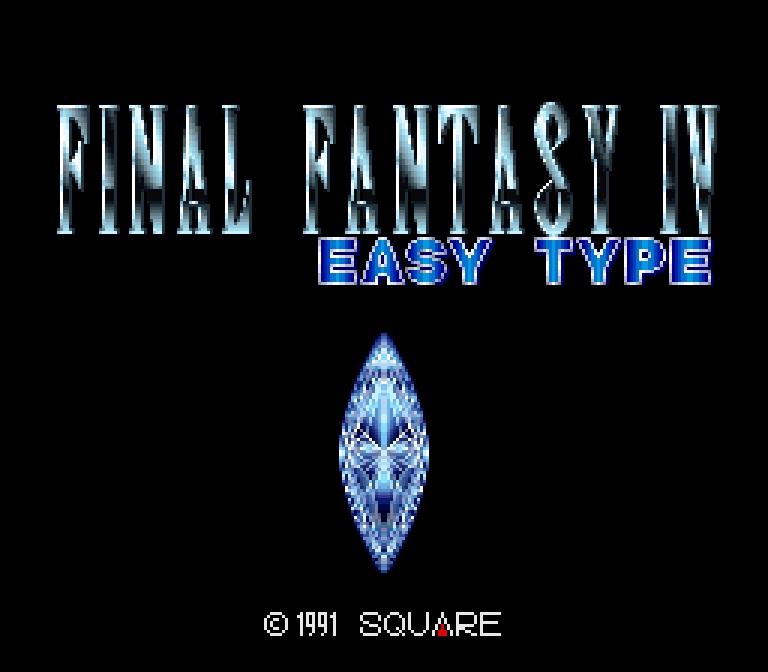 | 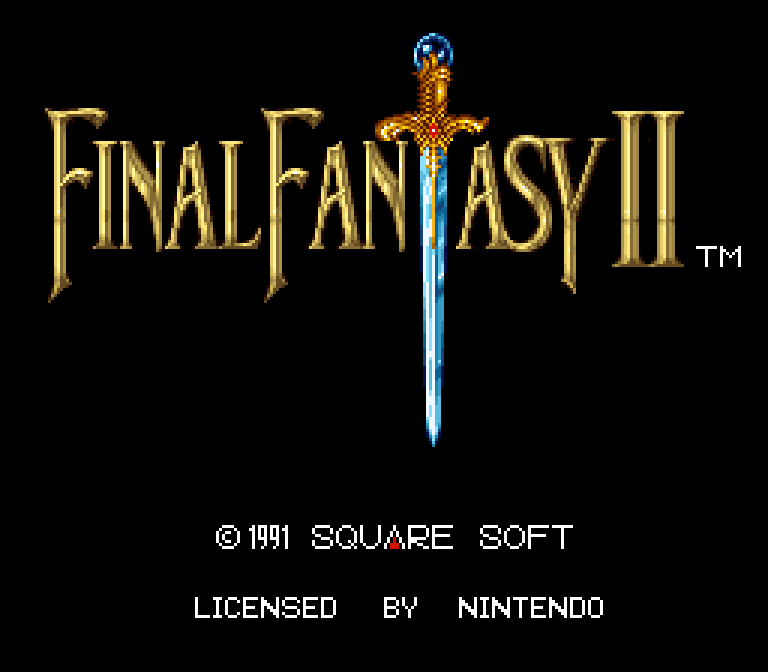 |
| Final Fantasy IV (Super Famicom) | Final Fantasy IV Easy Type (Super Famicom) | Final Fantasy II (Super NES) |
The Japanese title screens also have some fancier animations and fade-ins while the English title screen just has a basic fade-in and no animation at all. Here’s a video of them for reference:
The English version also has the bit of text about the licensing stuff, plus the company is called “Square Soft” rather than “Square”, as it’s called in the Japanese versions. There’s probably a good reason for this company name difference, but I’m guessing that’s an article for another day.
Incidentally, this probably doesn’t need mentioning, but it was called Final Fantasy IV in Japan but Final Fantasy II in North America because the real Final Fantasy II and Final Fantasy III weren’t released in North America at the time. Nowadays all the games have been released over here, so fans call them all by their official Japanese numbers.
Game Start
Because game localization was still in its infancy when Final Fantasy II was released, the translation is a bit dry, wonky, and strange in places. This is immediately evident as soon as the game’s intro begins.
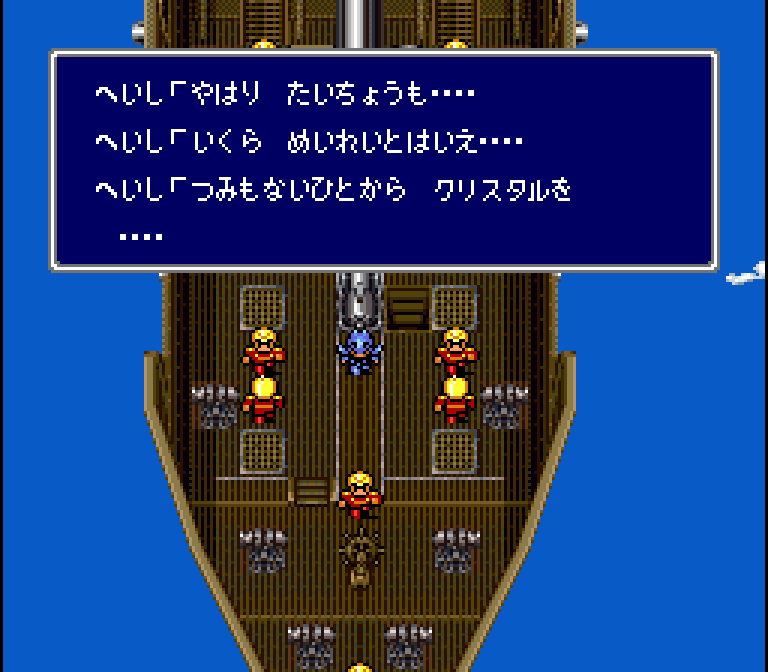 | 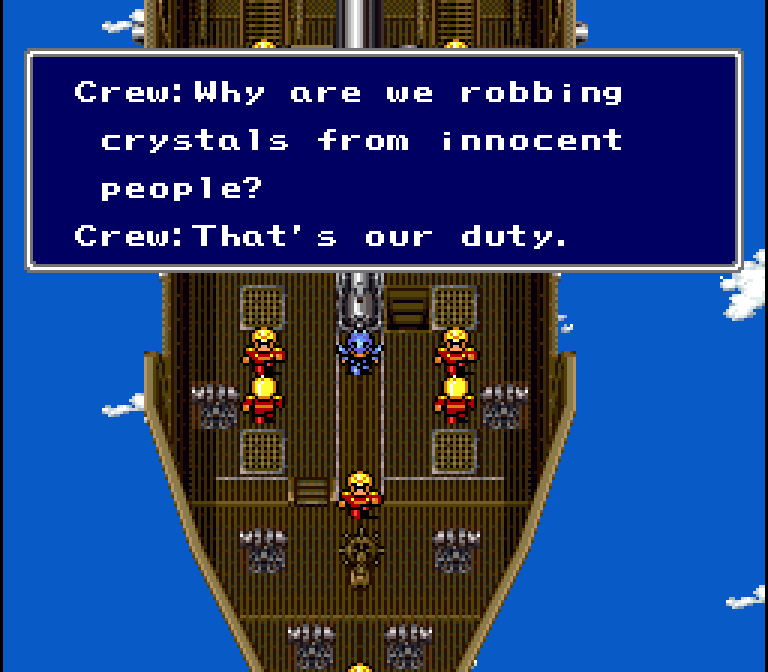 |
| Final Fantasy IV (Super Famicom) | Final Fantasy II (Super NES) |
Before the short flashback starts, the script unfolds like this:
| Japanese Version (basic translation) | English Translation |
| Soldier: Captain Cecil! We will arrive at Baron shortly! | Crew: Captain Cecil, we are about to arrive! |
| Cecil: Uh-huh… | Cecil: Good. |
| Soldier: I guess the captain feels the same way…? | Crew: Why are we robbing crystals from innocent people? |
| Soldier: Even if these ARE orders… | Crew: That’s our duty. |
| Soldier: Stealing a crystal from innocent people… | Crew: Do we really have to keep doing this? |
The differences are obvious, but the biggest thing is that the Japanese version makes it clear that Cecil isn’t happy with what’s just happened. The English translation seems to skip over it. The “uh-huh” in the Japanese line is more of a distant, preoccupied response. Throughout the game’s intro Cecil’s internal struggle is a lot more obvious in the Japanese text – it’s clear he’s too preoccupied to give any real answers.
While we’re at it, note how the Japanese text doesn’t use a colon to show who’s talking – instead, it uses a Japanese quotation mark, but doesn’t end lines with a closing quote mark. Also, whenever Cecil is speaking, it doesn’t show his name followed by a colon. Instead, it just uses a double Japanese quotation mark.
Another change I didn’t catch right away is that the text box was made a tiny bit larger in the English localization. This makes sense, because it usually takes more letters to say something in English than in Japanese.
Lastly, in Final Fantasy IV Easy Type, it says “the king’s orders” and not just “orders”.
From time to time we’ll also look at the translation of other versions of the game. Here’s a look at the PlayStation translation of this line:
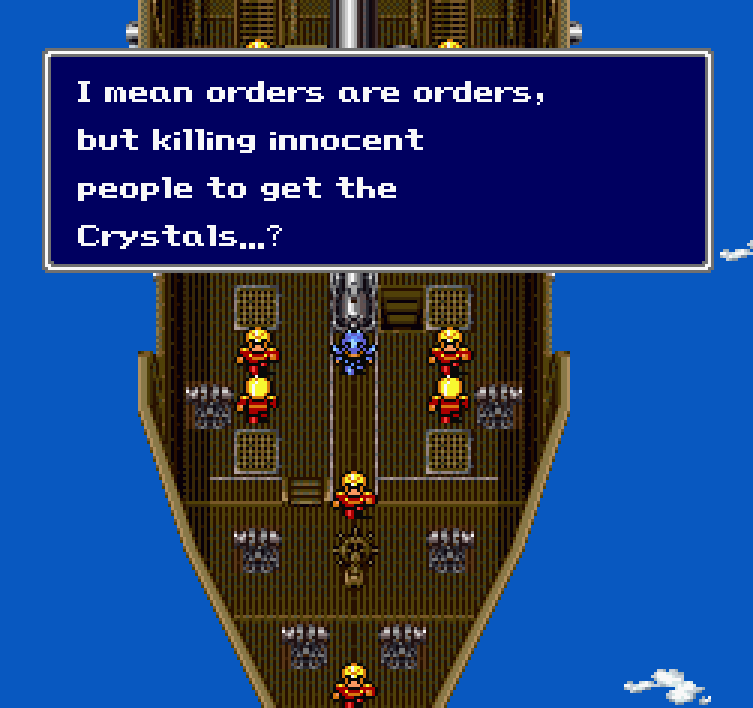
As we can see, there’s a reference to killing in the translation… Except the original text never mentioned killing to begin with. As we’ll see over the course of this gigantic analysis project, the PlayStation translation is less of a translation and more of a “screw faithfulness let’s do whatever we want” type of thing.
While we’re at it, I should mention that in general, the GBA translation is based on the PlayStation translation. It brings improvements to the translation but also introduces a lot of strange things like Internet in-jokes. Here, we can see how the GBA translation is a slightly-edited version of the PlayStation translation:
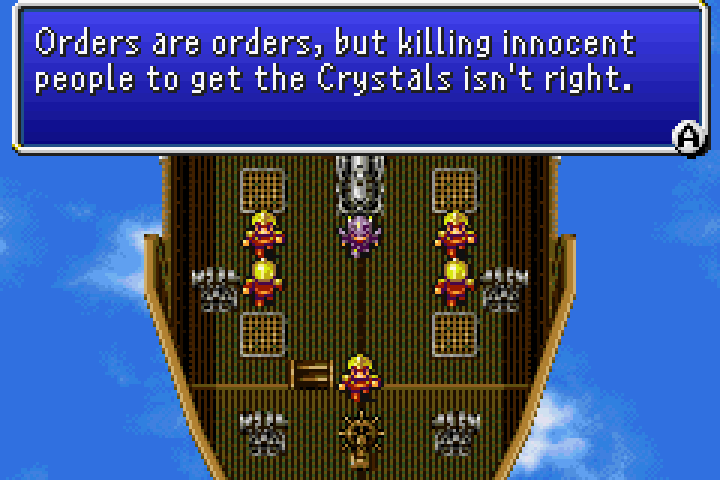
So, the GBA translation is based on the PlayStation translation. Guess what? The PSP translation is based on the GBA translation, with some tweaks of its own! Here’s a look at the PSP translation’s take on this line:
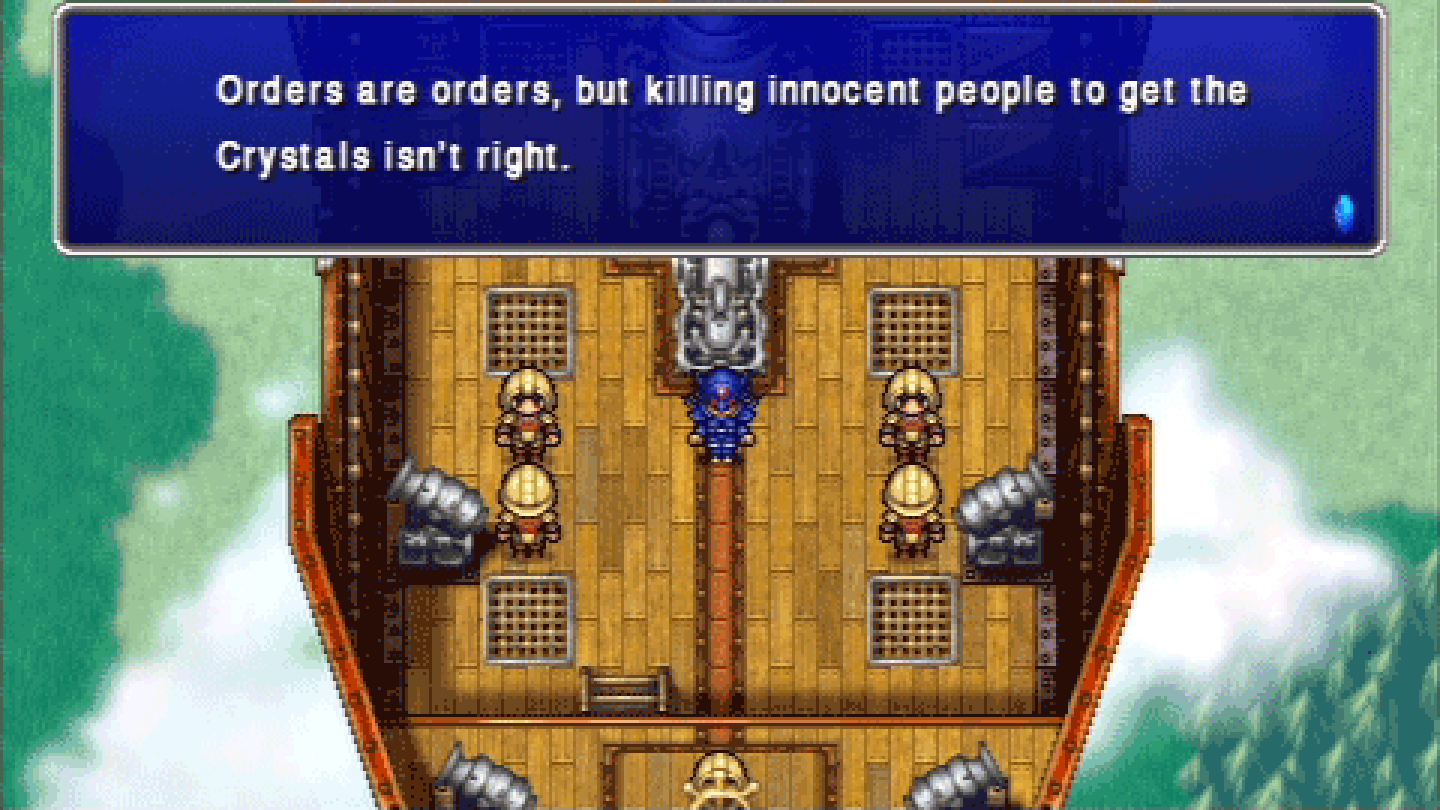
So there’s a sort of strange translation evolution going on, or a sort of translation legacy. I’m not fond of the PlayStation translation at all, so it’s kind of disappointing that they didn’t just scrap it altogether when working on the GBA translation, but oh well.
I’m fairly certain the DS translation was done from scratch. I don’t have time to play through it (or any way to get decent screenshots) but here’s a look at this same line in the DS version:
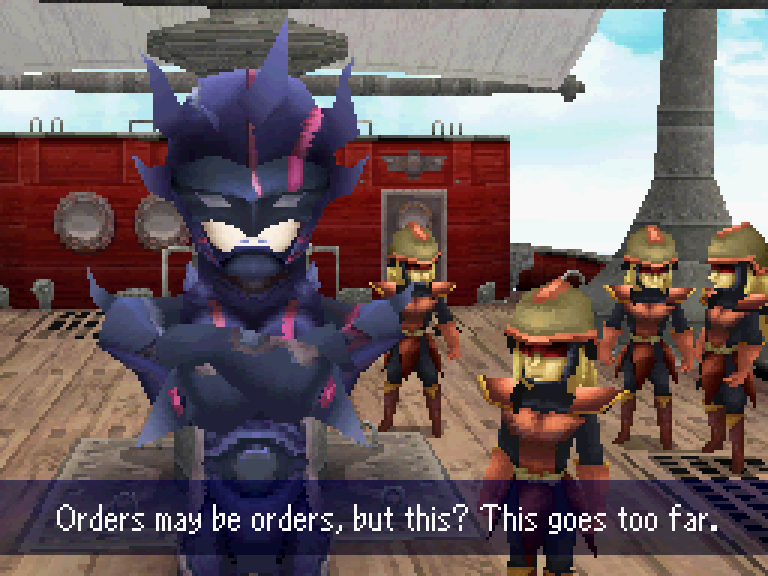
There’s also a port of the game for iOS devices like the iPhone and iPad. I definitely don’t intend to go through this version, but here’s a screenshot from the very start:
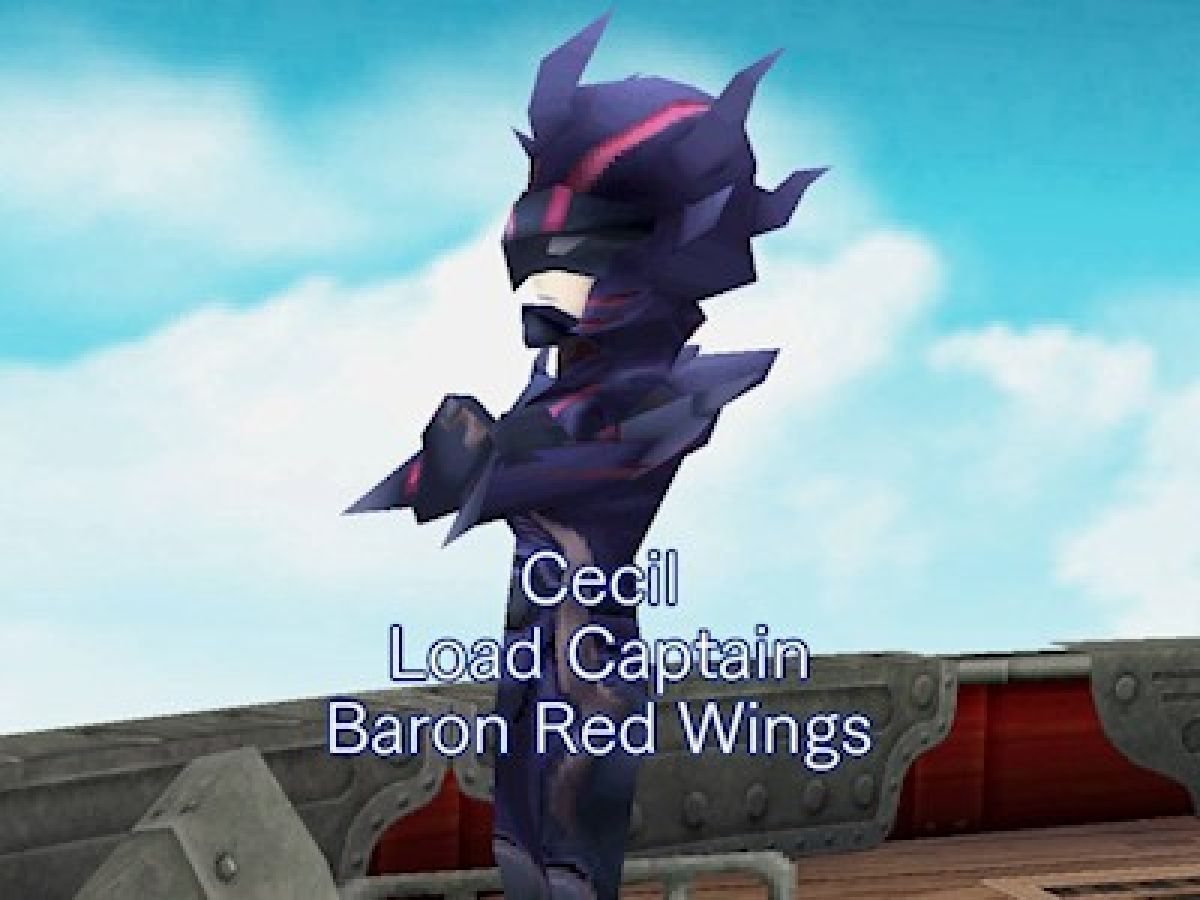
Already it’s off to a less-than-stellar start, but I’ll just assume this “Load Captain” is a one-time mistake in the iOS version, since the DS version goes with the more proper “Lord Captain”:

On closer inspection, it looks like the DS version of this text has a comma in it, so perhaps the Load Captain mistake was a result of someone transcribing all the text into a new file but making typos in the process?
Flashback Scene
The intro then switches to a flashback of when they invaded Mysidia and took the crystal there by force:
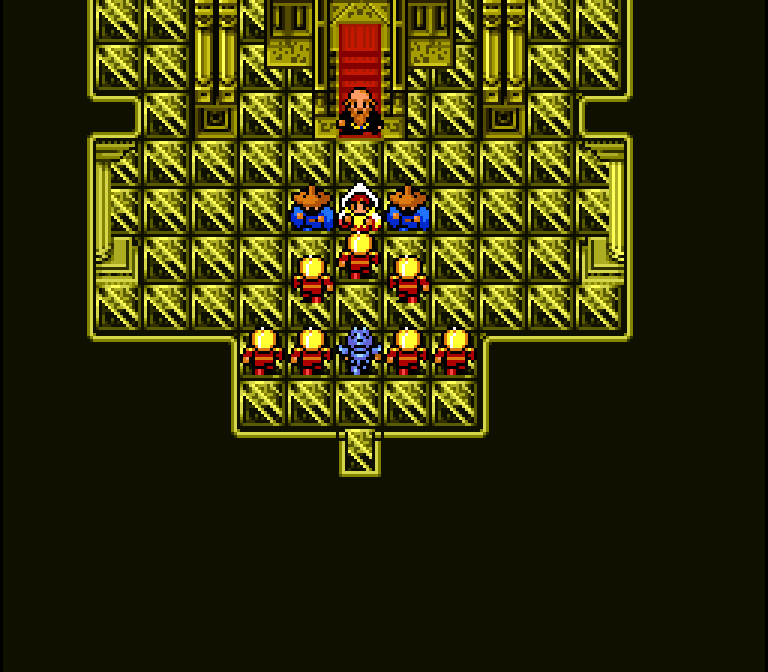 | 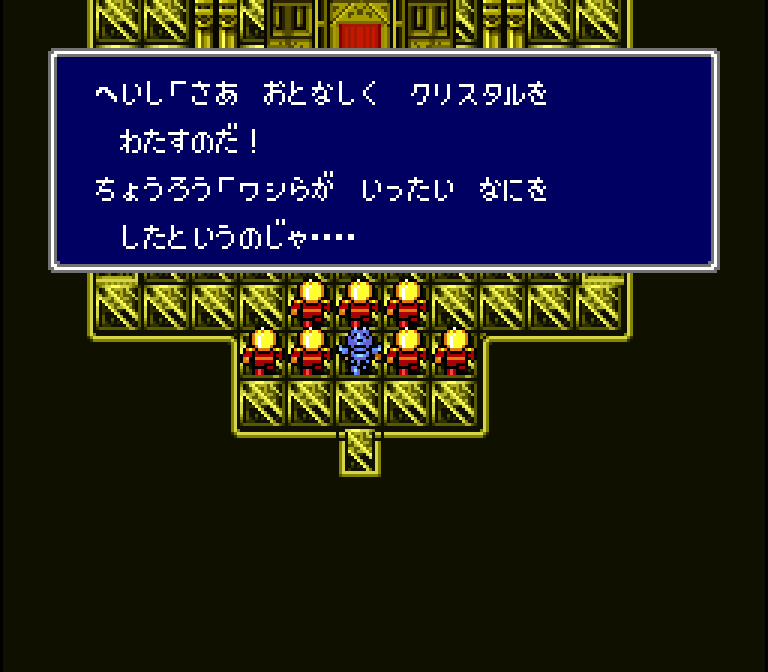 |  |
| Final Fantasy IV (Super Famicom) | Final Fantasy IV Easy Type (Super Famicom) | Final Fantasy II (Super NES) |
In Final Fantasy IV, there’s no text at all – the entire thing is just sprites moving and doing stuff. In Final Fantasy II, the Baron soldiers also shout and get rowdy while the Mysidians get killed and plead. Final Fantasy IV Easy Type has this dialogue as well.
My first thought was that maybe they added this text in for Final Fantasy II and then used that version to create the Easy Type version. The English text here is awkwardly phrased just like the rest of the translated text though, so I can’t tell if that’s the case or not. I don’t know which version came first.
Of particular note, though, is that the English version calls it the “Crystal of Water” while the Japanese text simply says “crystal”.
King’s Orders
The dialog after the flashback has some different nuances too:
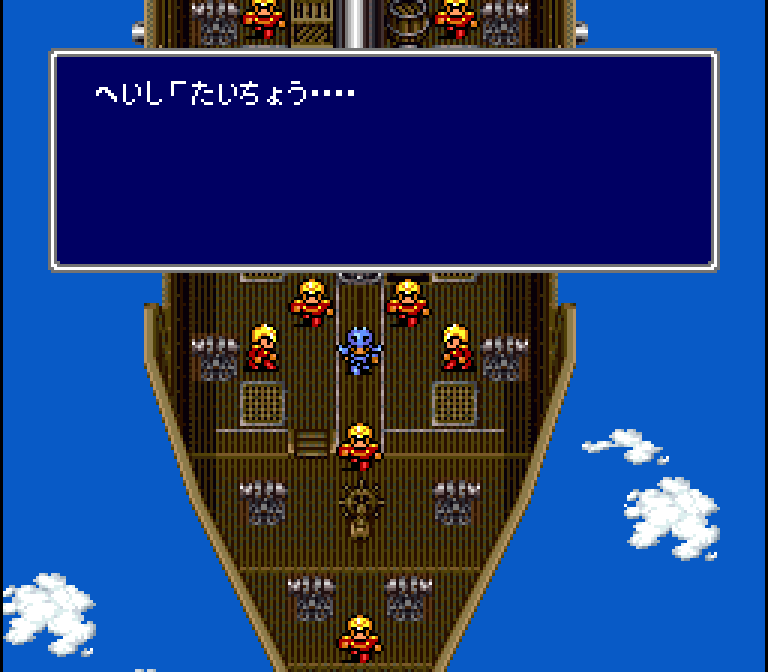 | 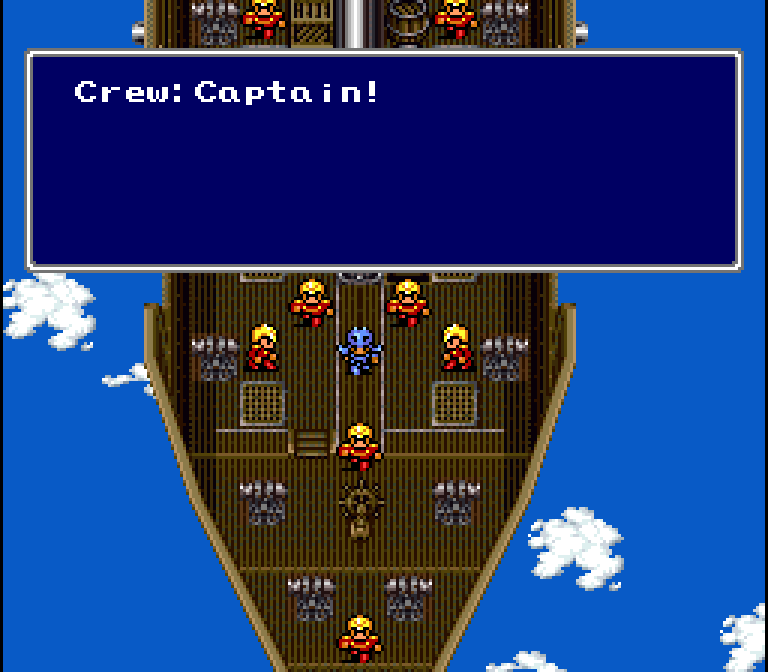 |
| Final Fantasy IV (Super Famicom) | Final Fantasy II (Super NES) |
| Japanese Version (basic translation) | English Translation |
| Soldier: We, the Red Wings, are a proud airship fleet! Stealing from the weak is unthinkable! | Crew: We take pride in being members of the Red Wings! Looting is out of the question! |
| Cecil: Stop it! | Cecil: Stop it! |
| Soldier: But, Captain! | Crew: Captain! |
| Soldier: We’re robbing from mages who don’t even resist! | Crew: We can’t stand doing this anymore! |
| Cecil: Listen, all of you! The crystal is absolutely necessary for the prosperity of our Baron Kingdom. | Cecil: Listen! Possessing the crystal is an essential factor for our prosperity. |
| His Majesty feels that the people of Mysidia know too much about the crystal’s secrets. | Moreover, His Majesty judged that Mysidians know too much about the secret of the crystal. |
| We are the airship fleet of the Baron Kingdom – the Red Wings of Baron! His Majesty’s orders are absolute… | We are the Red Wings, the air force of the Kingdom Baron! The Royal Command is absolute. |
| Soldier: Captain… | Crew: Captain! |
| Soldier: Captain! Monsters! | Crew: Monsters!! |
My literal translation is pretty rough sounding, but here we can see some tiny changes in meaning and nuance.
Japanese Version Differences
There’s actually a slight difference between the two Japanese versions here too:
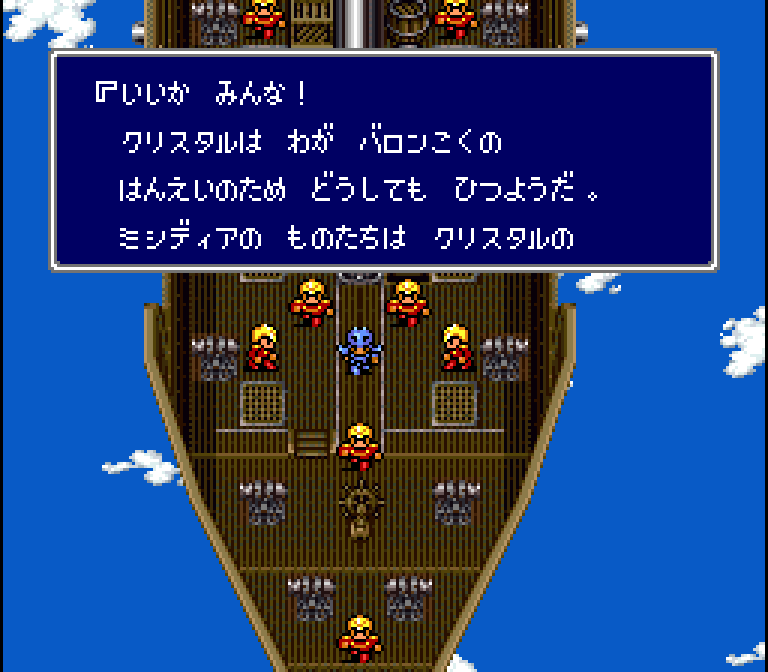 |  |
| Final Fantasy IV (Super Famicom) | Final Fantasy IV Easy Type (Super Famicom) |
| Final Fantasy IV (basic translation) | Final Fantasy IV Easy Type (basic translation) |
| Cecil: Listen, all of you! The crystal is absolutely necessary for the prosperity of our Baron Kingdom. | Cecil: Listen, all of you! The crystal is absolutely necessary for our Baron Kingdom. |
| His Majesty feels that the people of Mysidia know too much about the crystal’s secrets. | His Majesty feels that the mages of Mysidia know too much about the crystal’s secrets. |
| We are the airship fleet of the Baron Kingdom – the Red Wings of Baron! | We are the airship force of the Baron Kingdom – the Red Wings of Baron! |
| His Majesty’s orders are absolute… | His Majesty’s orders are absolute… |
There are actually lots of little changes like this in the Japanese text throughout the game. I don’t think I have the energy to document them all, but I’ll point out any that seem interesting.
Part of the reason for these changes was to simplify the text for Japanese readers, presumably so that younger players could understand things more clearly. More on that later.
Fire Bomb / Red Fang
Cecil uses a special item to kill some monsters. In Japanese, this is called “Red Fang” but in English it’s called “FireBomb”:
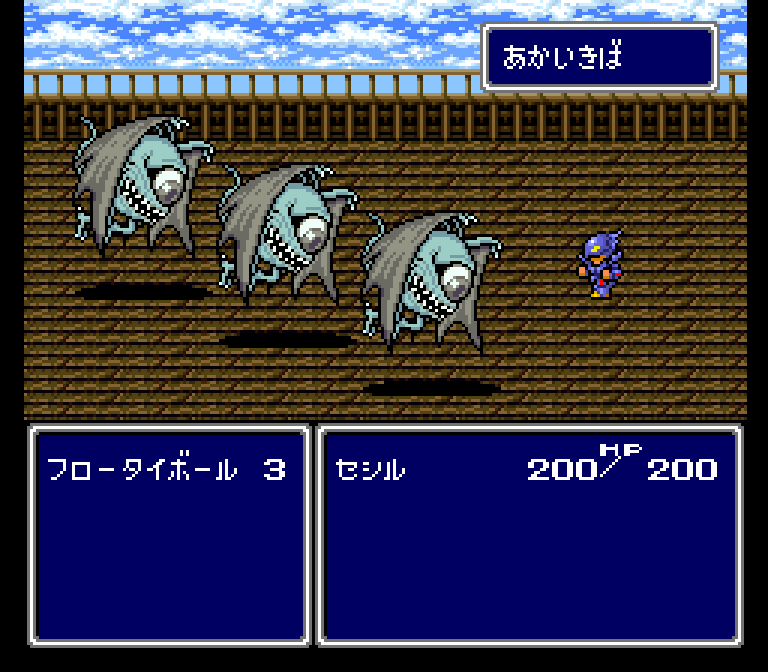 | 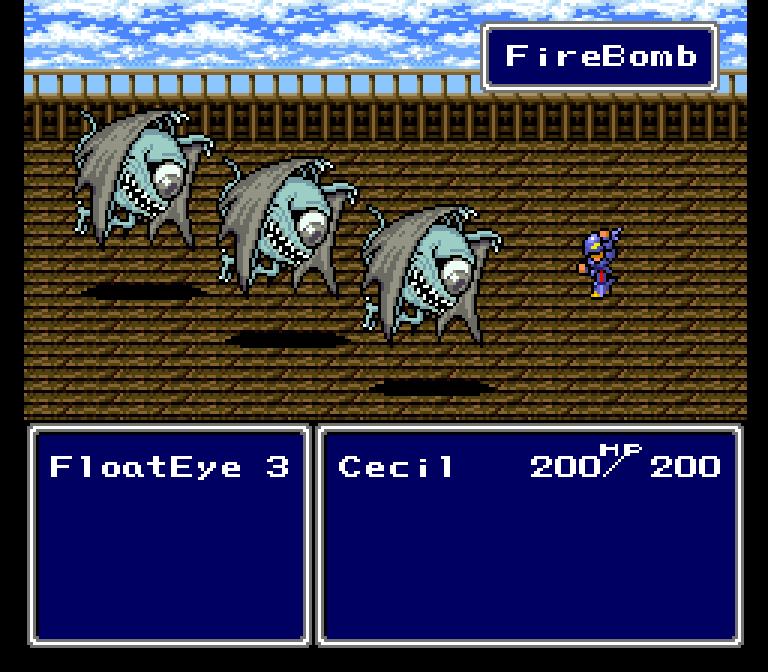 |
| Final Fantasy IV (Super Famicom) | Final Fantasy II (Super NES) |
Incidentally, the enemies are called “FloatEyes” in English but are called “FloatEyeballs” in Japanese. Actually, the Japanese katakana spelling is a bit unusual for something like this, but it’s hard to explain unless you already know Japanese.
Harsh Language
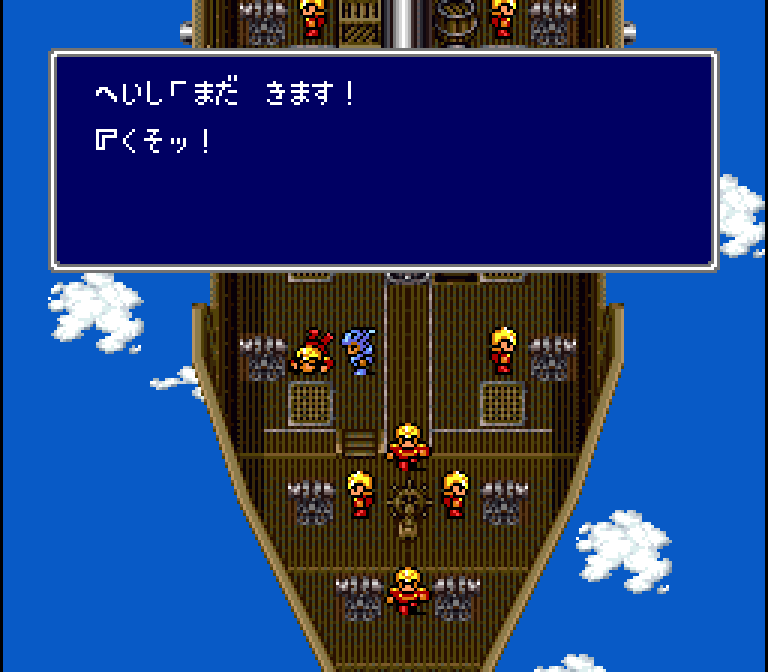 | 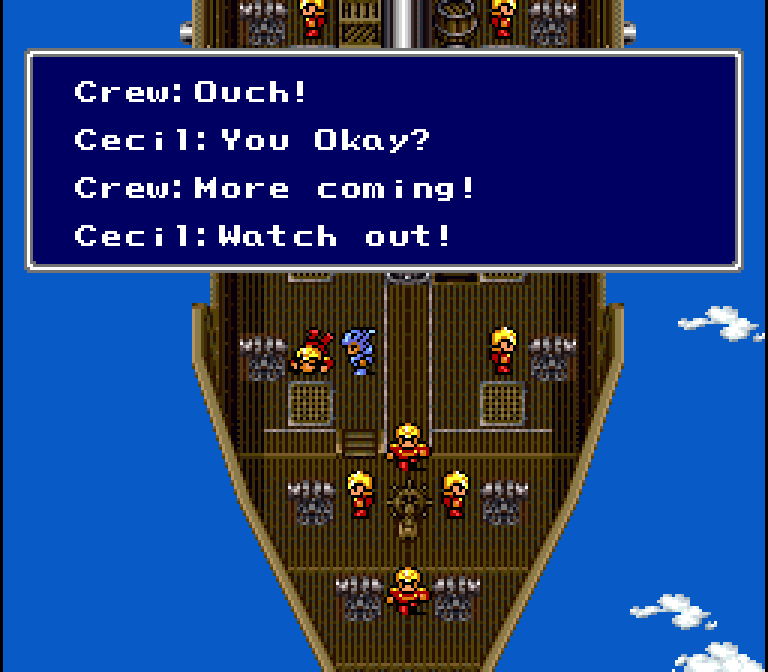 |
| Final Fantasy IV (Super Famicom) | Final Fantasy II (Super NES) |
Some more monsters attack, and in Japanese Cecil responds by saying something like, “Damn!”
In English, he says, “Watch out!”
In the PlayStation translation, the swearing is left intact:

My general impression is that the swearing in the PlayStation is used when appropriate, or at least it’s nowhere nearly as crazy as the J2e fan translation is with it. The PlayStation translation has many faults, but swearing seems to have been handled competently.
The GBA translation handles this line by saying “Damnation!” which is an interesting way to approach the swear word issue:
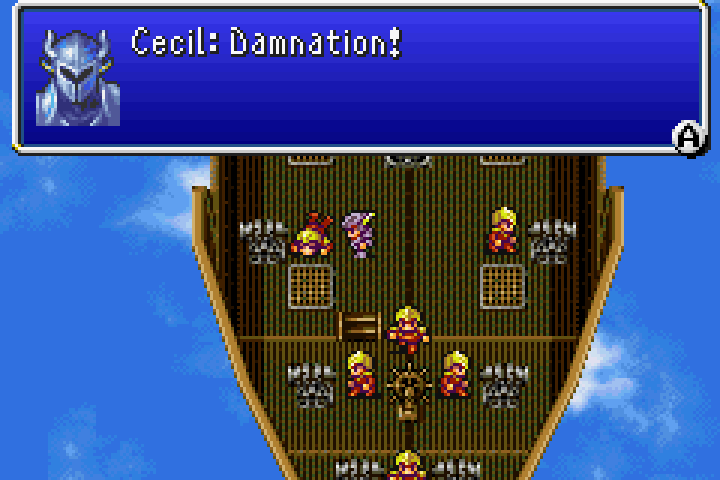
And because the PSP translation is based heavily on the GBA translation (which is in turn heavily based on the PlayStation version), the PSP version says “Damnation” as well:
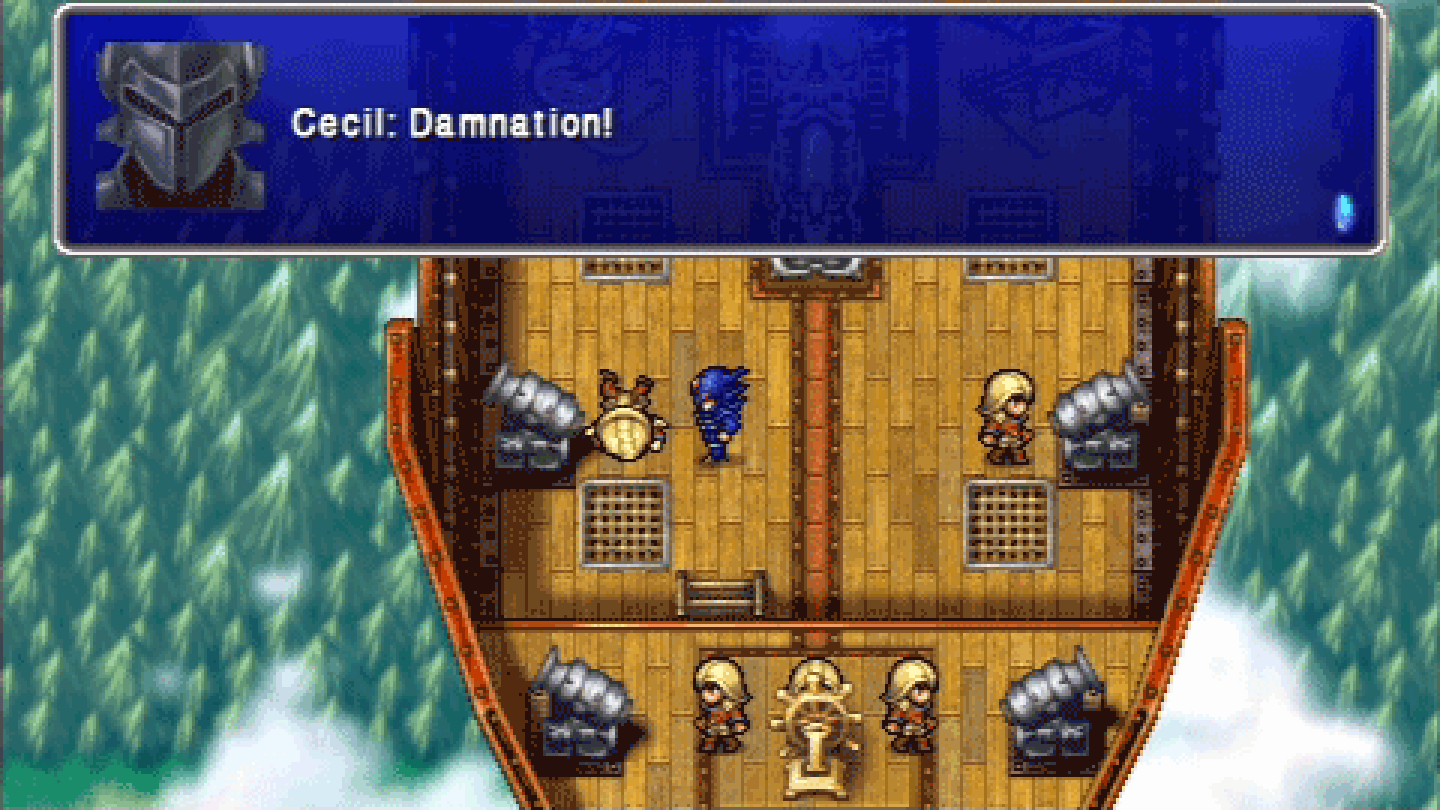
Lit-Bolt / Blue Fang
 | 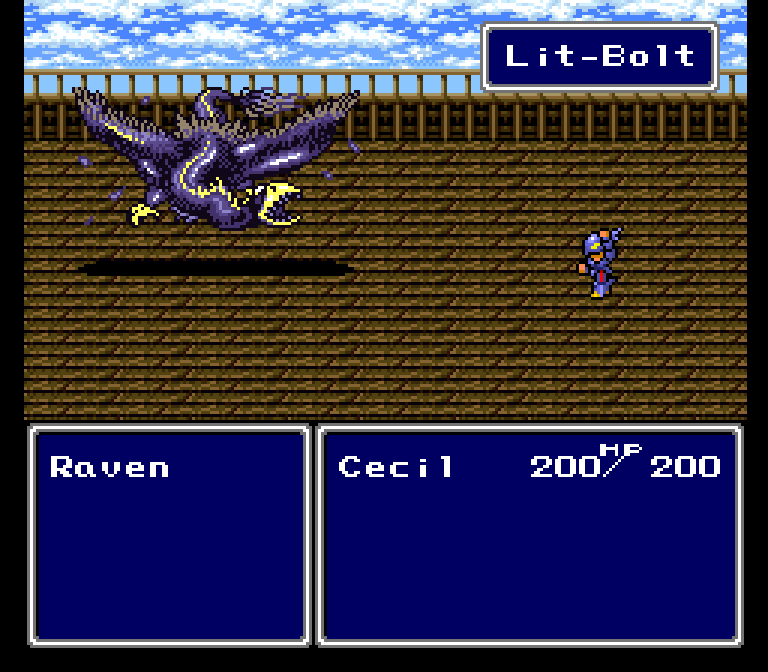 |
| Final Fantasy IV (Super Famicom) | Final Fantasy II (Super NES) |
Cecil then fights another enemy and uses a different item to kill it. In Japanese, this item is called a “Blue Fang”. In English, it’s called a “Lit-Bolt”.
Zuu / Raven
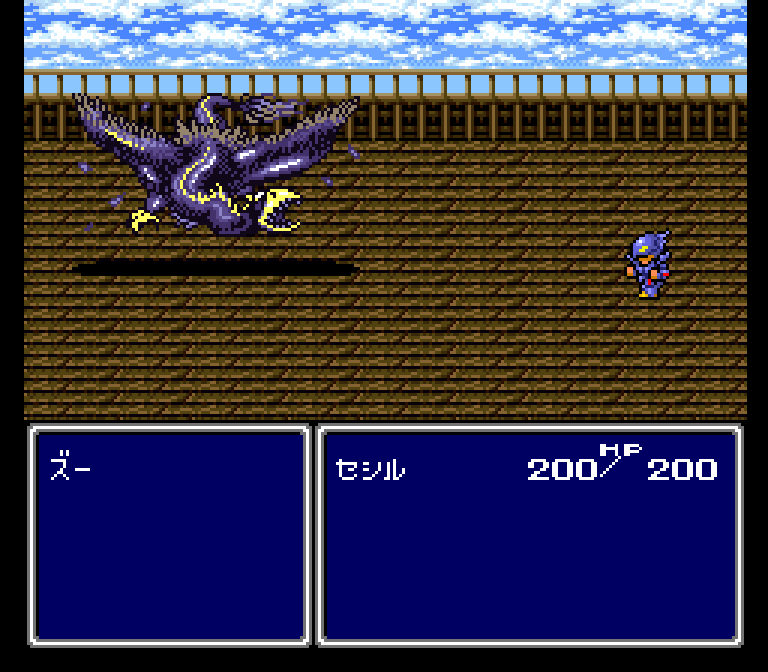 |  | 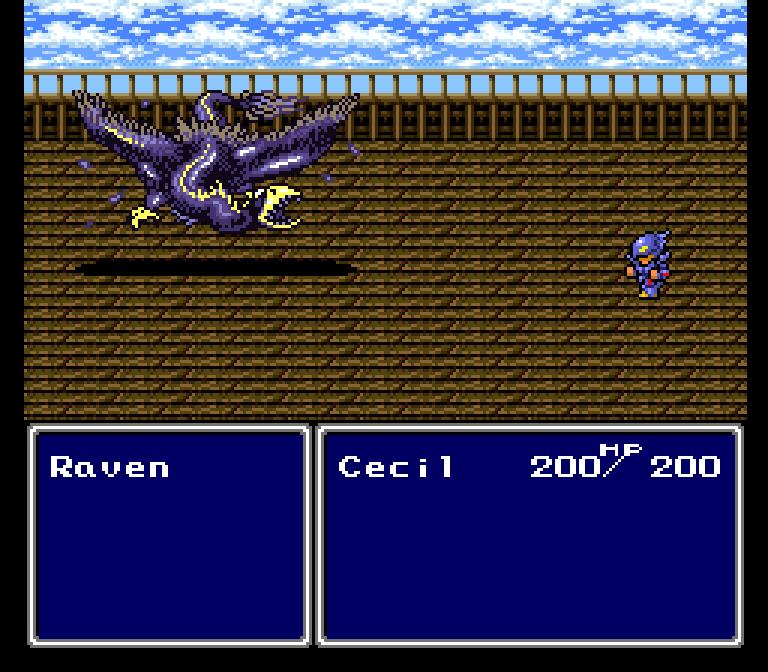 |
| Final Fantasy IV (Super Famicom) | Final Fantasy IV Easy Type (Super Famicom) | Final Fantasy II (Super NES) |
The giant bird enemy Cecil kills is called a “Zuu” in Final Fantasy IV and a “Raven” in Final Fantasy II.
It has a different name in Easy Type too: “Hell Condor”.
Stilted Writing
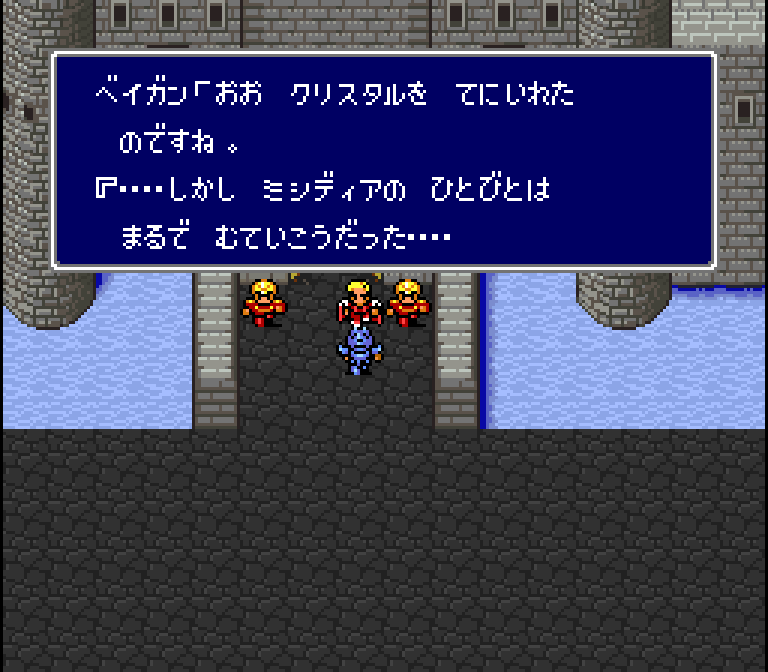 | 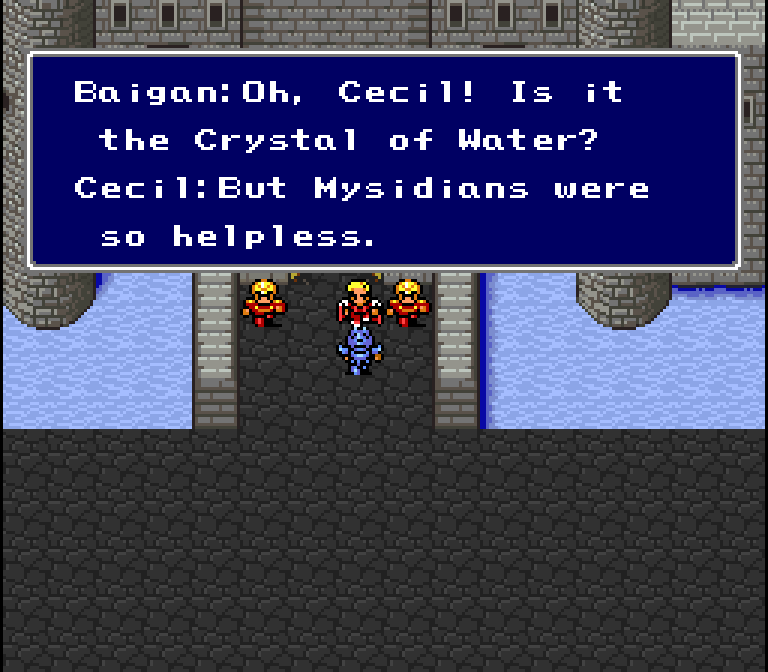 |
| Final Fantasy IV (Super Famicom) | Final Fantasy II (Super NES) |
Again, since this was before game localizations really got serious, the translated text in Final Fantasy II is full of weird awkwardness. You can almost tell it wasn’t written by a native speaker. Despite the weird-sounding text everywhere, I absolutely loved this game. And being a kid, I probably didn’t care that the game had weird writing. I think it goes to show that the content of the text far outshone the presentation.
Anyway, that aside, here we see that the English line again says “Crystal of Water” while the Japanese text just says “crystal”. This continues to happen a few more times in this intro. Someone must’ve been like, “All right, guys! Make sure to change every instance of ‘crystal’ to ‘Crystal of Water’! Just do it!”
Baigan Talks
When Baigan talks to the king about Cecil, the text is a bit different in all three games. Note that his name is spelled more like “Beigan” in the Japanese version:
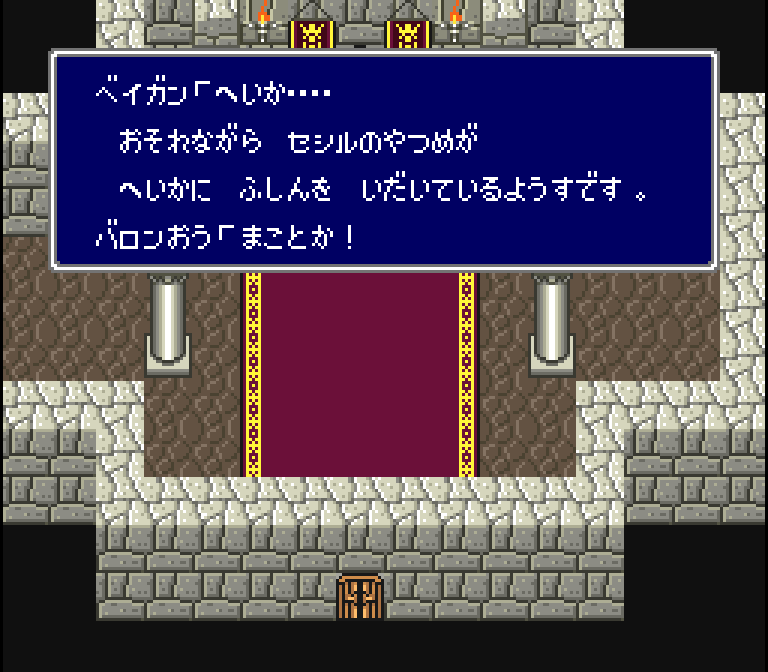 | 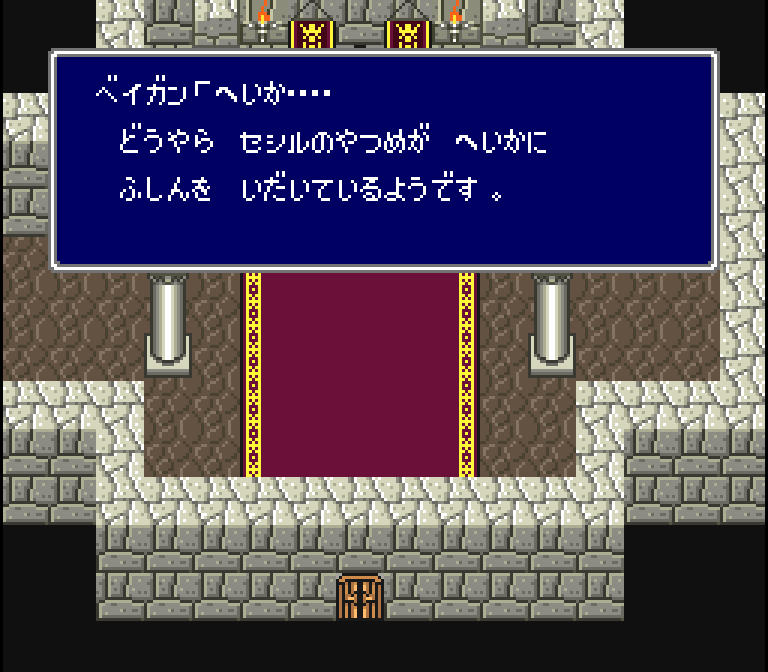 |  |
| Final Fantasy IV (Super Famicom) | Final Fantasy IV Easy Type (Super Famicom) | Final Fantasy II (Super NES) |
| Final Fantasy IV (basic translation) | Final Fantasy IV Easy Type (basic translation) | Final Fantasy II (Super NES) |
| Beigan: Your Majesty… Unfortunately, Cecil appears to harbor suspicions about you. | Beigan: Your Majesty… It would seem Cecil harbors suspicions about you. | Baigan: Your Majesty! I’m afraid Cecil has developed quite a rebellious air. |
| King of Baron: Truly?! As the head of the Royal Guard, you are as astute as I had hoped. You did well in informing me! | King of Baron: Truly?! As the head of the Royal Guard, you are as astute as I had hoped. You did well in informing me! | King: Truly!? Well done, Baigan! |
| However, obtaining the crystal is all that matters. Bring Cecil here. | However, obtaining the crystal is all that matters. Bring Cecil here. | We must do something. Call him in! |
The big thing is that in Japanese Cecil simply “appears to harbor suspicions”, while in the English translation he’s now “developed quite a rebellious air”. In a way they could be seen as the same thing, but given the speech Cecil gave just moments ago aboard the airship, he’s definitely not “rebellious”.
We also learn from the Japanese line that Baigan is the head of the Royal Guard. That particular line uses a Japanese phrase that’s really hard to translate straight into English, so that’s probably why it was changed in translation.
Lastly, we see that the king’s mention of “having the crystal is all that matters” is gone and has been replaced with “We must do something (about Cecil).”
Crystal Detail
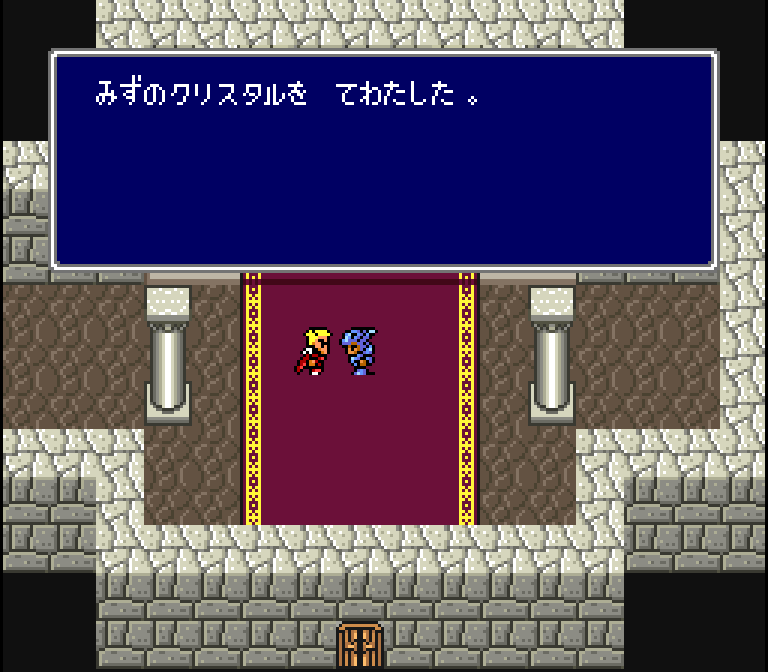 | 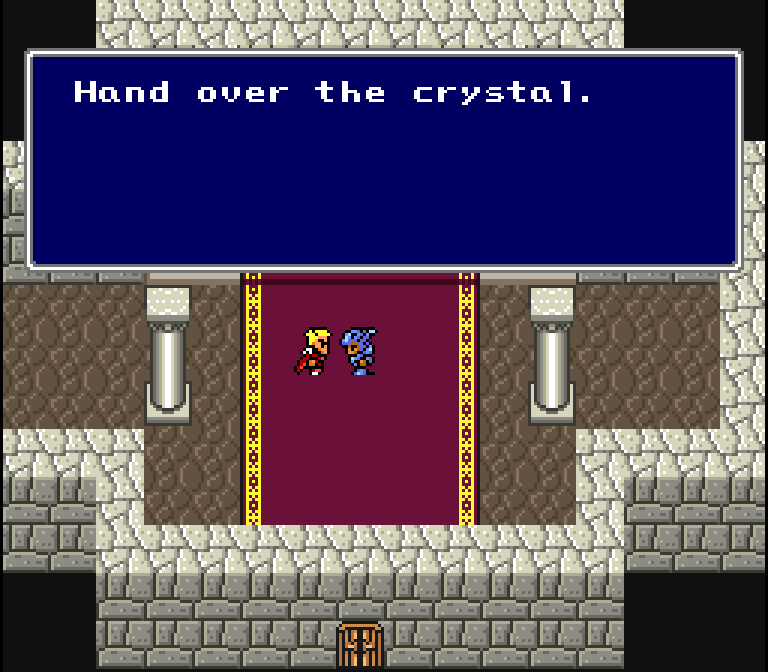 |
| Final Fantasy IV (Super Famicom) | Final Fantasy II (Super NES) |
When Cecil gives the crystal to Baigan, the English text says “Hand over the crystal.”
For years I never knew if this was Baigan talking, the game giving instructions, or if it was just poor English. It turns out the Japanese text says, “Handed over the Crystal of Water.”
It’s funny how now the Japanese text calls it the “Crystal of Water” while the English text just calls it “crystal”.
King Reaction
Baigan and the King talk while they look at the crystal:
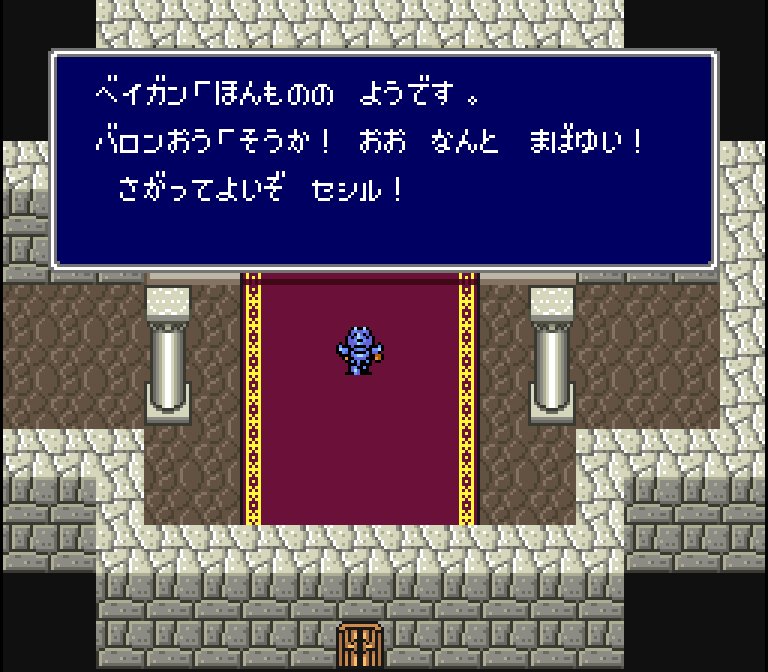 | 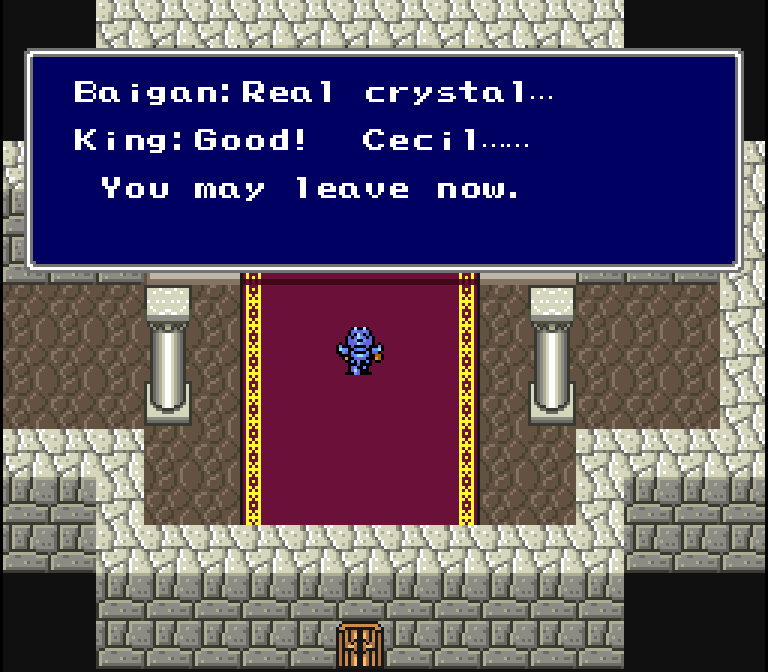 |
| Final Fantasy IV (Super Famicom) | Final Fantasy II (Super NES) |
| Japanese Version (basic translation) | English Translation |
| Beigan: It appears to be genuine. | Baigan: Real crystal… |
| King of Baron: I see! Oh, how dazzling it is! You may leave now, Cecil! | King: Good! Cecil… You may leave now. |
Baigan sounds like he’s slobbering out of awe in the English translation, but he’s speaking in a nice, formal, professional way in Japanese.
The king’s mention of it being “dazzling” is missing from the English translation too. The “I see!” phrase can often be translated as “Good!” so that’s not an issue here, though.
PlayStation Translation Style
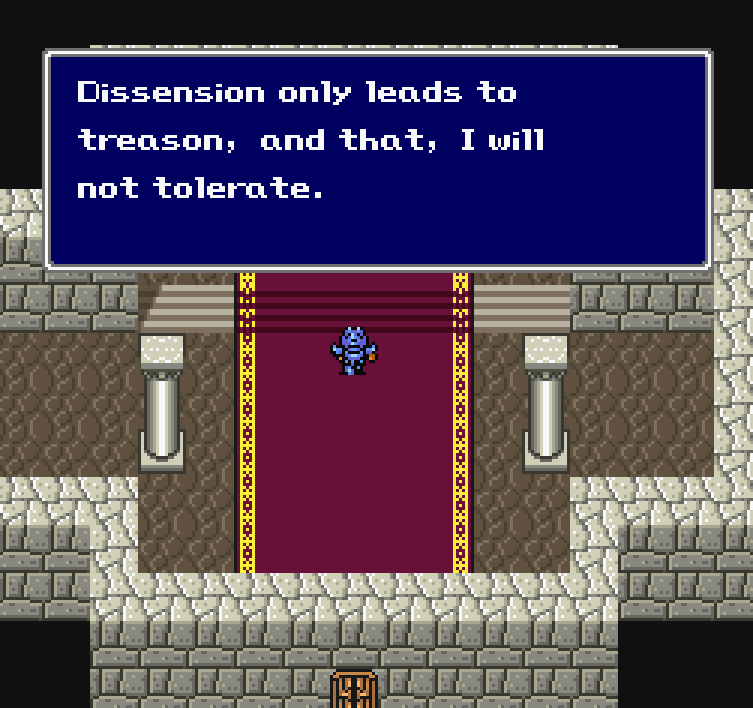
One thing that sets the PlayStation translation apart from other official translations is that it often makes up new lines that were never in the original text to begin with.
One example is during this scene with the king. In it, the king says, “Dissension only leads to treason, and that, I will not tolerate.”
This, of course, wasn’t in the original script. Instances of these made-up lines absolutely abound in the PlayStation translation. Since this project is primarily to compare the Super Famicom and Super NES versions, I won’t point out all these all-new PlayStation lines, but I’ll show some of the more interesting ones as they occur.
My personal opinion is that the text in the PlayStation translation often feels like something an inexperienced-but-thinks-they’re-experienced fanfic writer might produce.
As an example, sometimes the text tries to sound like old English with lines like, “You insolent cur! How dare you barge in here!?”
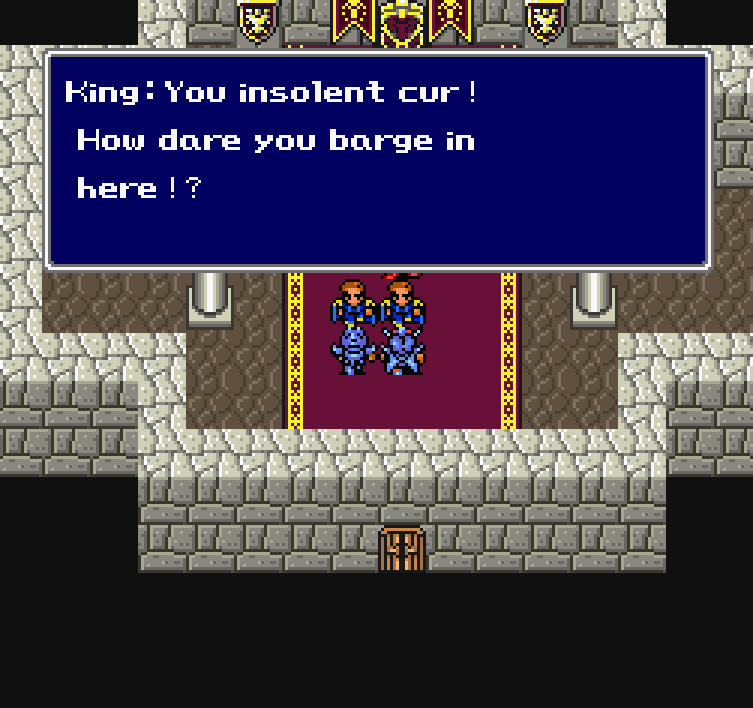
And, in the middle of everyone talking like this, sometimes you’ll suddenly get complete style changes, like this scene where Cecil and Kain, who are super-high ranking knights, talk like college bros or something:
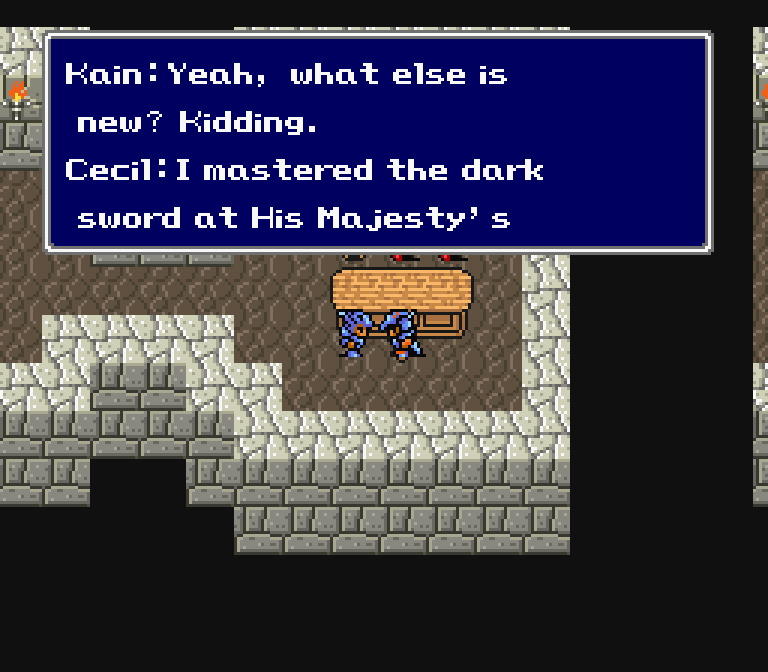 |  |
| Playstation translation | |
Of course, this sometimes means that the GBA and PSP versions have these made-up lines too, but sometimes they’ve been toned down or fixed. Cecil and Kain only talk this way in the PlayStation version, for example.
Summoned Monsters
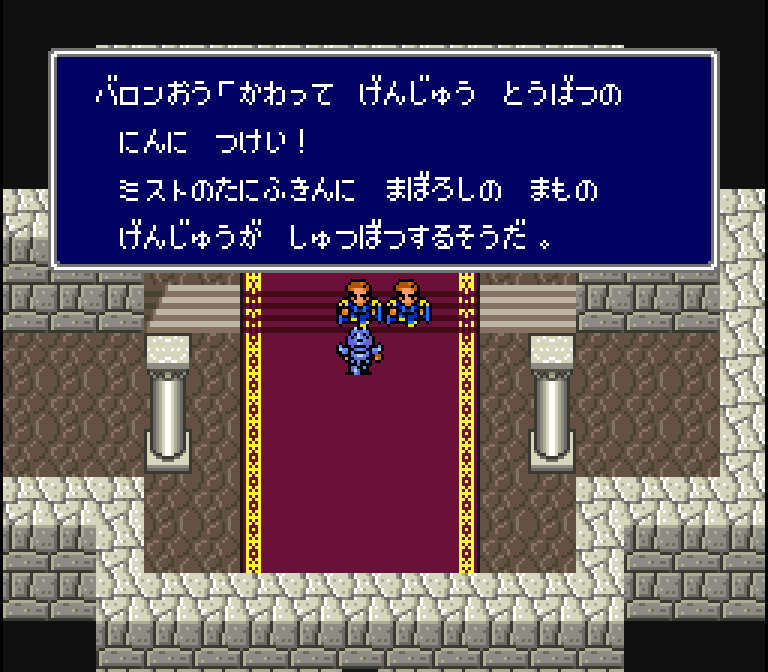 | 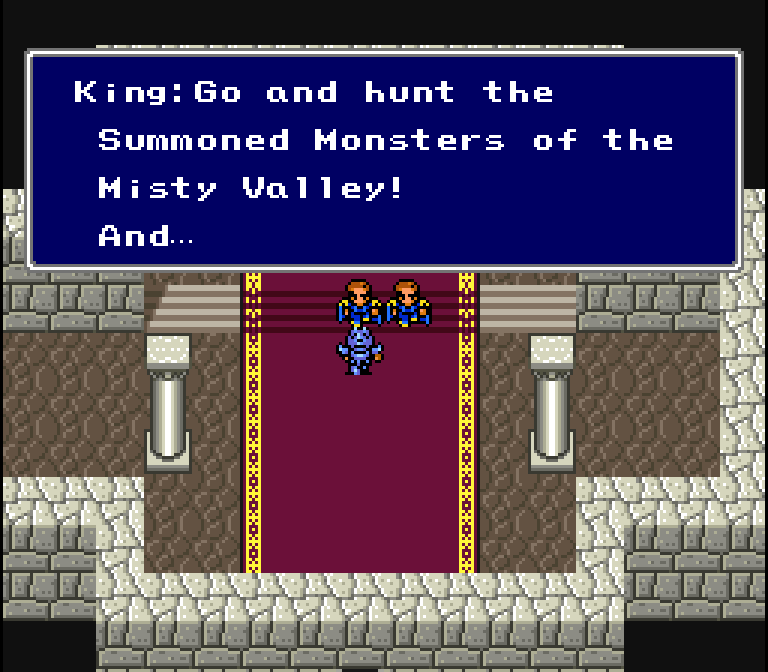 |
| Final Fantasy IV (Super Famicom) | Final Fantasy II (Super NES) |
Powerful monsters that can be summoned are a staple of the Final Fantasy series.
In the Japanese games, these all go by the name 幻獣 (genjū), which is a made-up term that combines the kanji characters 幻 ("illusion / phantom") and 獣 ("beast / big monster / big creature").
Since this is a mostly made-up term, it wound up getting translated differently throughout most of the English-language Final Fantasy localizations:
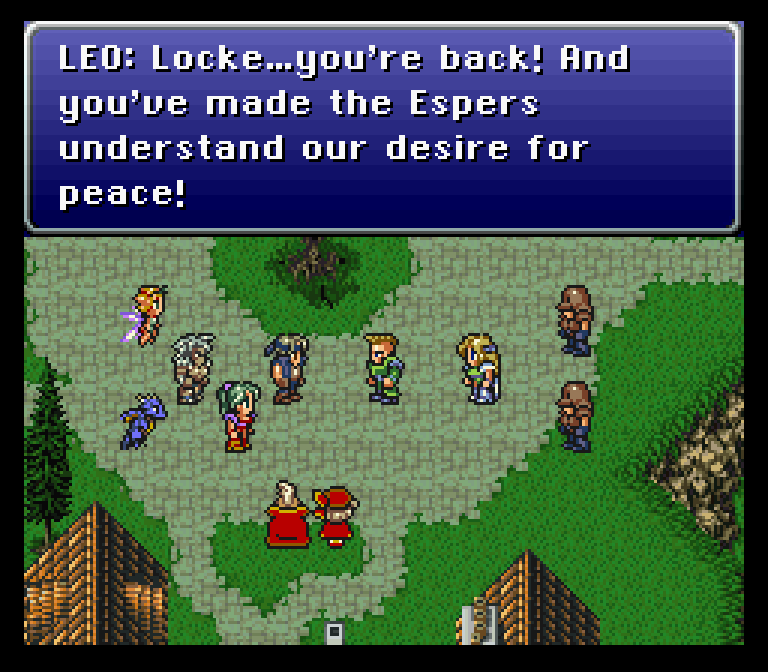
Final Fantasy III for the Super NES called these magical beings “Espers”, Final Fantasy VII called them “Summons”, and later games call them Eidolons.
In Final Fantasy II, though, we see that they’re called “Summoned Monsters”.
Package / Bomb Ring
 | 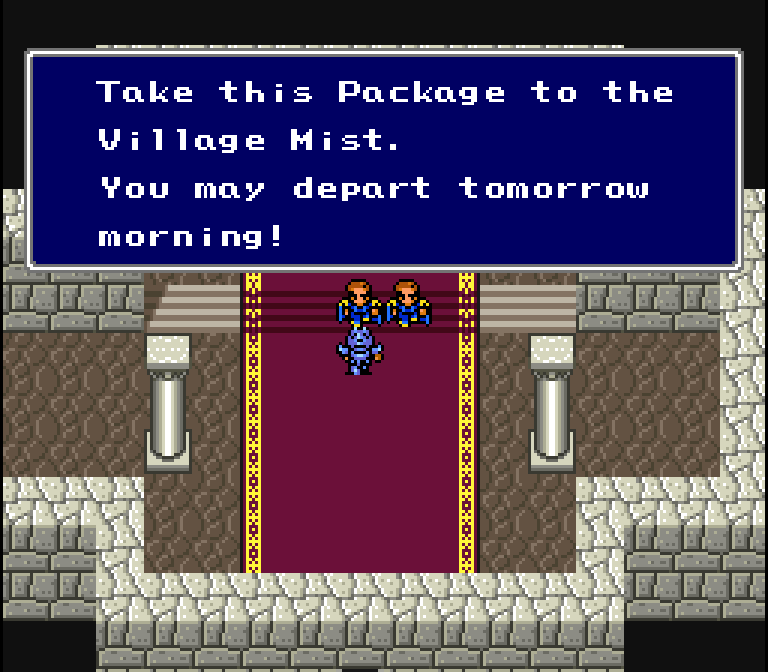 |
| Final Fantasy IV (Super Famicom) | Final Fantasy II (Super NES) |
In Final Fantasy II, the king gives Cecil an item called a “Package” that he needs to deliver to the village of Mist.
In the Japanese version, this item is called the “Bomb Ring”.
Later, when you do arrive at Mist, the item activates and destroys the village.
The Japanese item name makes it pretty obvious that this is probably a dangerous item. The English translation makes it less obvious and possibly makes the end result more shocking.
Kain’s Tutorial
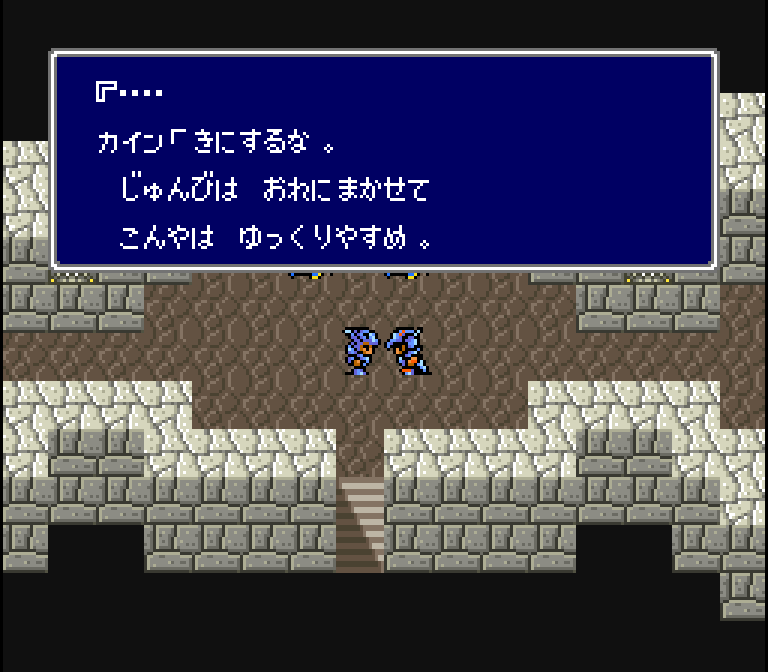 |  | 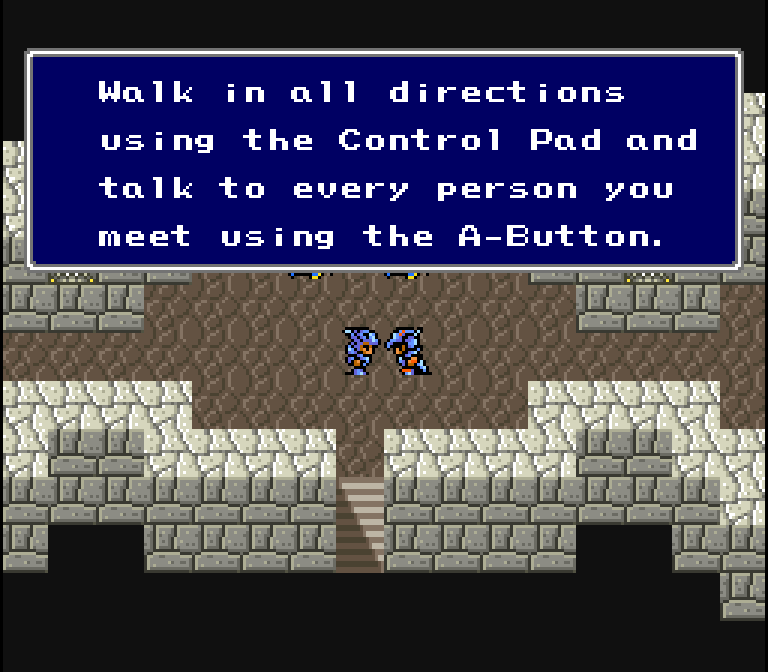 |
| Final Fantasy IV (Super Famicom) | Final Fantasy IV Easy Type (Super Famicom) | Final Fantasy II (Super NES) |
At this point in Final Fantasy IV, Kain says some simple stuff then walks away.
In the English version and Final Fantasy IV Easy Type, he says his stuff and then breaks the fourth wall by explaining how to move around and talk to people. This was added in to make it easier for inexperienced players to get a grasp of the gameplay mechanics.
Treasuring Guard
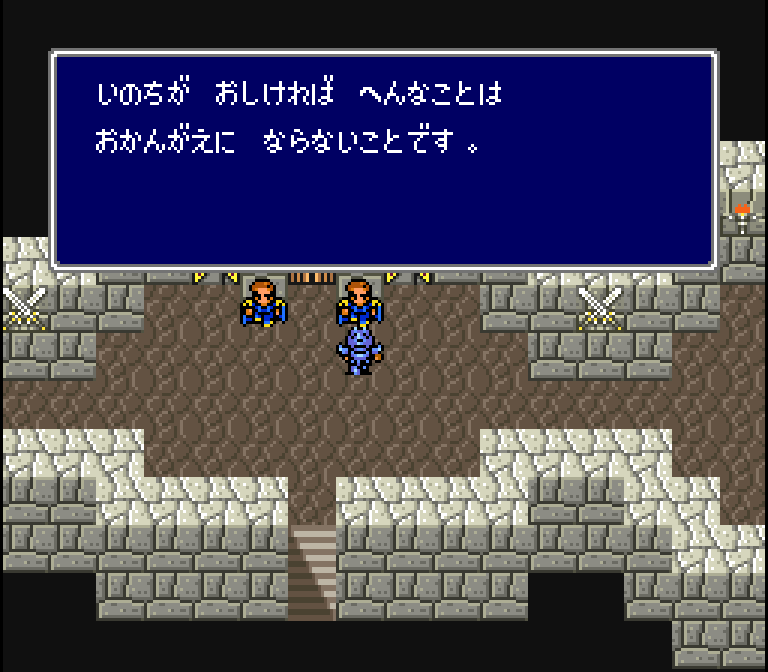 | 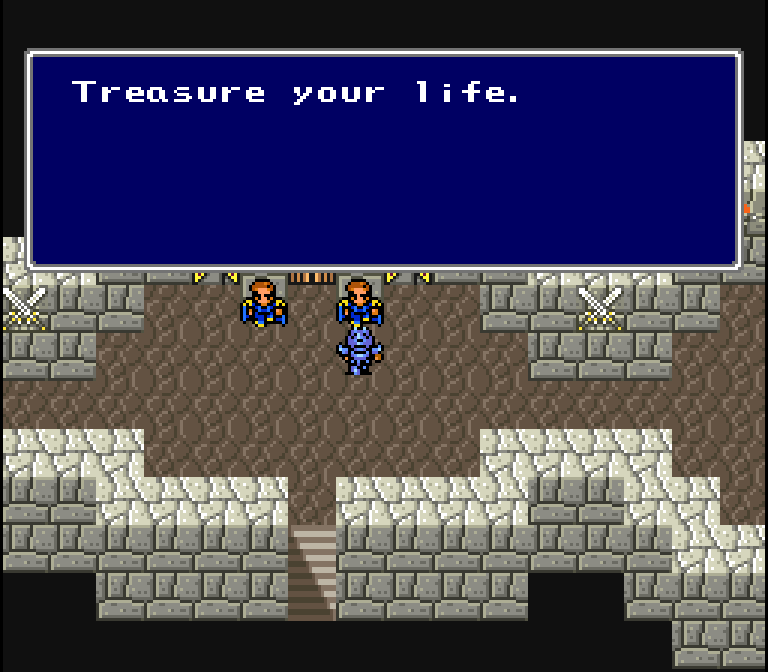 |
| Final Fantasy IV (Super Famicom) | Final Fantasy II (Super NES) |
In Final Fantasy II, this guard simply says, “Treasure your life.”
In the Japanese version, he actually says, “If you value your life, then I suggest you not try anything funny.”
Text Formatting
Incidentally, the PlayStation translation actually has a variable width font, which usually allows for more text per line and makes things more professional. Except in the case of this game, the localization team never took advantage of this extra space, which results in really awkward-looking text formatting.
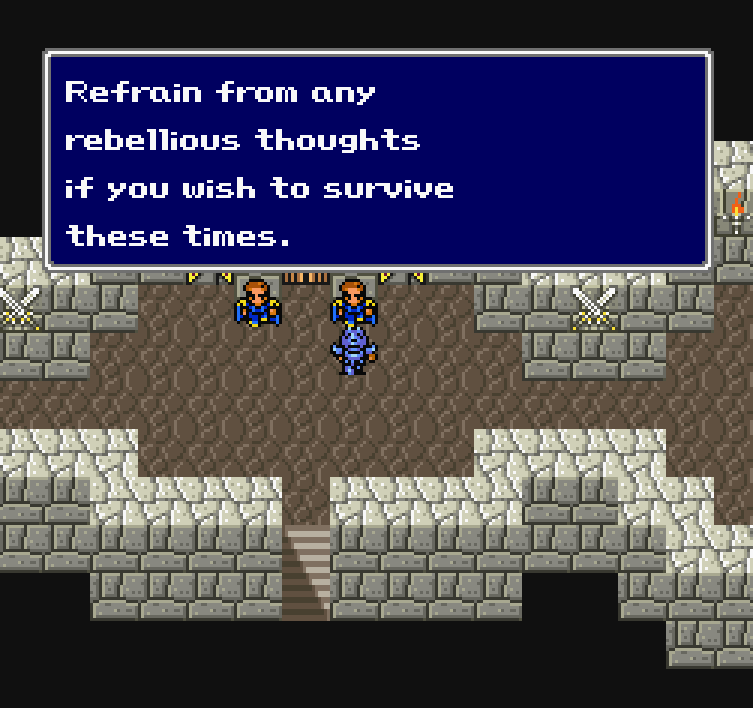
In fact, sometimes long words in the script are broken up at the end of a line and given a hyphen when it’s completely unnecessary. Very poor presentation.
The thing is though, this sort of thing happened to me on one of my own professional projects. I was working on a One Piece game for the Wii and the docs said I could only have like 22 characters per line or something. It was a pain having to count out letters on each line, but I did it.
Months later, the game comes out, and it turns out the localization programmers had decided to implement a variable width font! Except the font was really tiny and the lines were never reformatted, which meant text only spanned a quarter of the text box’s width. Very unprofessional. But I can see how that sort of thing happened with this PlayStation Final Fantasy IV translation too.
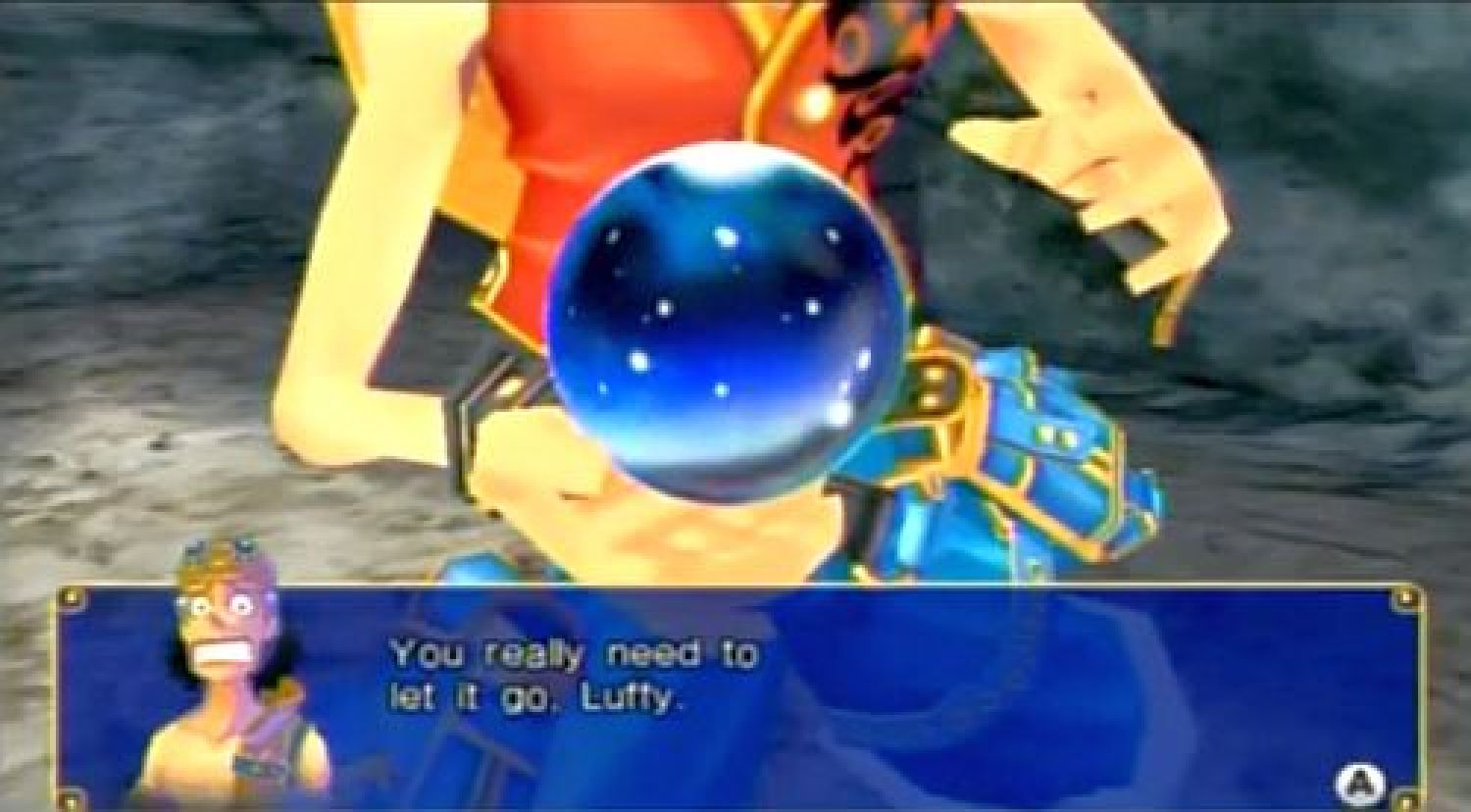
In my case and in the case of this PlayStation translation, I wish they had just left the font sizes and widths the same as the original games. The presentation quality would’ve been improved and it would’ve looked more professional in both cases.
Actually, while on this off-topic subject of fonts and text display, the PSP localization really irks me in terms of presentation. It feels very sloppy and unprofessional all over the place. A quick example is how the numbers are in a different font than the English text:
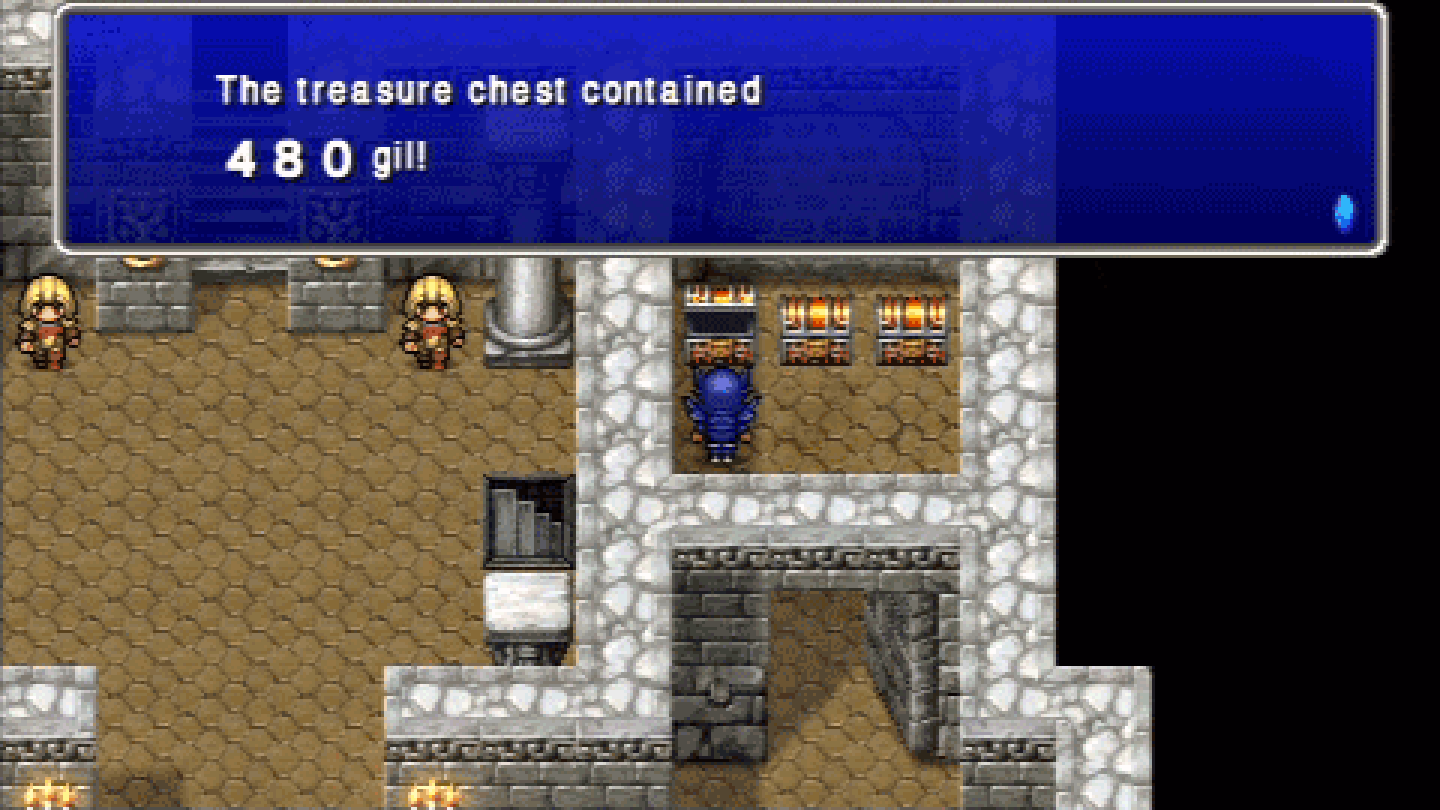
It’s just a tiny thing, but it’s the tiny, not-obvious things in games (especially text-related things) that quietly combine to affect the feel of a game. In this case, I think it helps contribute to the unprofessional, RPG Maker vibe the whole PSP version gives off.
Blocking Guard
After the king throws you out, a royal guard blocks the door to the throne room:
 | 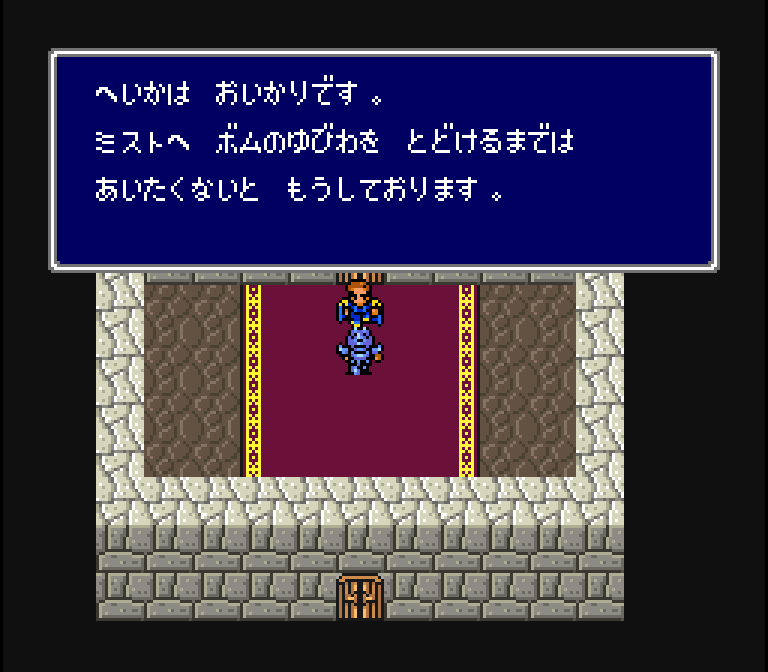 | 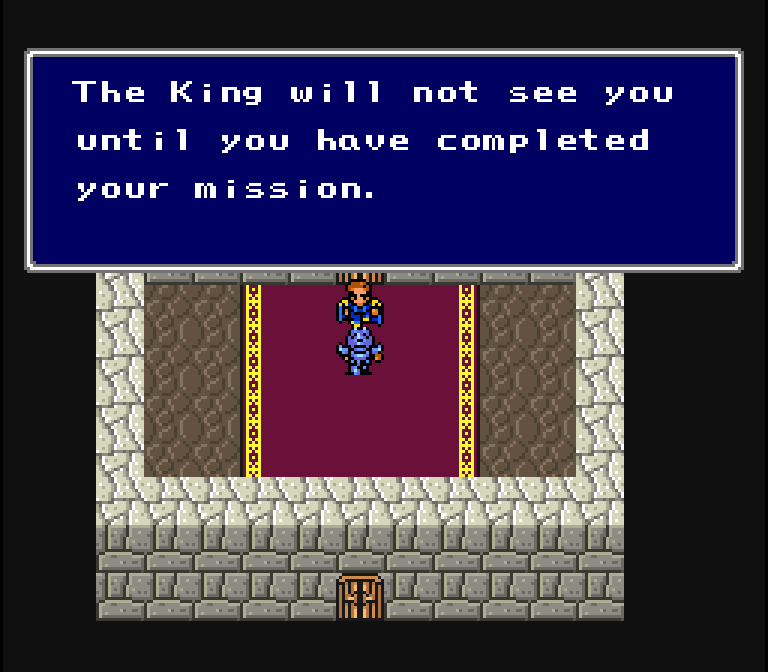 |
| Final Fantasy IV (Super Famicom) | Final Fantasy IV Easy Type (Super Famicom) | Final Fantasy II (Super NES) |
In Final Fantasy IV, he says, “His Majesty is angry. He says he doesn’t wish to meet with you until you’ve delivered the Bomb Ring to Mist.”
In the English version, he says, “The King will not see you until you have completed your mission.”
Easy Type Text Replacements
From this same scene with Baigan, we can see that Final Fantasy IV Easy Type has a slightly altered script:
 |  |  |
| Final Fantasy IV (Super Famicom) | Final Fantasy IV Easy Type (Super Famicom) | Final Fantasy II (Super NES) |
The Japanese Easy Type script basically says the same thing that Final Fantasy IV does, but it uses a simpler word for “angry”. There are many instances of words being simplified like this. If you know Japanese, here’s a simple list of examples:
| Final Fantasy IV | Final Fantasy IV Easy Type |
| ashiki | warui / aku no |
| dōkō suru | tomo ni yuku |
| kanpai | make |
| inishie | mukashi |
| amata no | ōku no |
| inishie no | densetsu no |
| jijō | wake |
| iyō na | myō na |
| kōseki | kinzoku |
Again, these changes won’t mean much if you don’t already know Japanese, but it’s a lot like replacing “wicked” with “bad” in English. It makes it easier for younger players to read and brings the point across more clearly.
Lost in Translation
Kain and Cecil have a little back-and-forth discussion about Cecil’s qualms with the king’s actions:
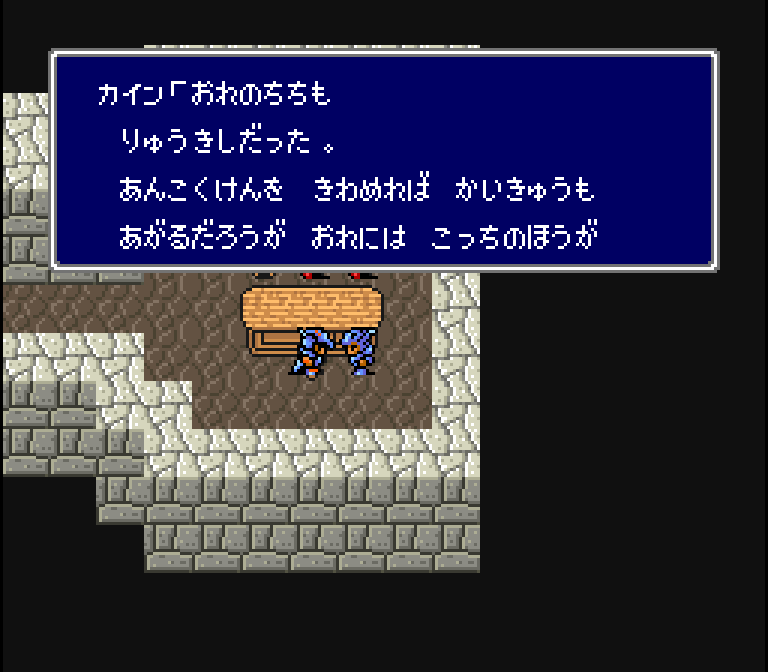 | 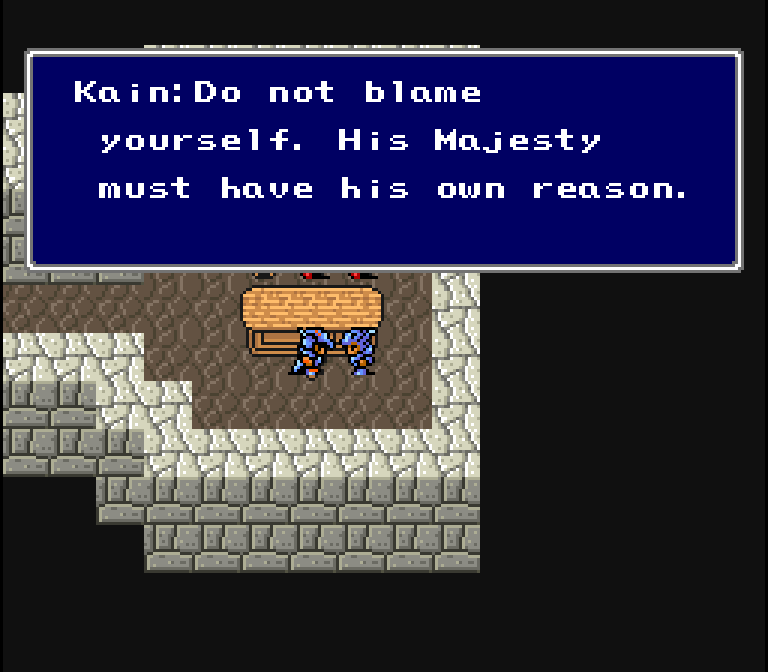 |
| Final Fantasy IV (Super Famicom) | Final Fantasy II (Super NES) |
In the English version, Kain ends the discussion by saying, “Do not blame yourself. His Majesty must have his own reason.”
He says this in the Japanese version, but then the discussion continues:
Cecil: I’m envious of you, Cain.
Cain: My father was once a Dragon Knight too. I’m sure I’d have a higher rank if I mastered the Dark Sword, but this suits me better. Plus I feel like if I stay a Dragon Knight, I’ll always be able to feel my father, who died when I was very young, you know?
Cecil: …
Cain: Heh. I wound up saying things that aren’t like me at all. In any case, don’t overthink things. We don’t have much of a rivalry with you acting that way. I’M the one who’s going to defeat the Eidolons.
Cecil: I won’t be outdone, either!
Cain: We have an early day tomorrow. Get some sleep.
This is a huge thing to leave out of the translation!
I’m not really sure why it would have been purposely cut out. My first guess is that maybe they were worried the death stuff wouldn’t sit well with Nintendo of America and its new family-friendly policies. Did it seem too dark to add in? We’ll see later that lots of stuff relating to death and such was smoothed over or worked around, so maybe this is just one part of it. Or maybe it was just ’cause.
The idea of a rivalry between the two characters is interesting and gives them added depth, especially later on. And we get to see that the two are a little closer friends than the English text shows.
Also of note is that what’s called a “Dragon Knight” in Japanese was translated as “Dragoon” in English.
Cain’s Name
In the English localization Cain’s name is spelled “Kain”. There’s no particular reason, based on the Japanese alone, that it couldn’t also be “Cain”. I suppose the “K” version makes it clear it should be a hard “k” sound.
In fact, the Japanese manual spells his name out in English as “Cain”:
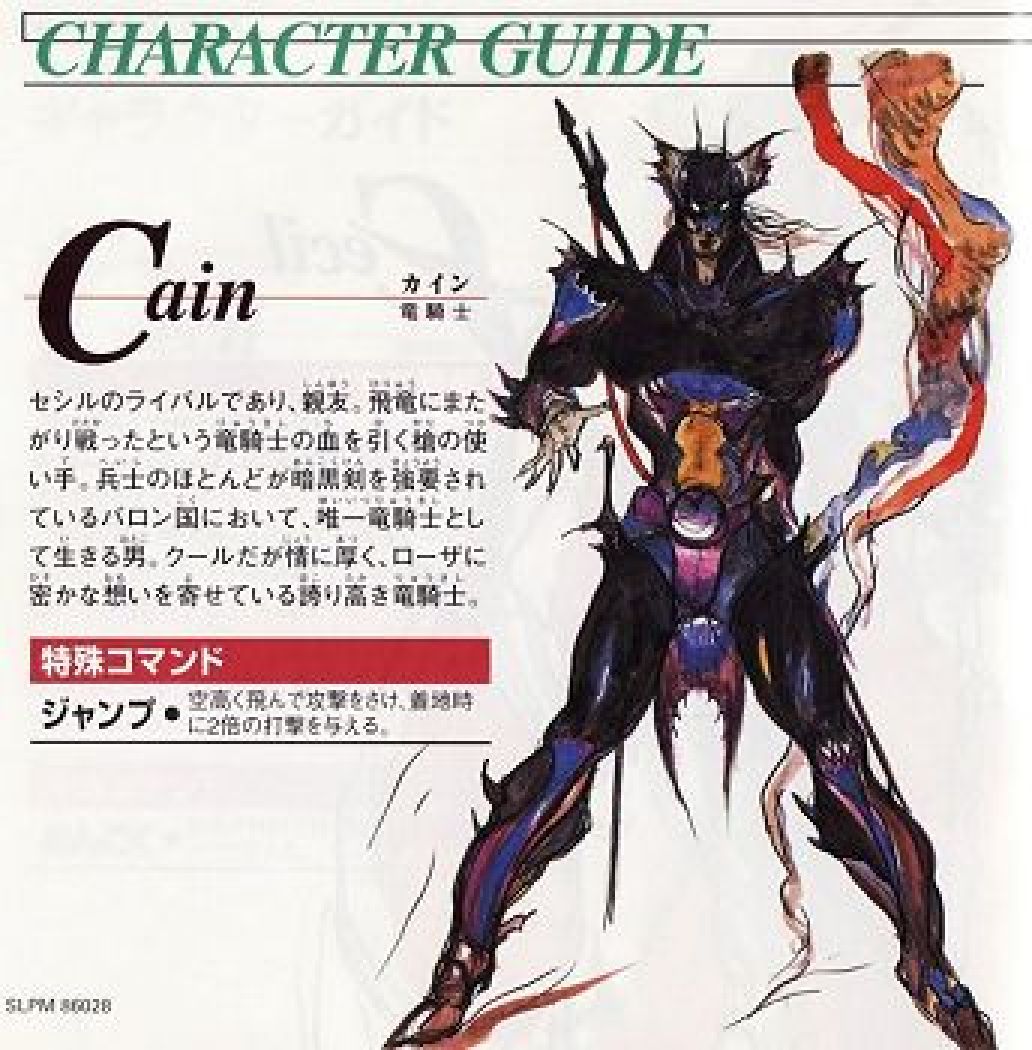
It’s actually common for Japanese creators to get incorrect translations of names they came up with themselves, but I don’t see why this might be wrong.
My best guess is that it’s actually a biblical reference, but if you have any other insight about it, let me know!
Rosa Supporter
In the White Magic research room (which the English translation calls a “class”), one of the white mages talks about Rosa:
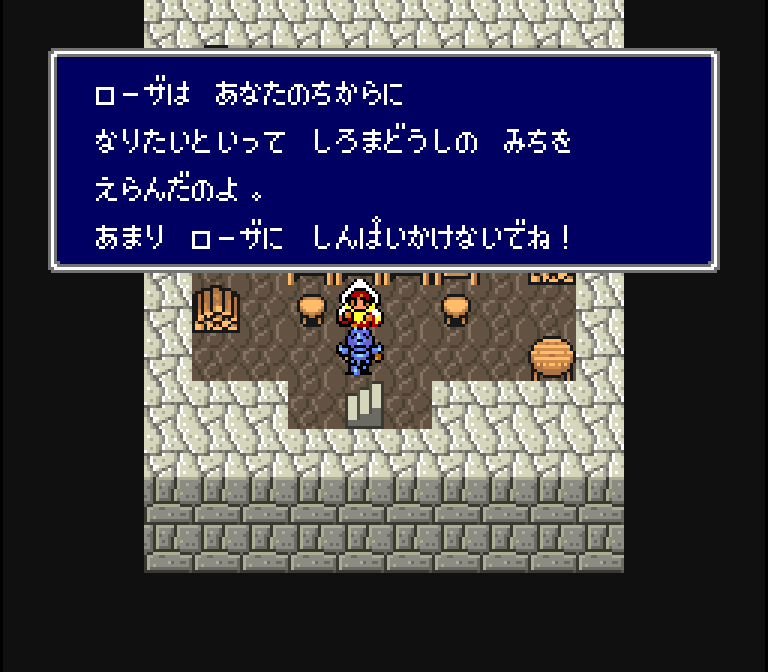 | 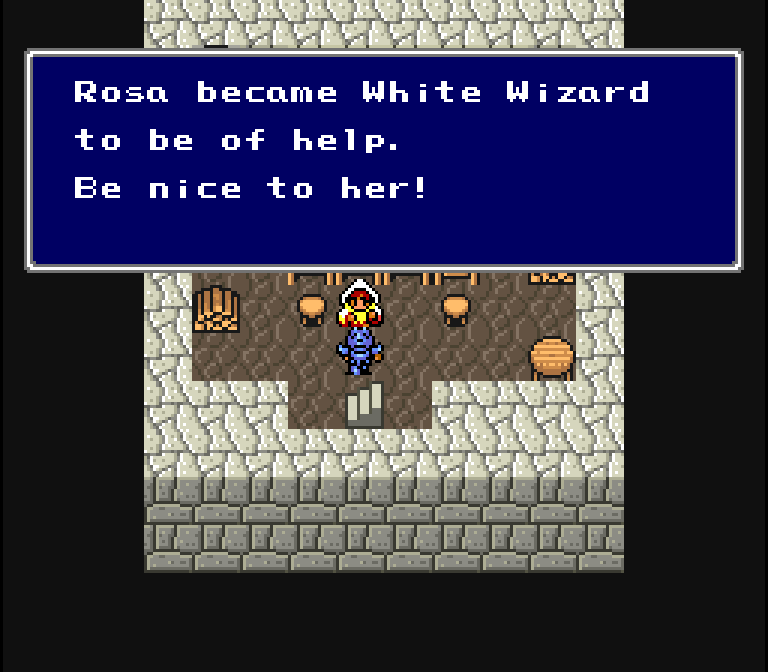 |
| Final Fantasy IV (Super Famicom) | Final Fantasy II (Super NES) |
The English line says, “Rosa became White Wizard to be of help. Be nice to her!”
This line is poorly written and left some stuff out. The Japanese line gives more insight: “Rosa chose the path of a white mage because she wants to help you. Don’t worry Rosa too much, okay?!”
Basic White Magic
This other white mage says something different in all three games:
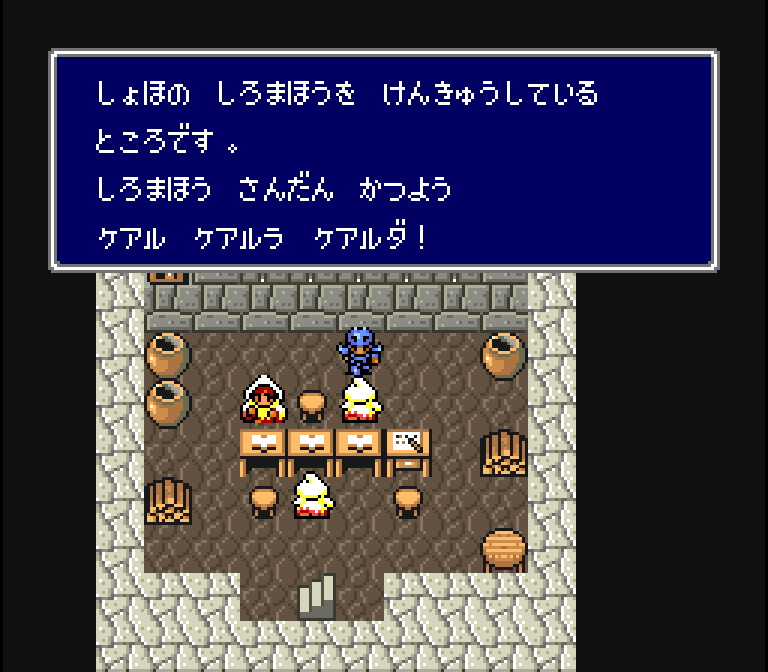 | 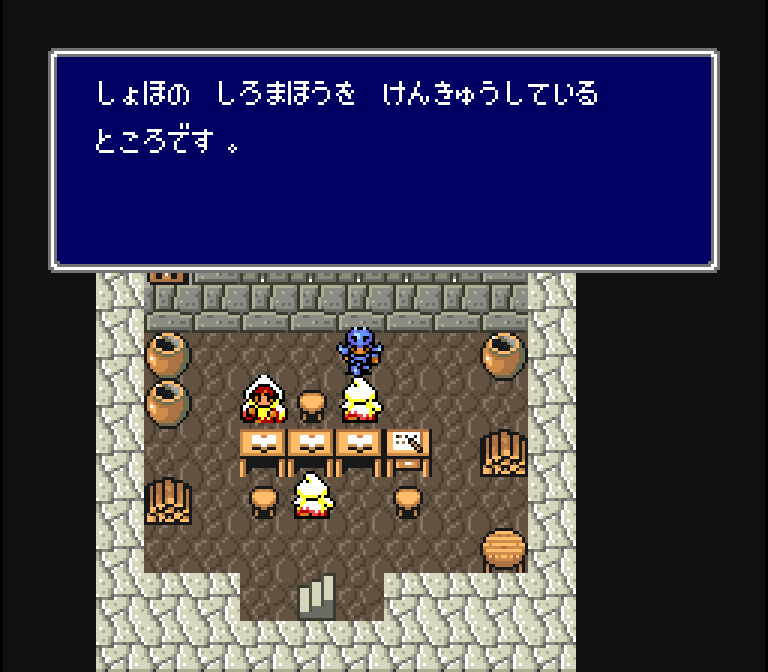 | 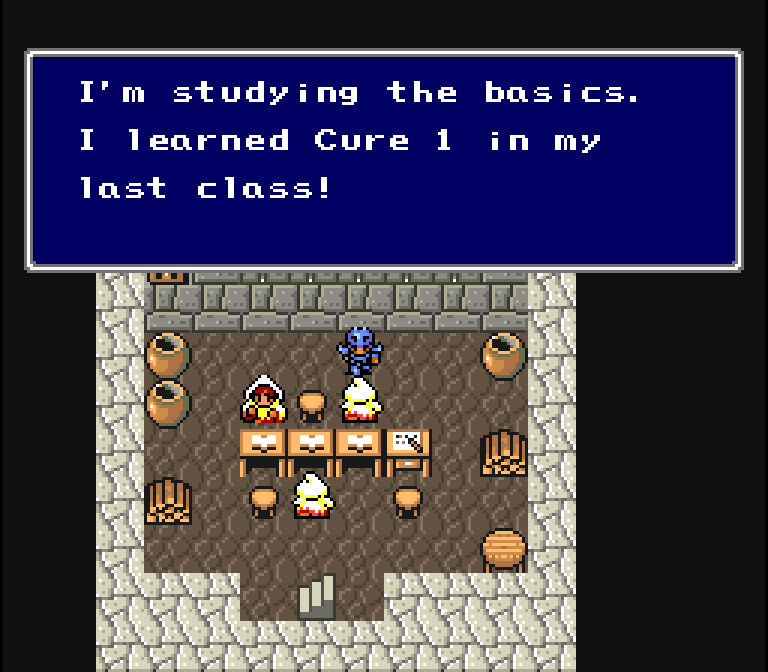 |
| Final Fantasy IV (Super Famicom) | Final Fantasy IV Easy Type (Super Famicom) | Final Fantasy II (Super NES) |
| Final Fantasy IV (basic translation) | Final Fantasy IV Easy Type (basic translation) | Final Fantasy II (Super NES) |
| I’m in the middle of studying basic white magic. The 3 Cs of white magic: Care, Carera, Careda! | I’m in the middle of studying basic white magic. | I’m studying the basics. I learned Cure 1 in my last class! |
Here we see that what’s known as “Cure” magic in Final Fantasy II is called “Care” in Japanese. Actually, many of the spell names are pretty weird in Japanese, so it could be a number of other things too, but “Care” seems most likely. We also see the “ra” and “da” things at the end of the spell – this is normal for Japanese Final Fantasy games. Until somewhat recently all the English localizations would replace those with numbers, so “Carera” would become “Cure 2” and so on.
Sleep Spell
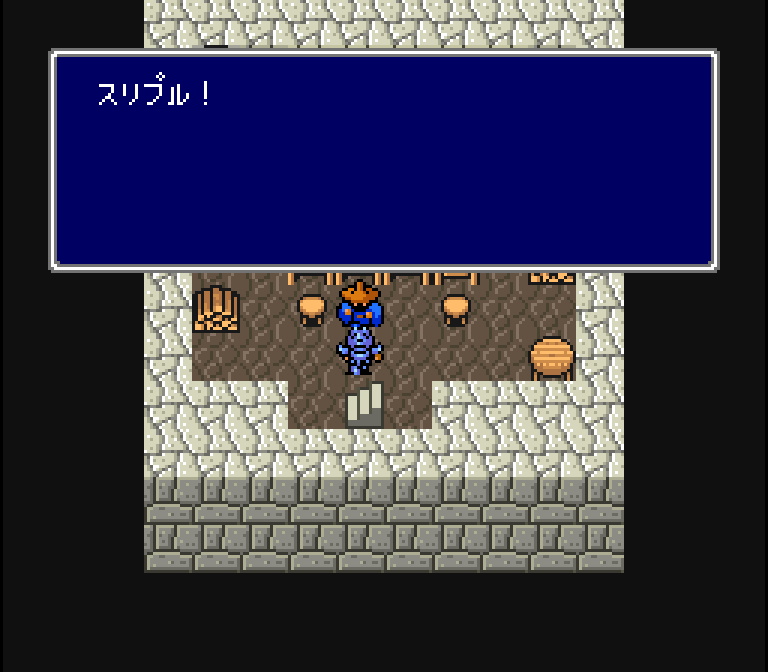 | 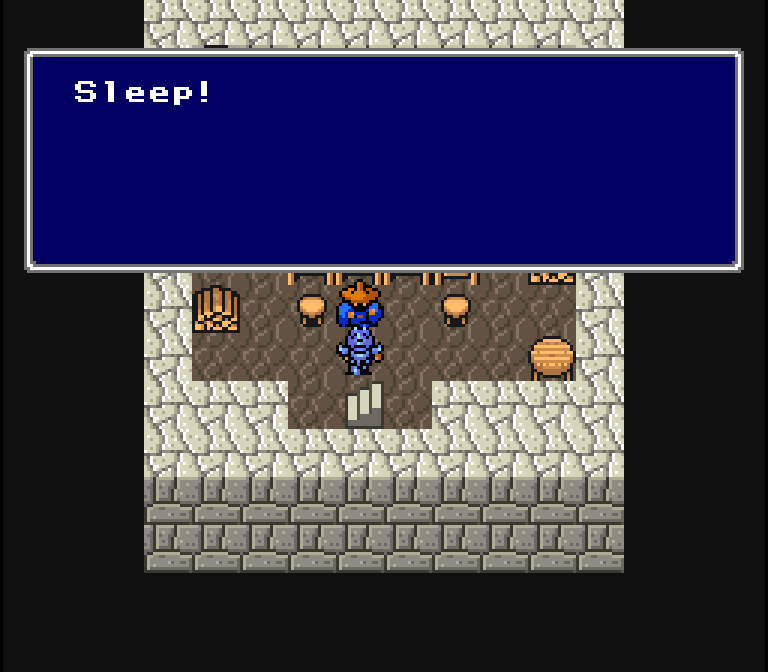 |
| Final Fantasy IV (Super Famicom) | Final Fantasy II (Super NES) |
In Final Fantasy II, this black mage tries to use the “Sleep” spell on you.
In Japanese, we see that it’s called something else – something like “Sleepel” or something pronounced like that, at least. Again, with made-up names like this there’s no good way of knowing what the intended English spelling would’ve been.
Basic Black Magic
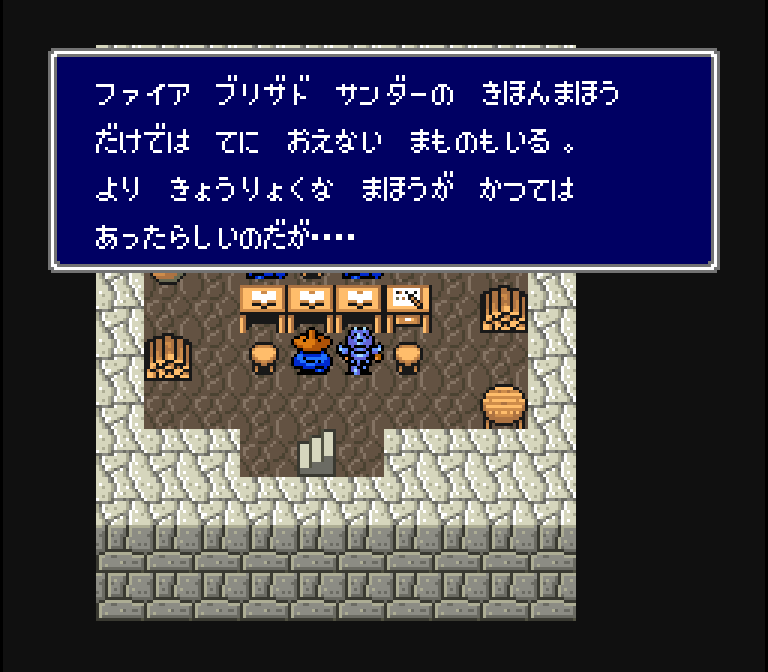 | 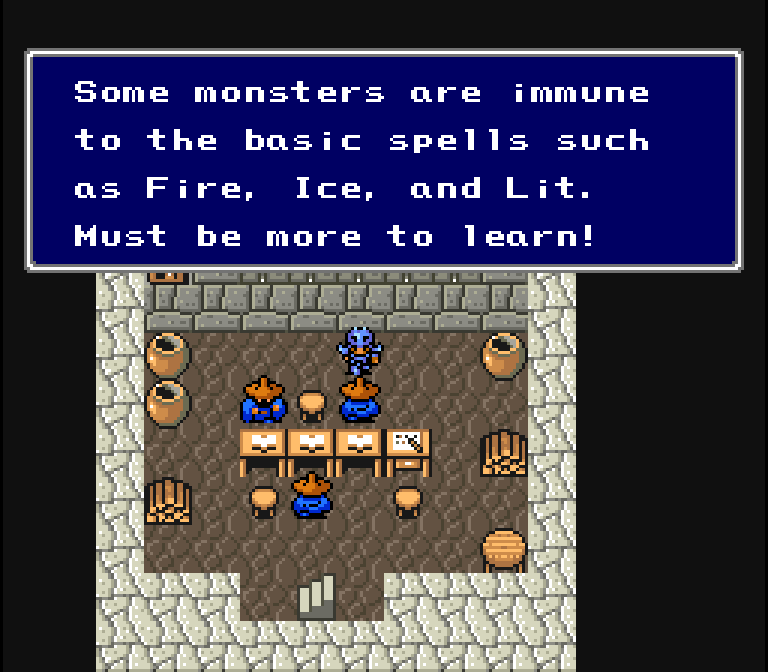 |
| Final Fantasy IV (Super Famicom) | Final Fantasy II (Super NES) |
In English, this other black mage says, “Some monsters are immune to the basic spells such as Fire, Ice, and Lit. Must be more to learn!”
In Japanese, the same mage says, “There are some monsters that can’t be dealt with using just the three basic types of magic: Fire, Blizzard, and Thunder. Supposedly there once existed an even more powerful magic, but…”
I’m assuming this is referring to Summoning/Calling, or possibly Meteo. My money’s on Meteo.
Anyway, the main thing is that Fire, Blizzard, and Thunder were changed to Fire, Ice, and Lit. I’m pretty sure this was done so that spell names could fit in the limited menu space available. I actually kind of grew fond of these English translations, so I was a little sad when later localizations changed them.
Switch Guard
 | 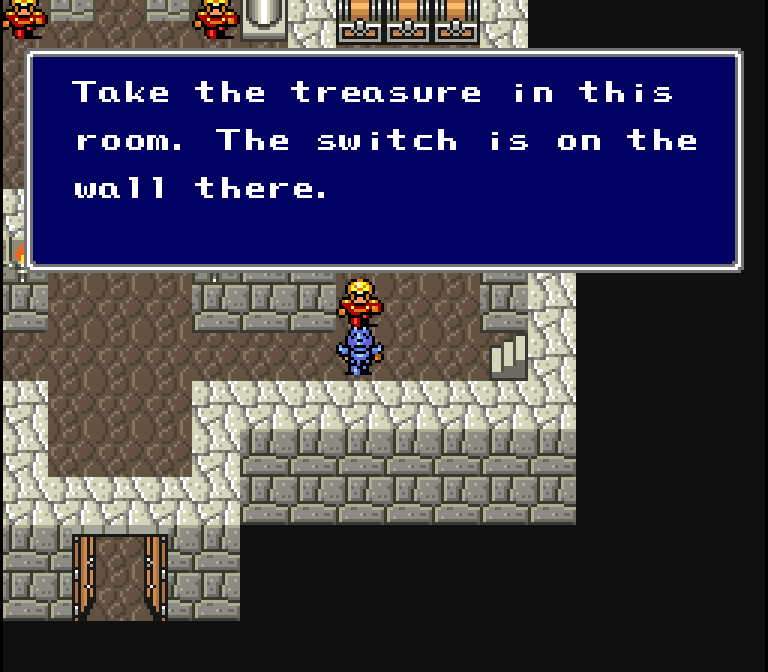 |
| Final Fantasy IV (Super Famicom) | Final Fantasy II (Super NES) |
In English, this guard says, “Take the treasure in this room. The switch is on the wall there.”
In Japanese, he says something more like, “I’ve been told you’re allowed to take the treasures in this room on your Eidolon hunt. Flip the switch on the wall and the door will open.”
Item & Treasure Change
Opening this treasure chest, we see that all three games have something different inside:
 | 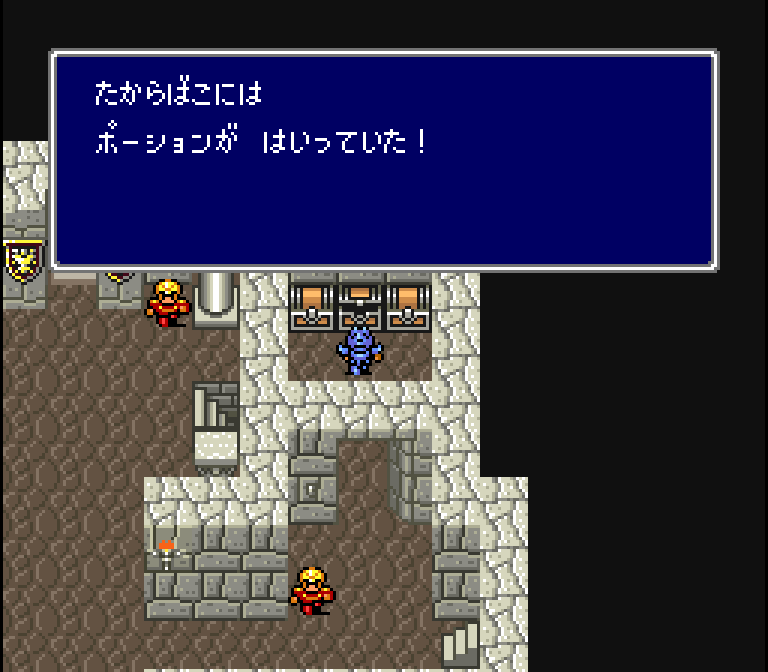 | 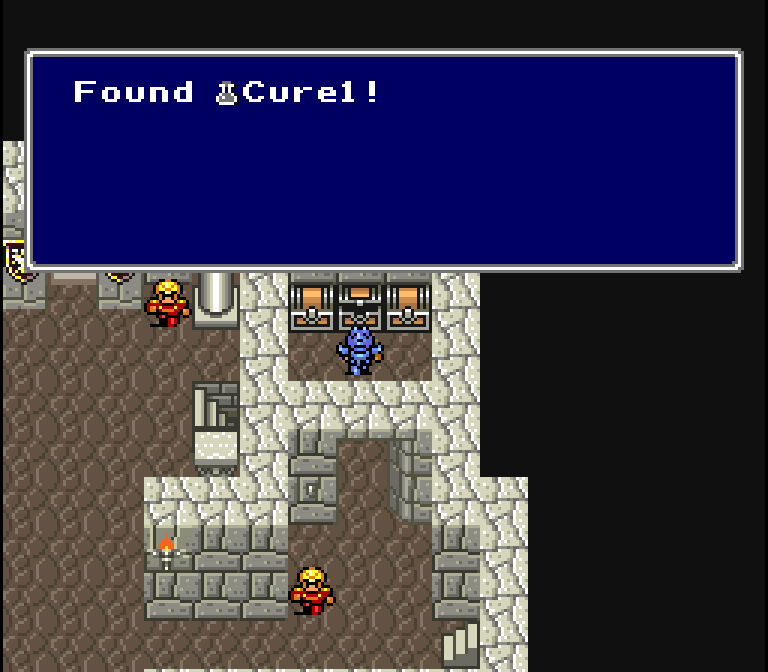 |
| Final Fantasy IV (Super Famicom) | Final Fantasy IV Easy Type (Super Famicom) | Final Fantasy II (Super NES) |
Final Fantasy IV has an Ether inside, Easy Type has a Potion inside, and Final Fantasy II has a Cure1 inside.
Technically, it’s the same item in Easy Type and Final Fantasy II, they just called it a “Potion” in Easy Type.
Sadly, if you try to sell the Ether, you’ll only get 1 Gil for it. It restores MP, but no one in your party has MP to begin with. What a pointless item to give players right off the bat. It’s no wonder they changed it in the other versions.
Extra Money
One of the chests here also gives you money:
 | 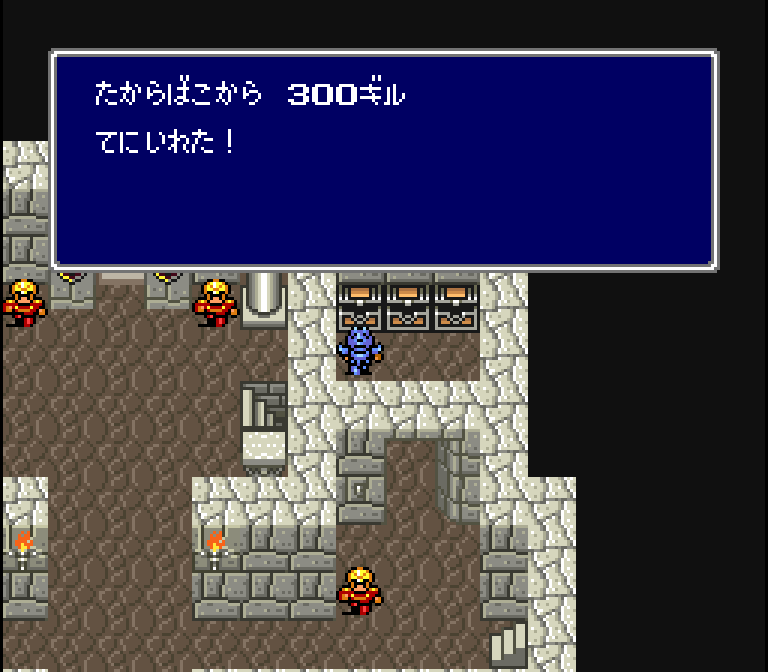 |  |
| Final Fantasy IV (Super Famicom) | Final Fantasy IV Easy Type (Super Famicom) | Final Fantasy II (Super NES) |
In Final Fantasy IV, you get 480 Gil. But in Easy Type and Final Fantasy II, you only get 300.
Incidentally, the currency is called “Gil” in Japanese but was translated as GP in English. “Gil” is another term that appears in many other Final Fantasy games as well.
Royal Treasure Guard
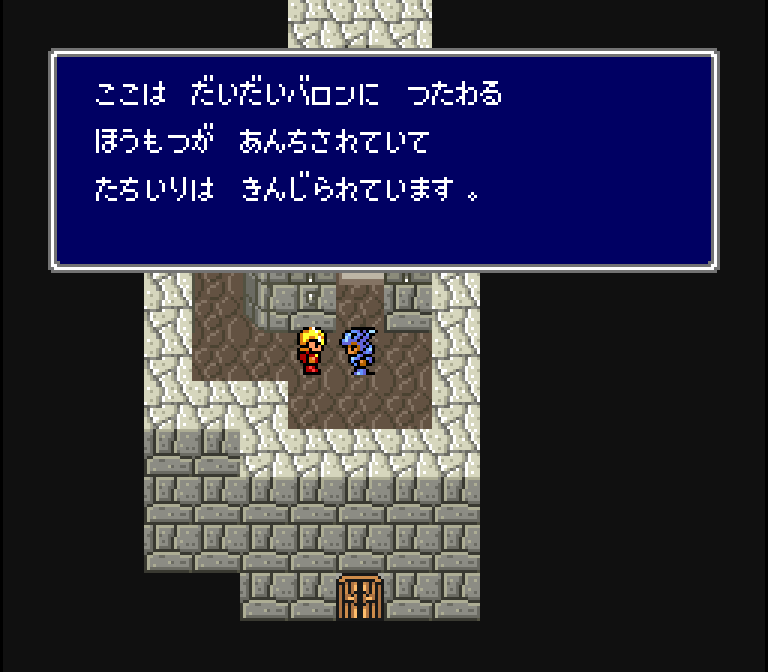 |  |
| Final Fantasy IV (Super Famicom) | Final Fantasy II (Super NES) |
In English, this guard says, “The treasure of Baron is stored here. No one is allowed.”
In Japanese, what he says is a little wordier and roughly something like: “Treasure passed down from one Baron generation to another is stored here; entrance is forbidden.”
Baron Castle Name
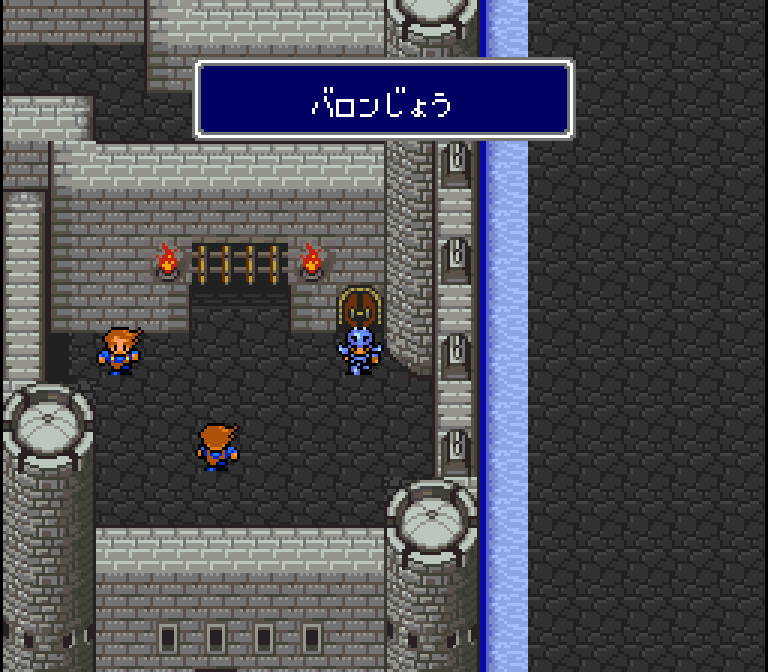 | 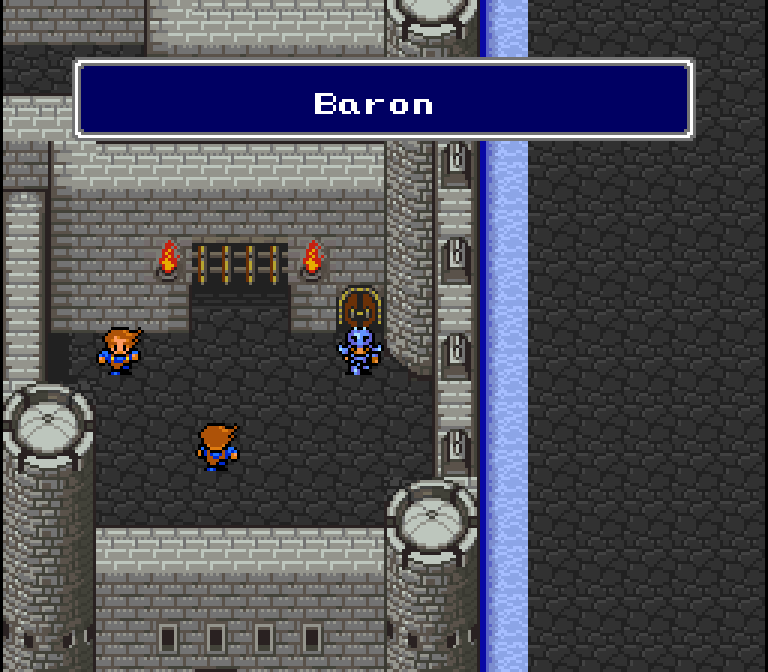 |
| Final Fantasy IV (Super Famicom) | Final Fantasy II (Super NES) |
In Japanese, this place is called “Baron Castle” while the English translation simply says “Baron”.
I wouldn’t really bat an eye at it except for the fact that “Baron” is the name of the city outside the castle.
We can also see that the location name window has been made bigger for the English localization.
Airship Apprentice 1
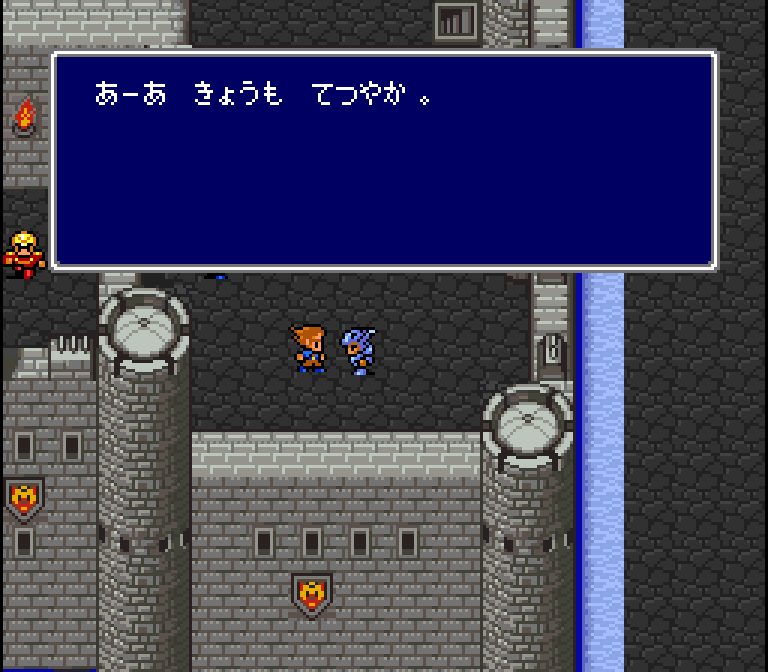 | 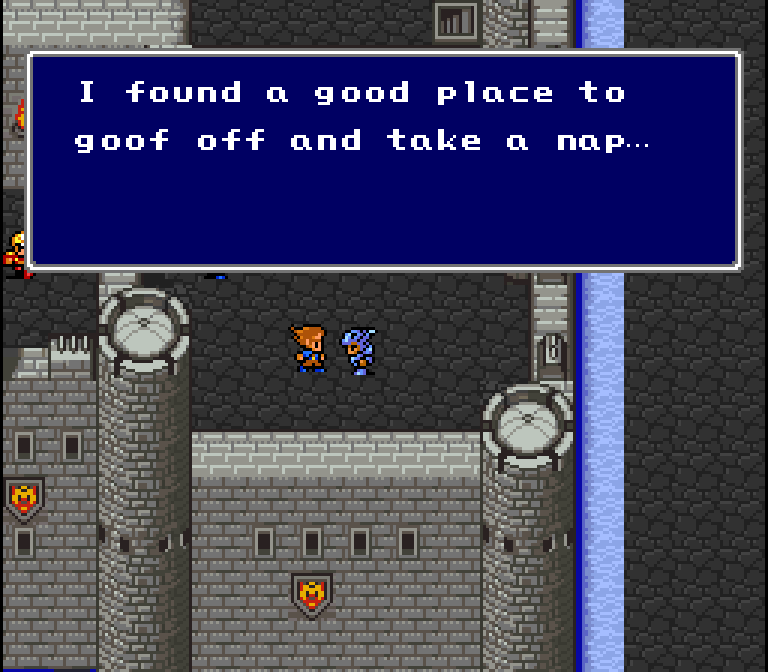 |
| Final Fantasy IV (Super Famicom) | Final Fantasy II (Super NES) |
In Japanese, one of Cid’s assistants is complaining and says, “Ugh, not another all-nighter.” Then he gets flustered and asks you not to tell Cid.
In English, the same guy says, “I found a good place to goof off and take a nap…” Then he acts flustered in the same way and asks you not to tell Cid.
Basically, in the Japanese version, we can tell these guys are working really hard and just want a break – Cid’s a real slavedriver. In the English version, they just seem like lazy jerks.
Airship Apprentice 2
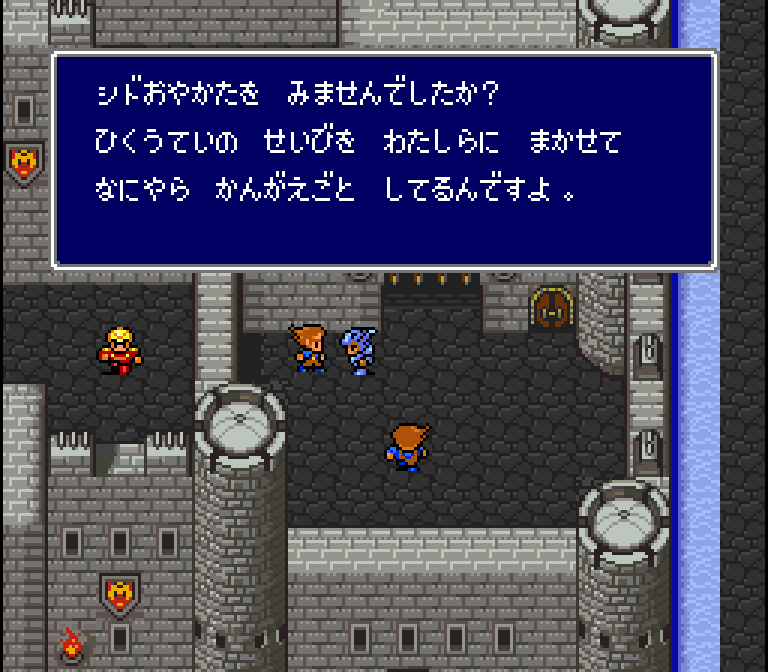 | 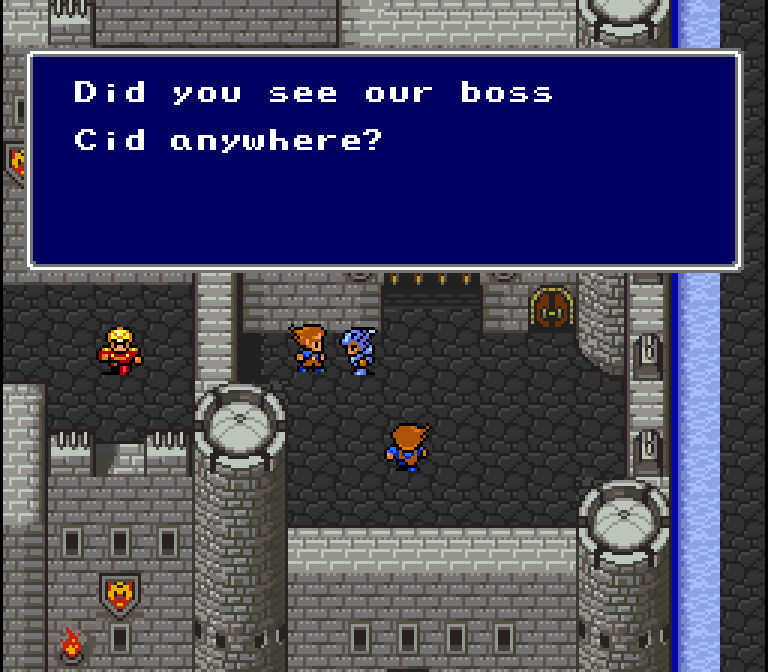 |
| Final Fantasy IV (Super Famicom) | Final Fantasy II (Super NES) |
Cid’s other assistant says in English, “Did you see our boss Cid anywhere?”
In Japanese, he says, “Have you seen Cid, our boss? He left us with all the airship maintenance work and seems to have something on his mind.”
From this, you get the feeling that something’s probably bothering Cid. The English version gave no such information.
Tower Guard
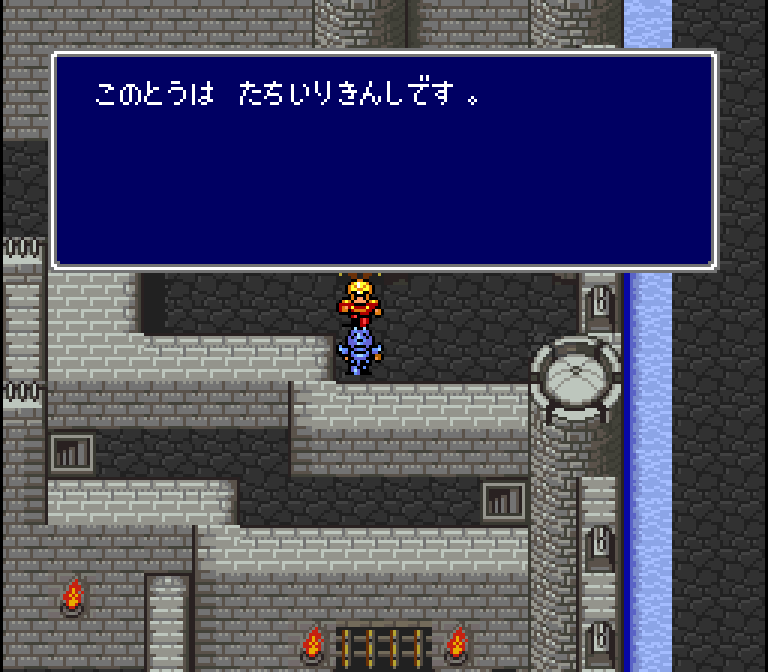 | 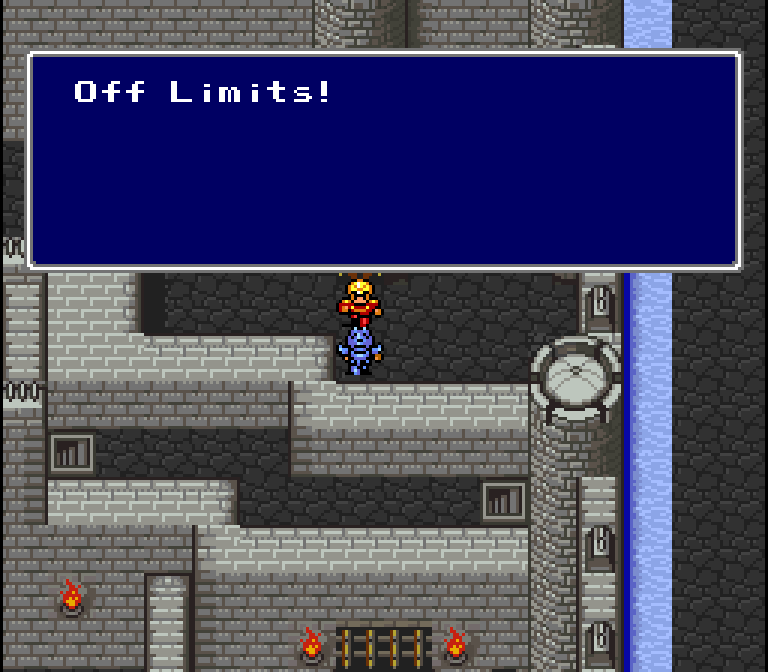 |
| Final Fantasy IV (Super Famicom) | Final Fantasy II (Super NES) |
In Japanese, this guard who blocks a tower says, “This tower is off-limits.” He says it in a nice, polite, professional way.
In English, he shouts, “Off Limits!”
Sensitive Guard
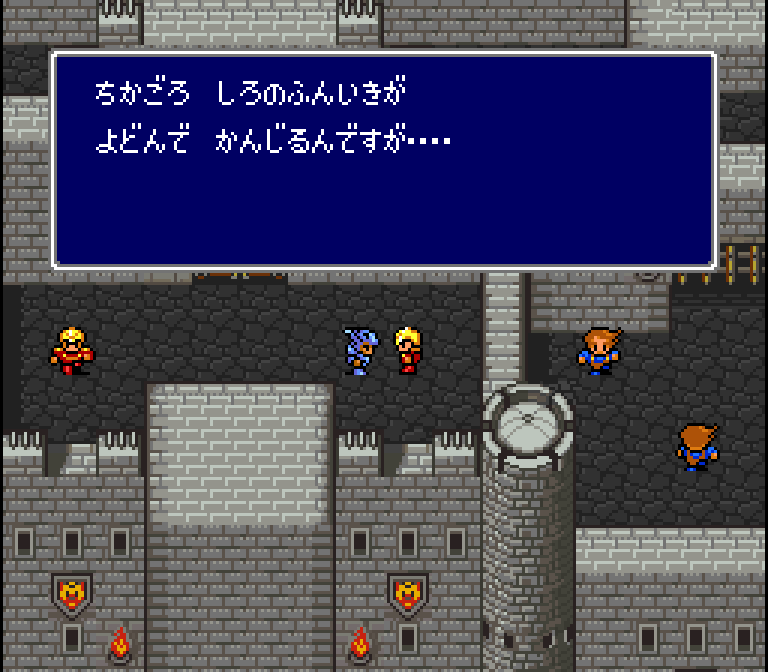 |  |
| Final Fantasy IV (Super Famicom) | Final Fantasy II (Super NES) |
This guard in Baron says in English, “I feel something evil within this castle lately. Don’t you, sir?”
In Japanese, it’s more like, “The atmosphere in the castle feels stagnant lately…”
That’s a little oddly worded, but he isn’t saying something’s straight-out evil – just that something isn’t quite right in the air.
Lookout Guard
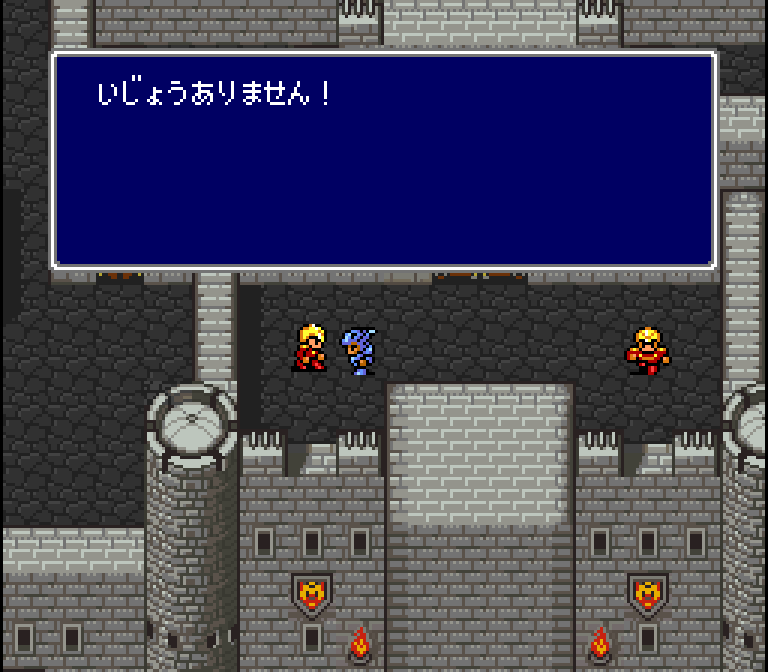 | 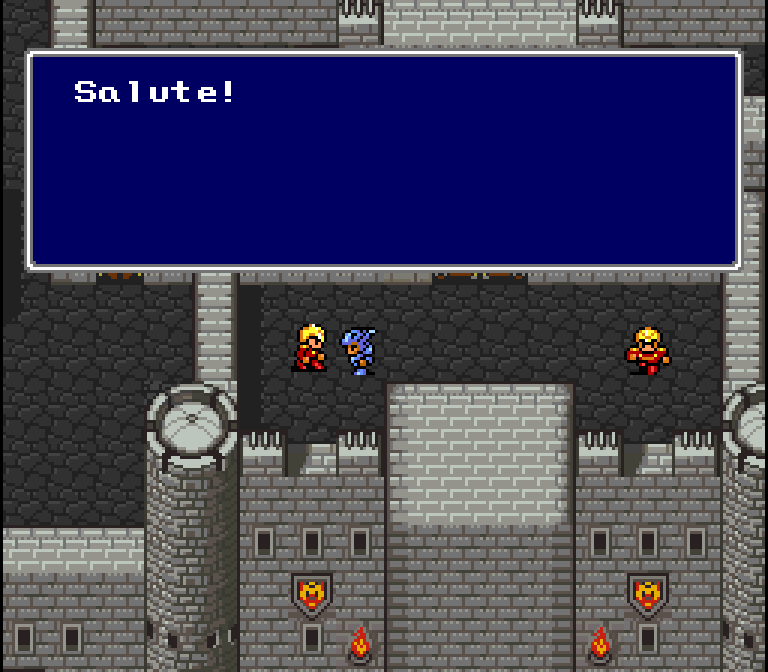 |
| Final Fantasy IV (Super Famicom) | Final Fantasy II (Super NES) |
In Japanese, this other lookout says something like, “All clear!”
In English, he for some reason says, “Salute!”
Meeting Rosa
While we’re here, let’s take a look at what Rosa has to say to Cecil:
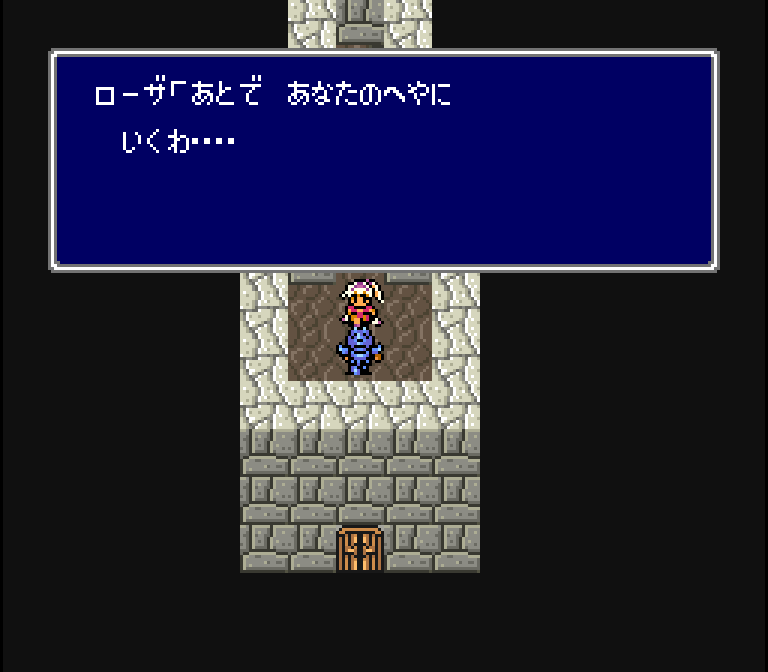 | 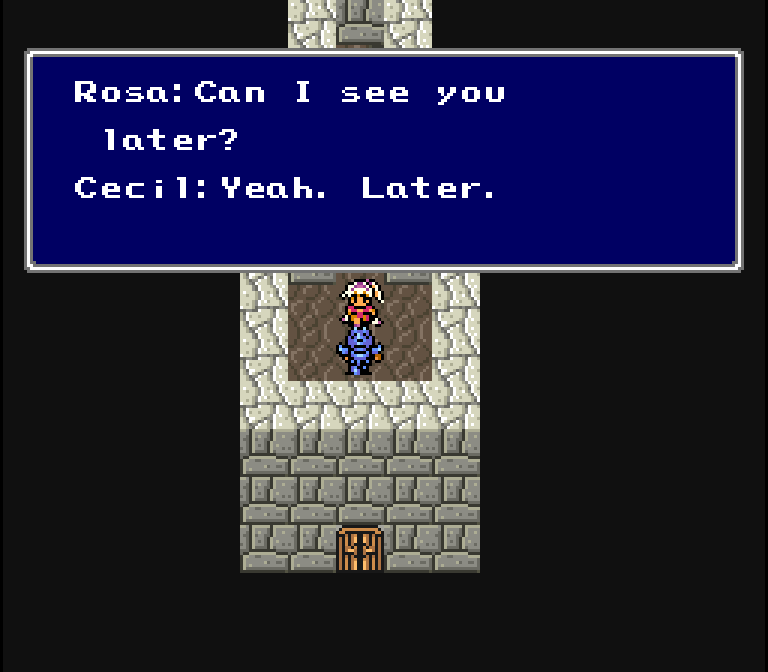 |
| Final Fantasy IV (Super Famicom) | Final Fantasy II (Super NES) |
| Japanese Version (basic translation) | English Translation |
| Rosa: Cecil! | Rosa: Cecil! |
| Rosa: Thank goodness, you’re all right. It was such a sudden mission that I was worried. | Rosa: You are not hurt? I was so anxious. |
| Cecil: We’re fine… We’d never be hurt dealing with mages who don’t even resist… | Cecil: We are not hurt. How could we be? The wizards didn’t even raise their hands. |
| Rosa: Cecil! | Rosa: Cecil! |
| Rosa: I’ll come to your room later… | Rosa: Can I see you later? |
| Cecil: Uh-huh… | Cecil: Yeah. Later. |
Looking at the Final Fantasy II localization now, I can’t help but think, “WE ALL TALK LIKE ROBOTS.” But I do really like how the part about the wizards not raising their hands sounded – it actually almost sounds kinda natural.
As before, the Japanese version gives Cecil that sort of sense of upset preoccupation. You don’t even need to know Japanese to notice – just look at all those ellipses! In the English translation, that same vibe isn’t quite as strong.
Prison Mage 1
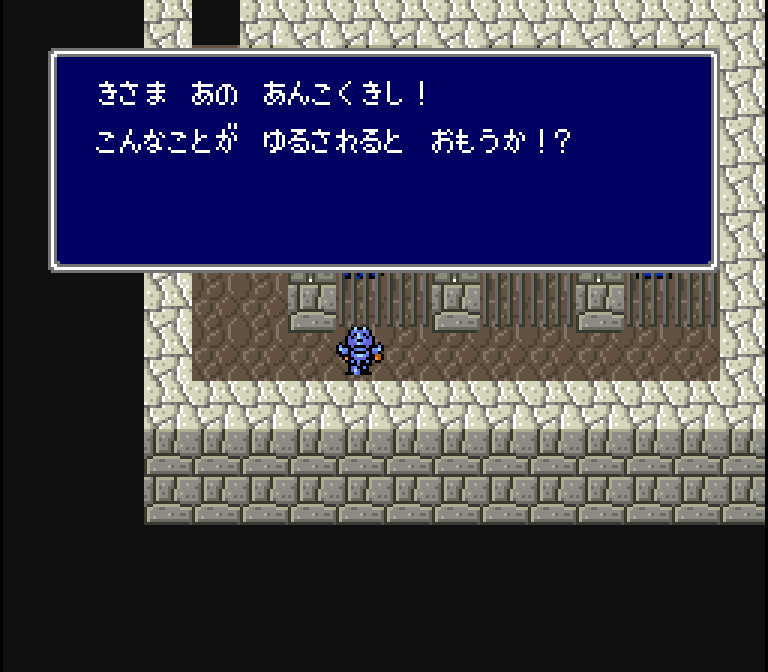 |  |
| Final Fantasy IV (Super Famicom) | Final Fantasy II (Super NES) |
In the Japanese games, this imprisoned black mage says something like, “You’re that Dark Knight! Do you honestly think you’ll get away with this!?”
In English, he simply says, “You’re that Dark Knight!”
Prison Mage 2
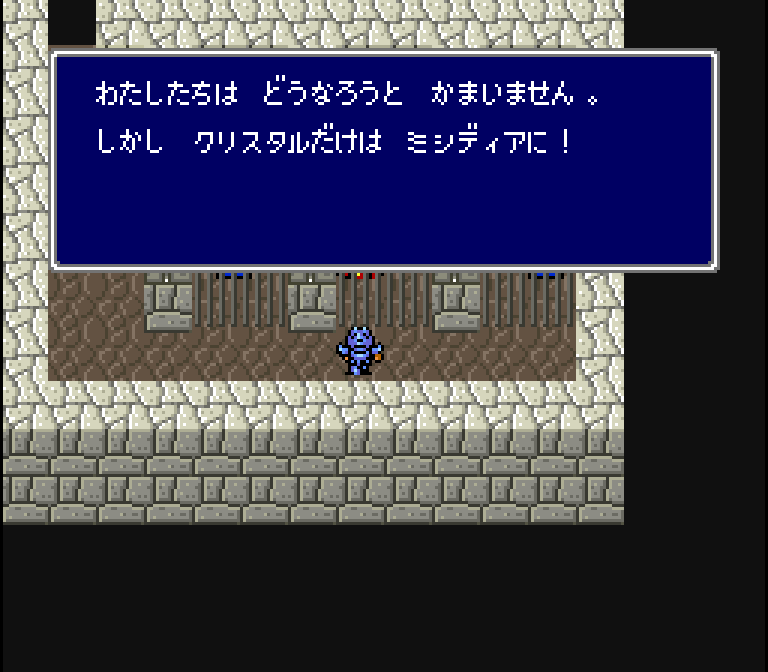 | 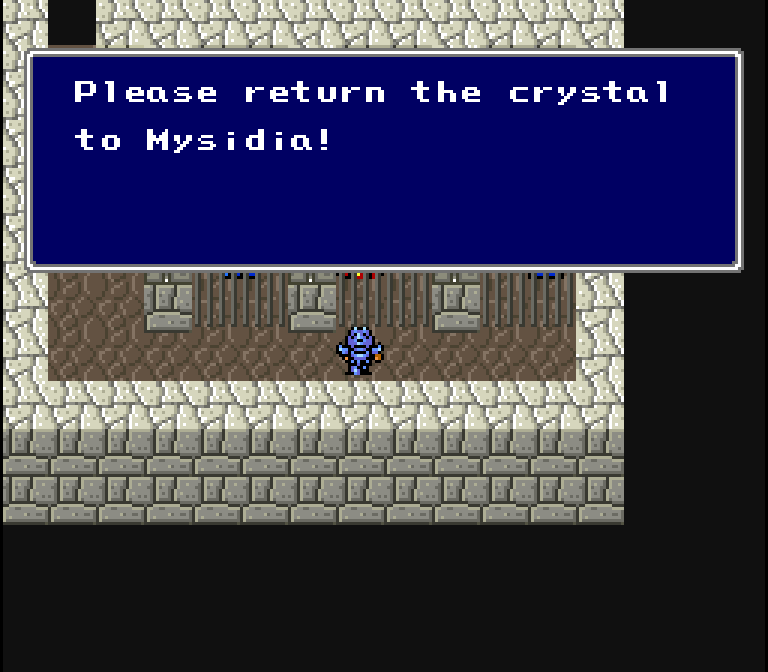 |
| Final Fantasy IV (Super Famicom) | Final Fantasy II (Super NES) |
This other mage says in Japanese, “We don’t care what happens to us. All we ask is that you return the crystal to Mysidia!”
In English, this too was shortened to simply, “Please return the crystal to Mysidia!”
Cid Speaks
In Japanese, Cid speaks in a very distinctive style – no one else in the game talks like him:
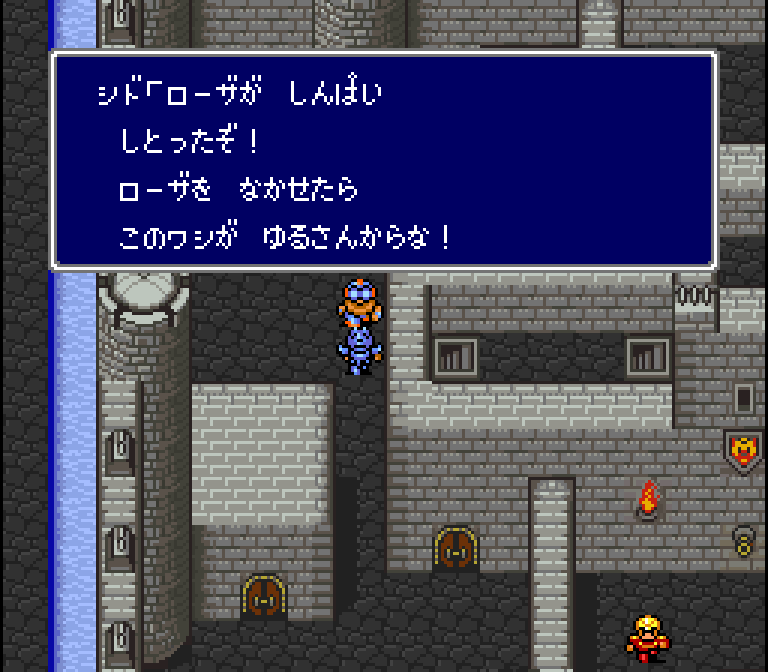 | 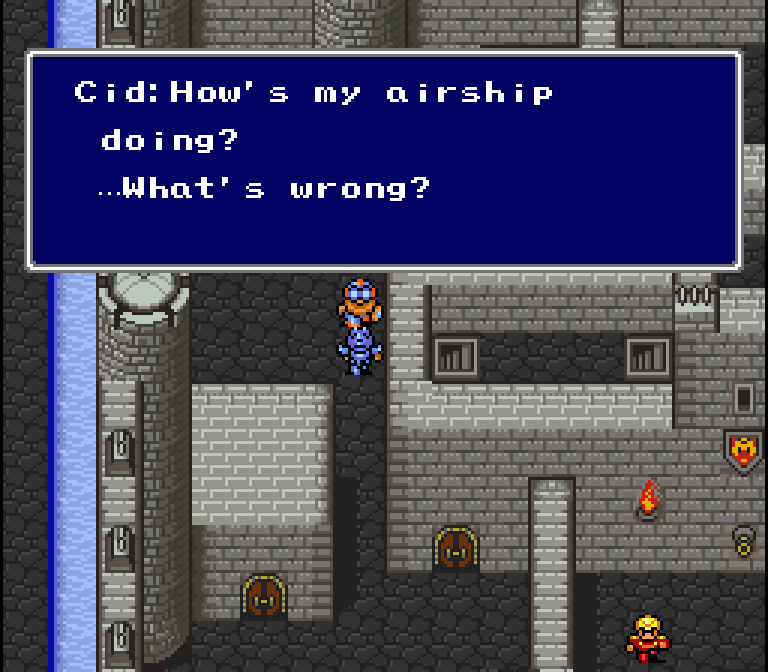 |
| Final Fantasy IV (Super Famicom) | Final Fantasy II (Super NES) |
In this case, he speaks in a sort of “rough around the edges and experienced older guy” vibe. It’s hard to describe in words, I guess. Anyway, this is lost in the switch to English. With some clever word-crafting I bet it’d be possible to bring across a similar feeling in English, though. Knowing the 8000 ports, remakes, and fan translations, I’m sure someone’s managed it somehow.
While we’re here, let’s look at what Cid actually has to say:
| Japanese Version (basic translation) | English Translation |
| Cid: Oh, Cecil, you’re back! | Cid: Hey! Cecil! |
| Cid: You had Rosa worried, you know! If you make her cry, I’ll personally make you pay, just so you know | |
| By the way, are my adorable airships okay? Your men handle them too roughly. | Cid: How’s my airship doing? |
| Why the long face?! | …What’s wrong? |
| Cecil: Well, the truth is, Cid… | Cecil: I was… |
| Cid: Say what? | Cid: What?! |
| Hunting Eidolons? Who else but you can command the Red Wings?! | Cid: Who’s gonna command the Red Wings then? |
| Man, what’s gotten into His Majesty? He told me to build a new type of airship… but I don’t want airships to be used as tools for killing! It has people in town wondering, too… | I’m not sure what the King is thinking. He ordered me to make an airship, but I don’t want it to be used as a weapon! |
| Anyways, be careful, you hear?! Take out those Eidolons with one swipe of your Dark Sword! | |
| I’m going home now. My daughter’s been on my case ’cause I haven’t been home lately! | Well, I gotta go home. I have been working all night, and my daughter is worried about me. |
We can see that there’s quite a bit of difference between the two. A couple points of interest:
- All the talk about Rosa is gone. The Japanese version shows that Cid and Rosa have some sort of relationship or connection. You never would’ve known from the English line.
- We can tell that Cid loves his airships based on the Japanese text.
- The talk about Cecil having to hunt the Eidolons is gone.
- Cid talks about how the king wants him to build a new type of airship. This is a story element that comes into play later, but this early mention gets tossed out in the English translation.
- The mention of killing/murder is removed.
- According to the Japanese text, Cid hasn’t been home in a good while, not just a single night.
All in all, it’s not the most important piece of dialogue, but these few sentences do help establish a lot of background stuff.
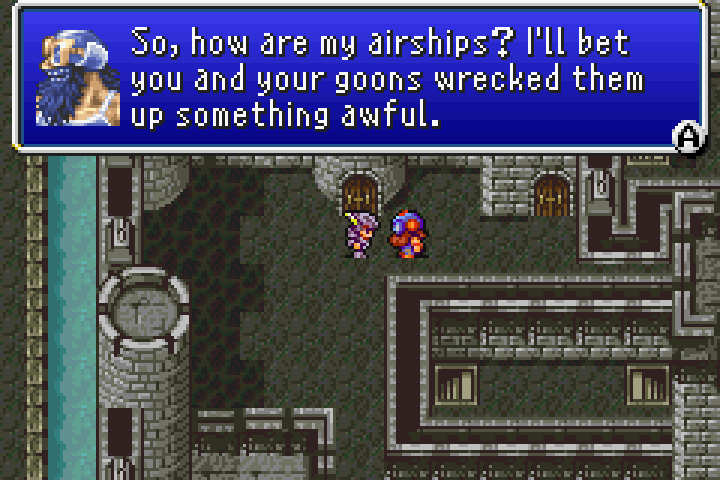
The Game Boy Advance translation here stuffs in the words “goons” and “something awful” to make an Internet inside joke. It’s done in a way so that people in the know will get it, but those not familiar with Something Awful won’t sense anything out of the ordinary. Many more such Internet jokes exist in the GBA translation.
Some feel these jokes in the GBA version cheapen the game, some don’t care, some like it. But, because later translations use the GBA translation as a base, these little “funny additions” have since leaked into other versions of Final Fantasy IV:

Unfortunately, even later re-releases of Final Fantasy IV are based on this PSP translation. This means that these ancient, unwarranted Internet jokes are still part of Square-Enix’s official English script decades later. Oops.
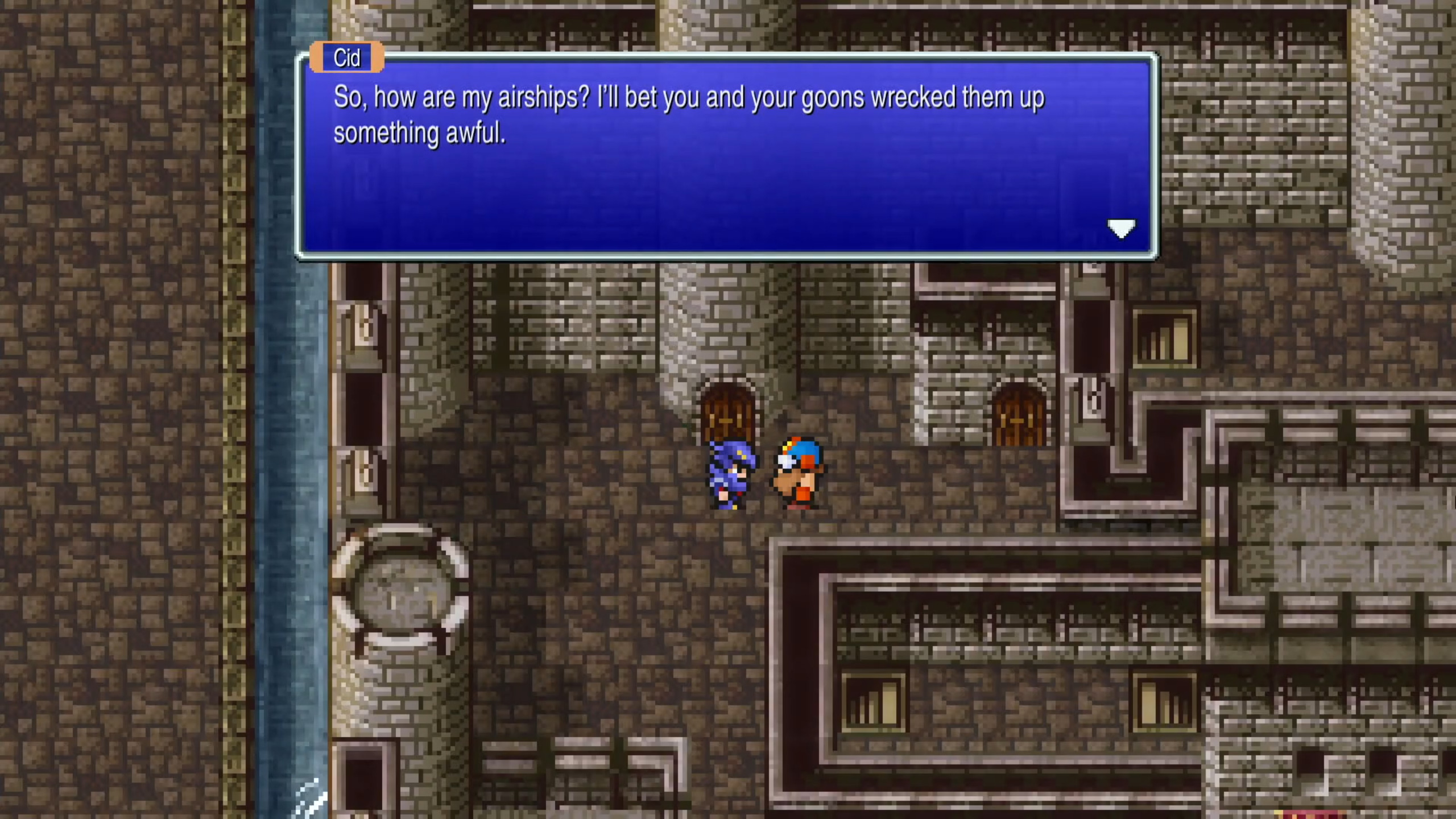
Pained Soldier
 | 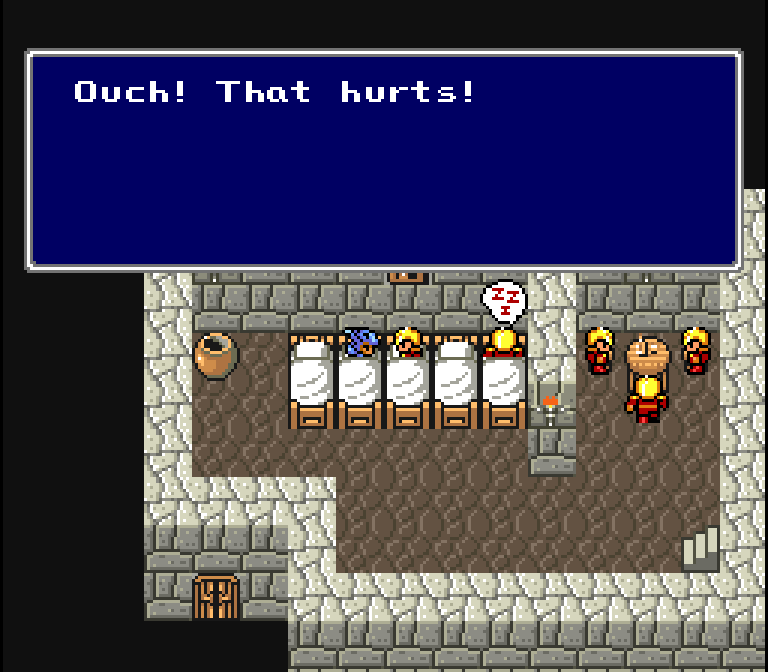 |
| Final Fantasy IV (Super Famicom) | Final Fantasy II (Super NES) |
In English, this soldier lying in bed says, “Ouch! That hurts!”
In Japanese, he gives some more details: “Oww! That’s a wound I got from a monster!”
Thirsty Soldier
This soldier by the table says something different in all three games:
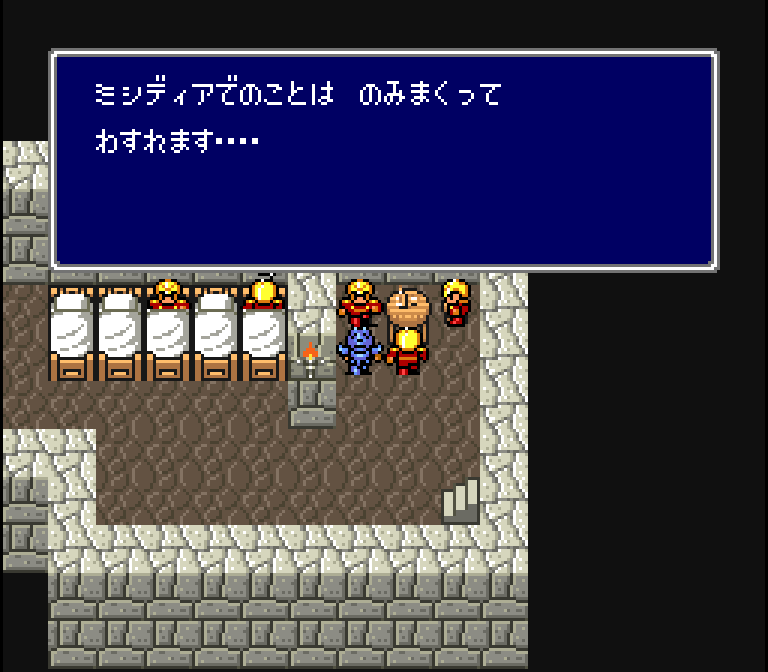 | 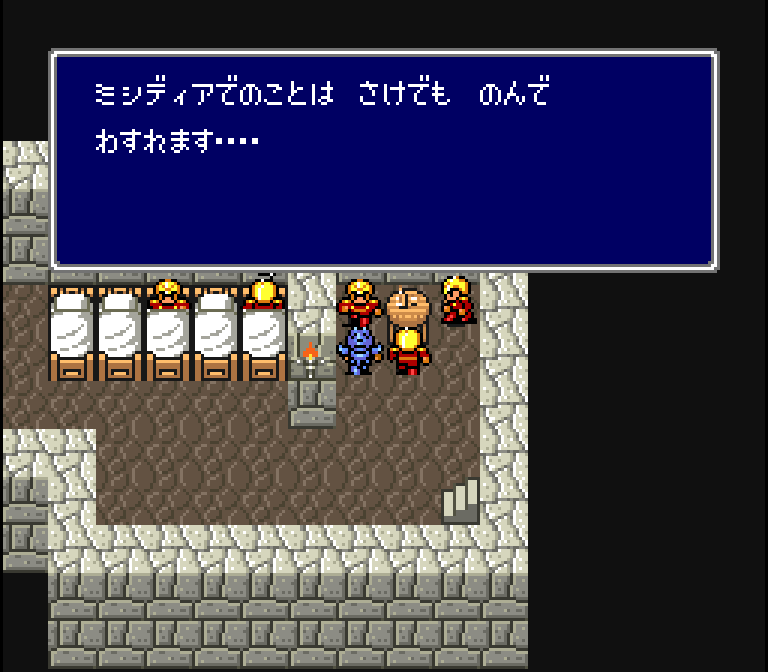 | 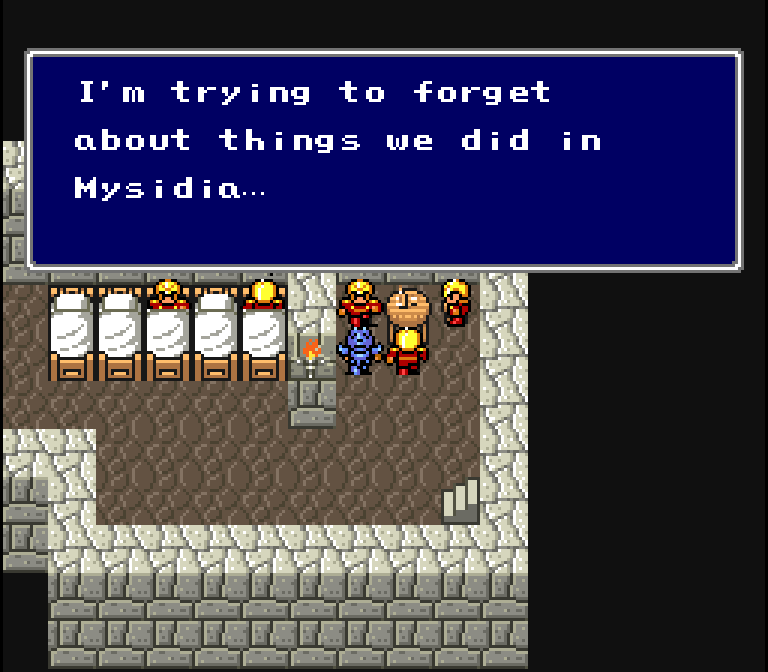 |
| Final Fantasy IV (Super Famicom) | Final Fantasy IV Easy Type (Super Famicom) | Final Fantasy II (Super NES) |
| Final Fantasy IV (basic translation) | Final Fantasy IV Easy Type (basic translation) | Final Fantasy II (Super NES) |
| I’m gonna drink like crazy and forget about what happened in Mysidia… | I’m gonna drink booze or something and forget about what happened in Mysidia… | I’m trying to forget about things we did in Mysidia… |
The original line makes sense. The Easy Type line was probably toned down for a younger audience – don’t want to give the impression that drinking is the best way to handle bad situations. The English line just toned it all the way down and completely took out the drinking reference altogether.
The PlayStation version changes this line to: “We’ll just eat and laugh and try to forget about Mysidia.”
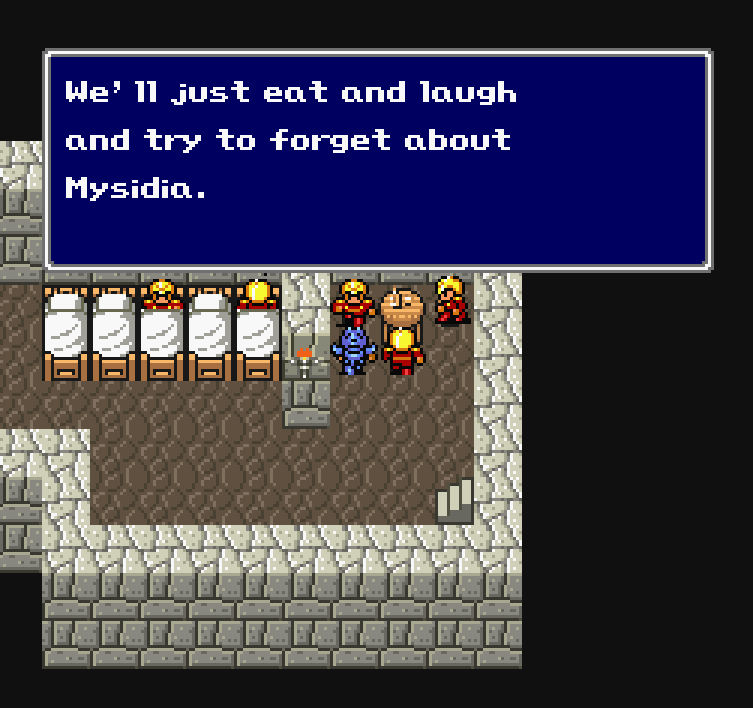
So it sounds like the PlayStation version wasn’t allowed to have alcohol references either. Killing and swearing’s okay, though.
Naturally, since the GBA and PSP versions are based on the PlayStation translation, this line remains intact there. Here’s the GBA line:
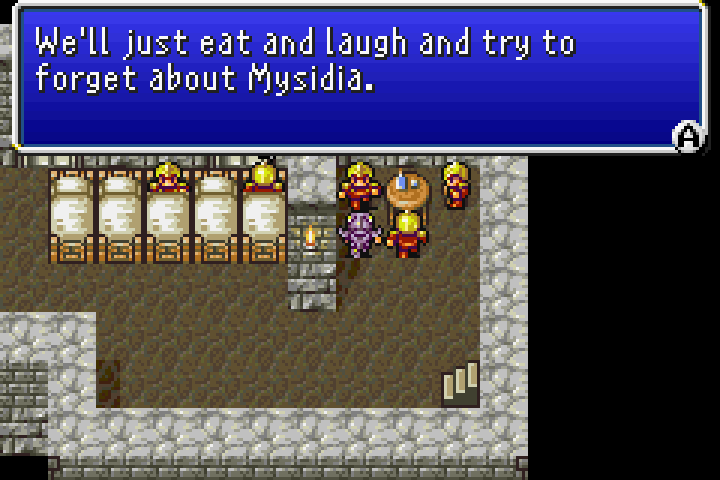
And here’s the same line in the PSP version:
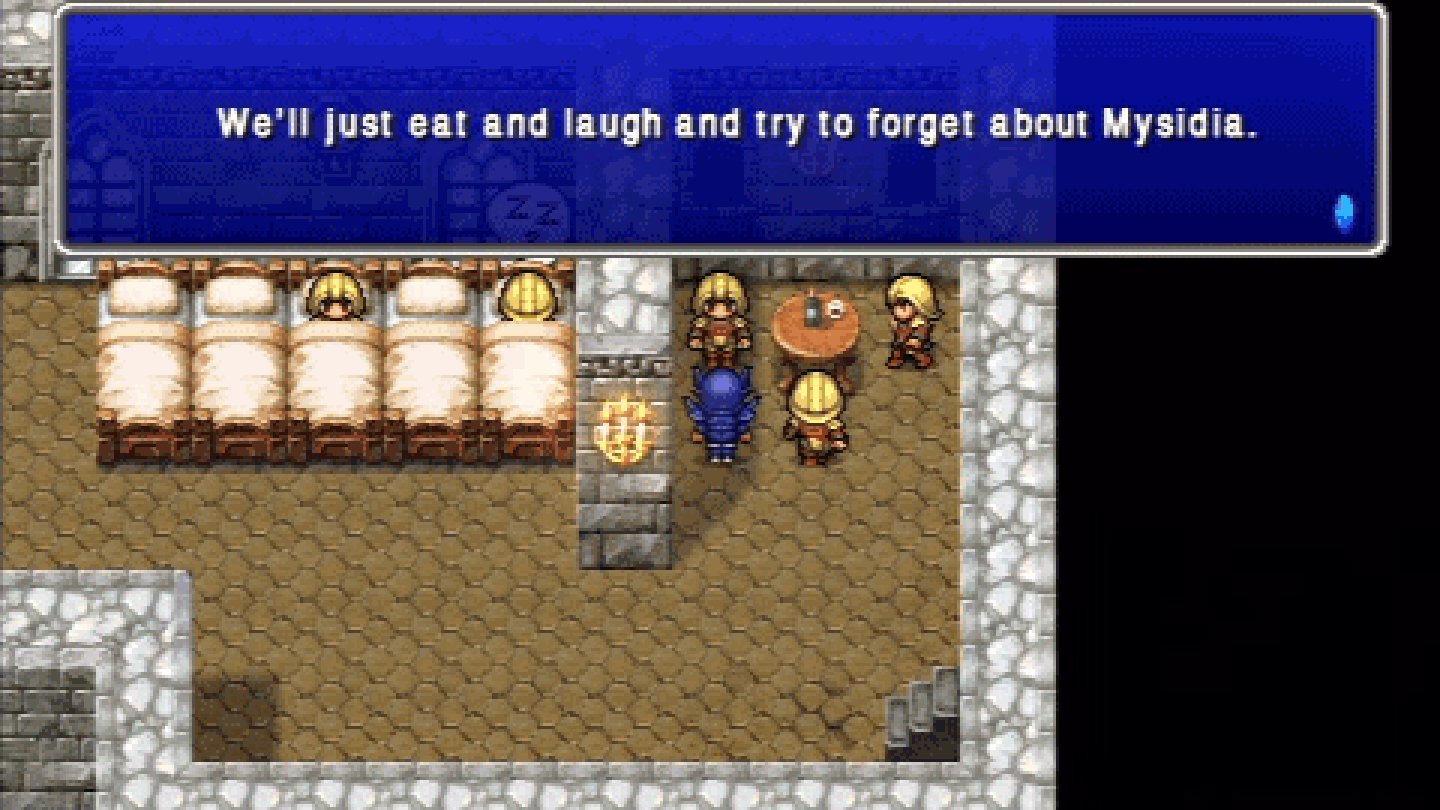
I’m surprised this line has lasted this long – possibly even more than a decade.
Disturbed Soldier
 | 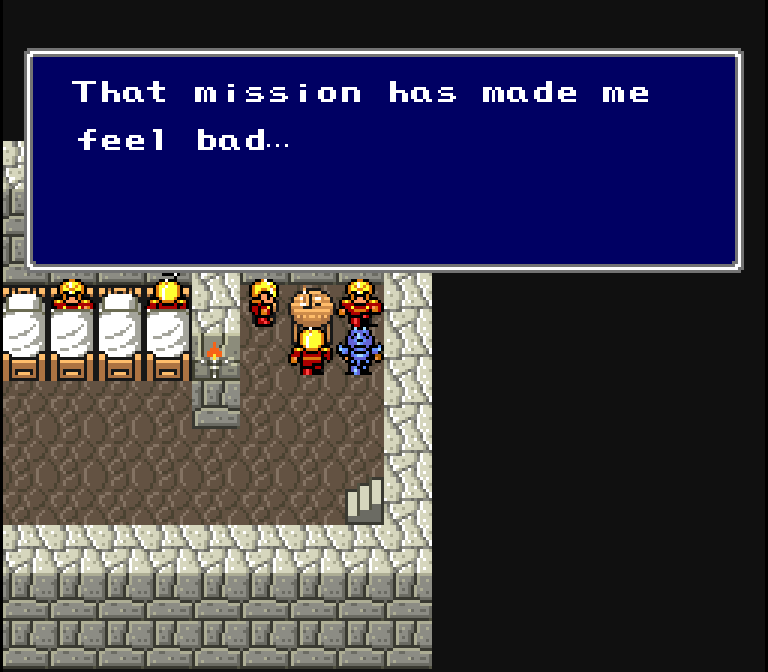 |
| Final Fantasy IV (Super Famicom) | Final Fantasy II (Super NES) |
This other soldier says in English, “That mission has made me feel bad…”
In Japanese, it’s more like, “That mission left such a bad taste in my mouth…”
This isn’t a big deal, but there’s a difference between “feeling bad” and “having a bad taste in your mouth”.
Bedroom Scene
Cecil returns to his room and gets in bed. A cut scene with Rosa begins. Since it’s pretty iconic and important, here’s a look at it all:
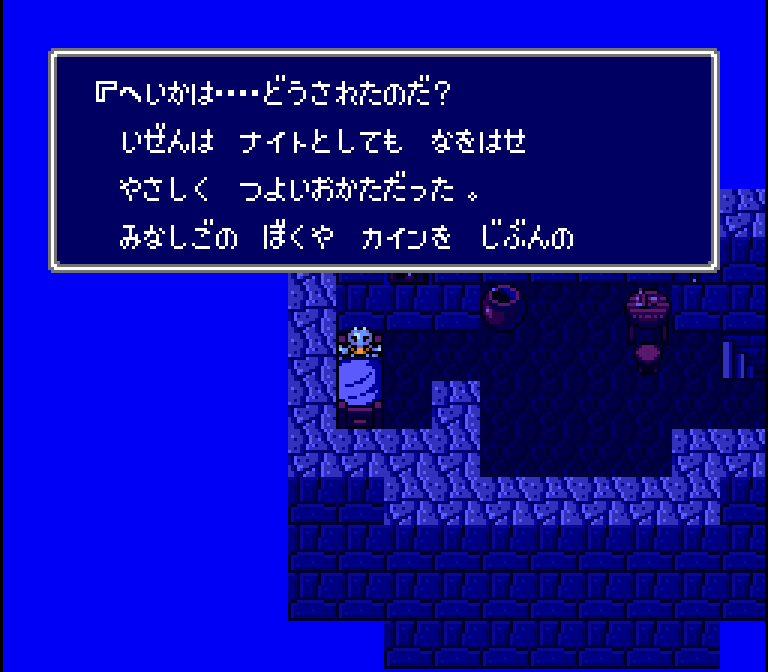 | 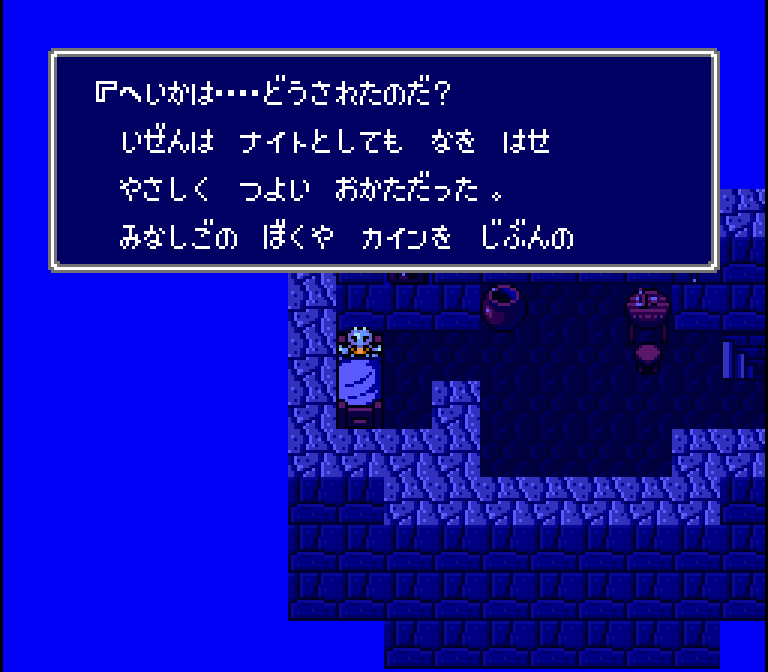 | 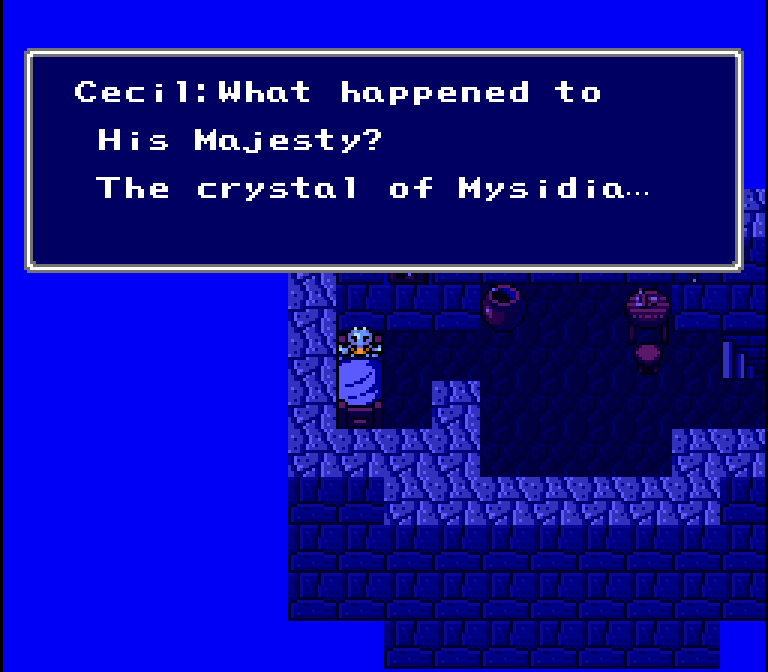 |
| Final Fantasy IV (Super Famicom) | Final Fantasy IV Easy Type (Super Famicom) | Final Fantasy II (Super NES) |
| Japanese Version (basic translation) | English Translation |
| Cecil: What has happened to His Majesty…? | Cecil: What happened to His Majesty? |
| He was once a renowned knight and a kind and strong gentleman. He even raised me, Cain, and other orphans like us like we were his own children. | |
| The Mysidia crystal… It must be something that’s so important to obtain that it means stealing it from unresisting villagers… | The crystal of Mysidia… Did we really have to snatch it from the peace loving people? |
| Orders or not, it’s unpardonable! | Never again! Even if ordered! |
| Rosa: Cecil! | Rosa: Cecil! |
| Rosa: What happened? First you suddenly get sent to Mysidia and now you’re hunting Eidolons… Plus you’ve been acting strangely ever since you returned. | Rosa: What’s wrong? You’re not quite yourself lately. |
| Cecil: It’s nothing… | Cecil: Nothing. |
| Rosa: Then face this way. | Rosa: Then… Please don’t look away. |
| Cecil: In Mysidia, I… I stole the crystal from innocent people! | Cecil: In Mysidia… We had to rob from the innocent people! |
| I’m a Dark Knight on the outside, but my heart is just as dark…! | |
| Rosa: …You aren’t like that. | Rosa: Oh, dear… |
| Cecil: I’m a cowardly Dark Knight who can’t disobey His Majesty… | Cecil: I am just a Dark Knight with no courage to disobey His Majesty. |
| Rosa: Cecil of the Red Wings would never whimper like this! The Cecil I love is… | Rosa: The real Cecil I know would never whimper like this! |
| Rosa: You’re going to Mist tomorrow, right? Should anything happen to you, I’d… | Rosa: You are going to Mist tomorrow, right? If anything should happen to you… |
| Cecil: There’s no need to worry. Cain’ll be with me… | Cecil: Don’t worry. Kain is coming too. |
| Cecil: It’s getting late… You should rest too. | Cecil: It’s late. Go back to your room. |
| Rosa: Be careful…! | Rosa: Take care! |
| Cecil: Thanks, Rosa… But I’m a Dark Knight. You and I aren’t… | Cecil: Thanks, Rosa. Still, I am just a Dark Knight. |
Wow, so many differences, big and little. I really don’t even know where to start, so I’ll just leave it at this. But basically we see that a lot of the character set-up falls apart in the localization.
I also find it funny that the translation says, “Never again! Even if ordered!” and then says he doesn’t have the courage to defy the king. I guess they didn’t catch that.
Heroes’ Walk
After some sleepy time, an epic scene takes place. Cecil and Kain walk from opposite ends of the castle, team up, do some kick-ass “let’s do this thing” type of talk, and then walk out of the castle together:
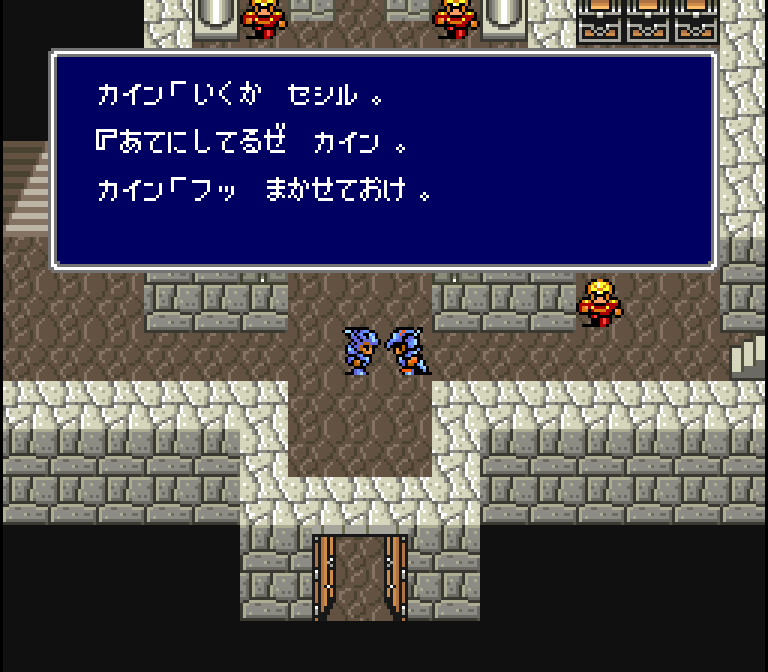 | 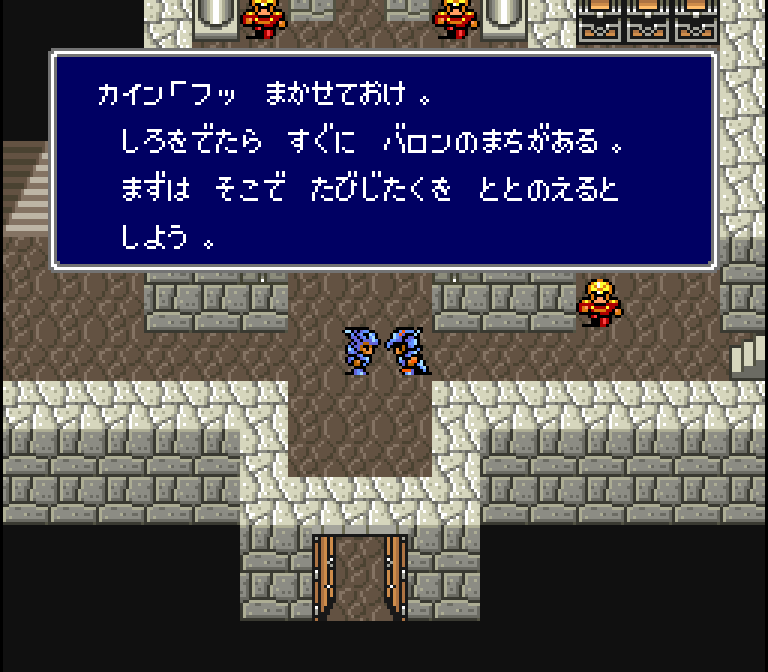 |  |
| Final Fantasy IV (Super Famicom) | Final Fantasy IV Easy Type (Super Famicom) | Final Fantasy II (Super NES) |
In Final Fantasy IV, this is all done really well, and the dialogue is great. I can tell the creators put a lot of thought and heart into this scene.
In Final Fantasy II, their snappy dialogue is muddled with another one of Kain’s wordy tutorial-like blurbs that tells the player what to do next. It breaks the flow in my opinion, but at the time I didn’t think anything of it, of course.
In Final Fantasy IV Easy Type, Kain gives the tutorial-like message too.
For reference, here they all are:
| Final Fantasy IV (basic translation) | Final Fantasy IV Easy Type (basic translation) | Final Fantasy II (Super NES) |
| Cain: Shall we go, Cecil? | Cain: Shall we go, Cecil? | Kain: Let’s go, Cecil. |
| Cecil: I’m counting on you, Cain. | Cecil: I’m counting on you, Cain. | |
| Cain: Heh. Just leave it to me. | Cain: Heh. Just leave it to me. |
It’s not much, but I really do like how the original Final Fantasy IV scene plays out. The “shall we go?” line isn’t the best translation on my part, but it’s literal for reference.
Prologue Narration
Now my favorite song in the game plays while an epic story introduction scrolls on the screen. Here’s a look at the different versions of this text:
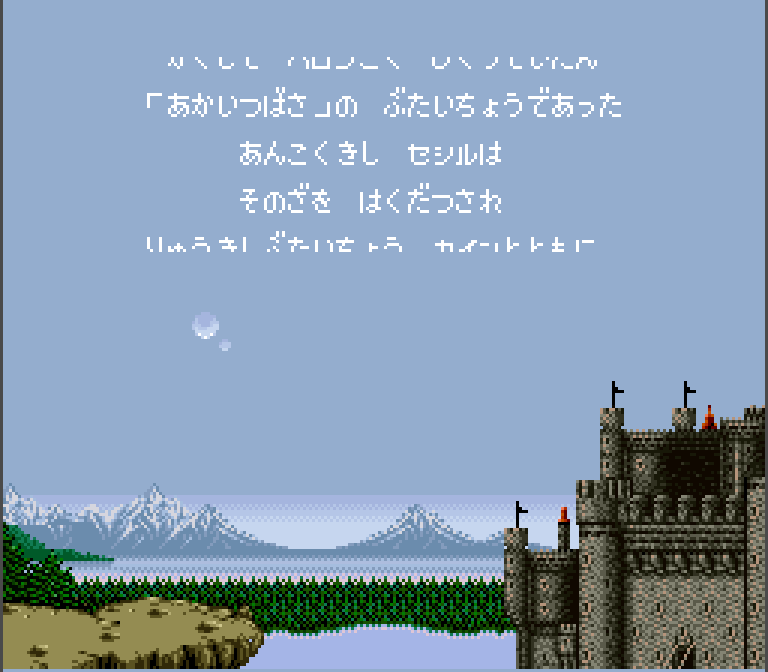 | 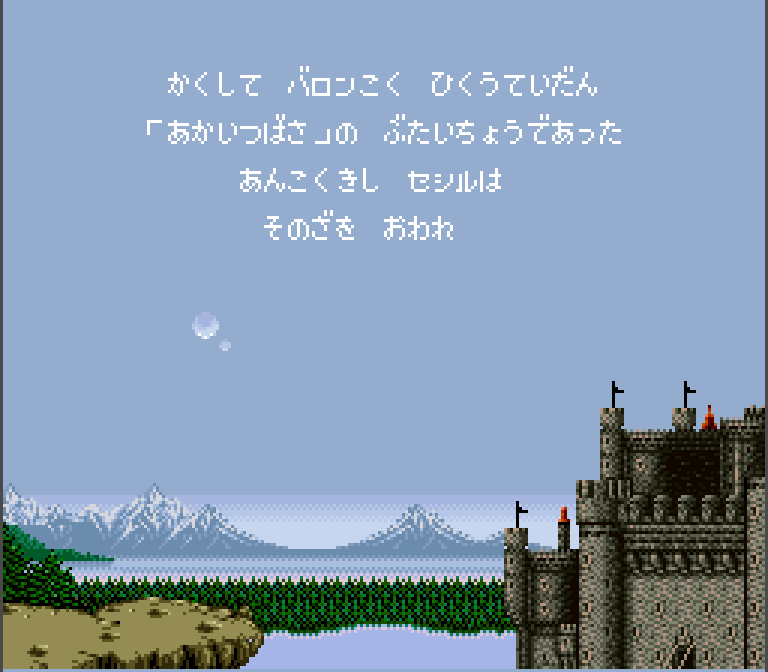 | 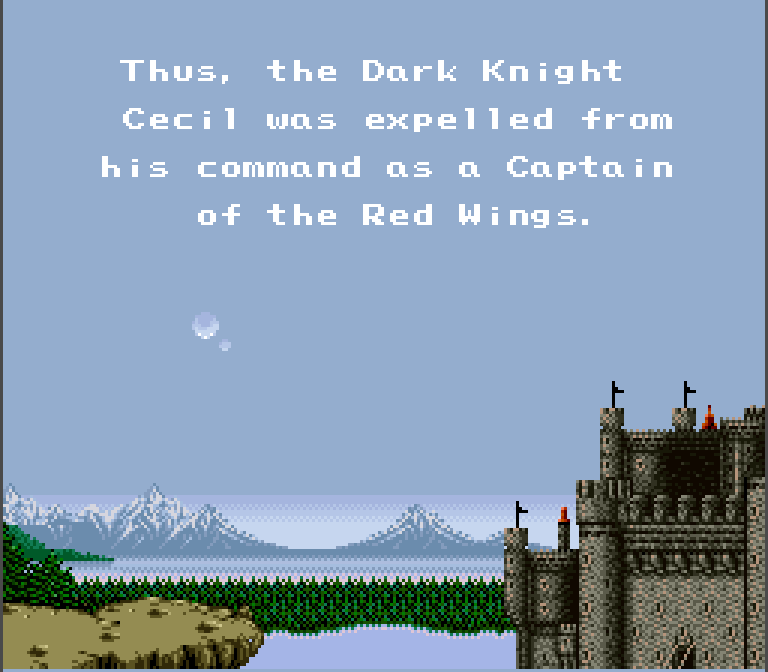 |
| Final Fantasy IV (Super Famicom) | Final Fantasy IV Easy Type (Super Famicom) | Final Fantasy II (Super NES) |
| Japanese Version (basic translation) | English Translation |
| Thus the Dark Knight Cecil, the captain of the Baron Kingdom’s “Red Wings” airship fleet, was stripped of his position. Together with Cain, the captain of the Dragon Knights, he left Baron Castle behind him as he set out for a valley enclosed in thick fog on his way to the remote village of Mist… | Thus, the Dark Knight Cecil was expelled from his command as a Captain of the Red Wings. And he and Dragoon Kain left Baron for the Village Mist in a valley enclosed in deep fog. |
| Airships soaring through the sky were once people’s dreams… But airships’ mobility did more than make those dreams a reality, it even served as a means to satisfy people’s greed and desires. | Airships had been a dream of many people. After the realization of the dream, came greed and ambition. |
| It was through the Red Wings airship fleet that the Baron Kingdom became the most powerful military nation. | Through its fleet of airships, Baron became the most powerful nation. |
| So why did the mighty Baron seek the crystal…? | But why is Baron seeking the crystals? |
| And why have so many monsters begin appearing in broad daylight…? | Why do monsters keep increasing…? |
| The crystal simply continued to silently exude light… | The crystal was shedding its light silently… |
Don’t mind the awkwardness of my basic translation – that’s what happens when you’re overly literal.
Also, the Easy Type version simplified “stripped of” to “driven from/expelled from”.


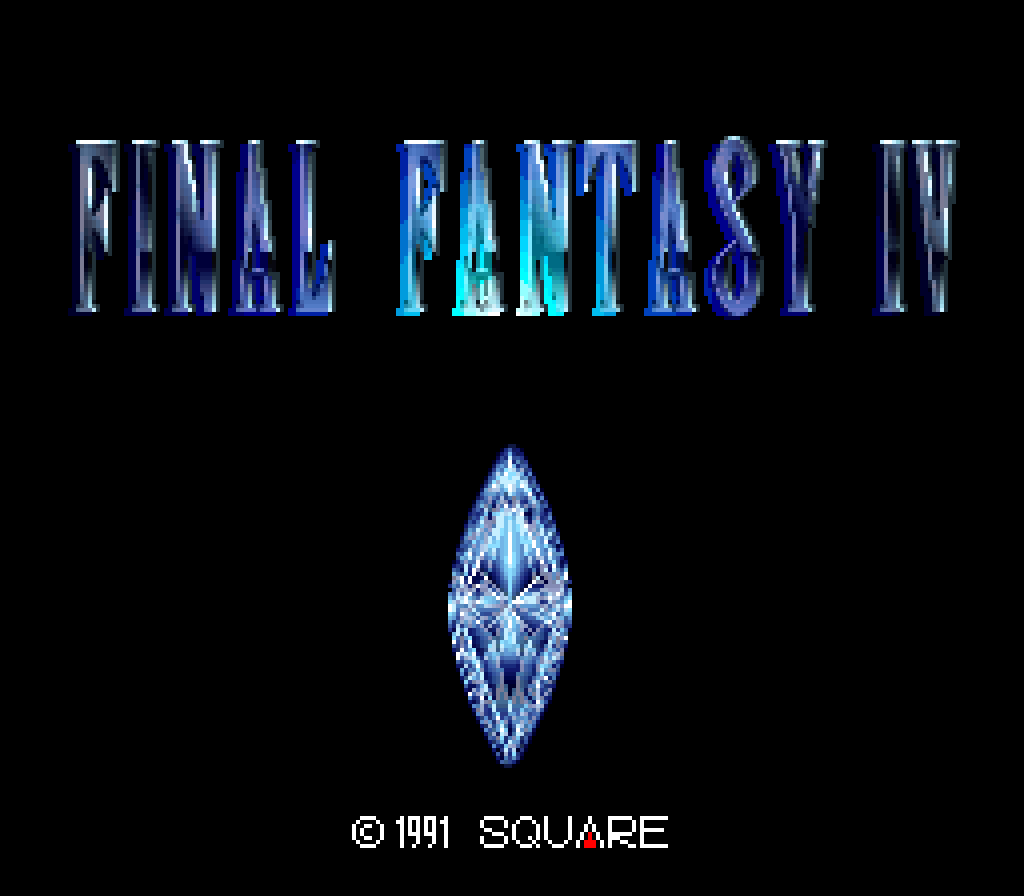
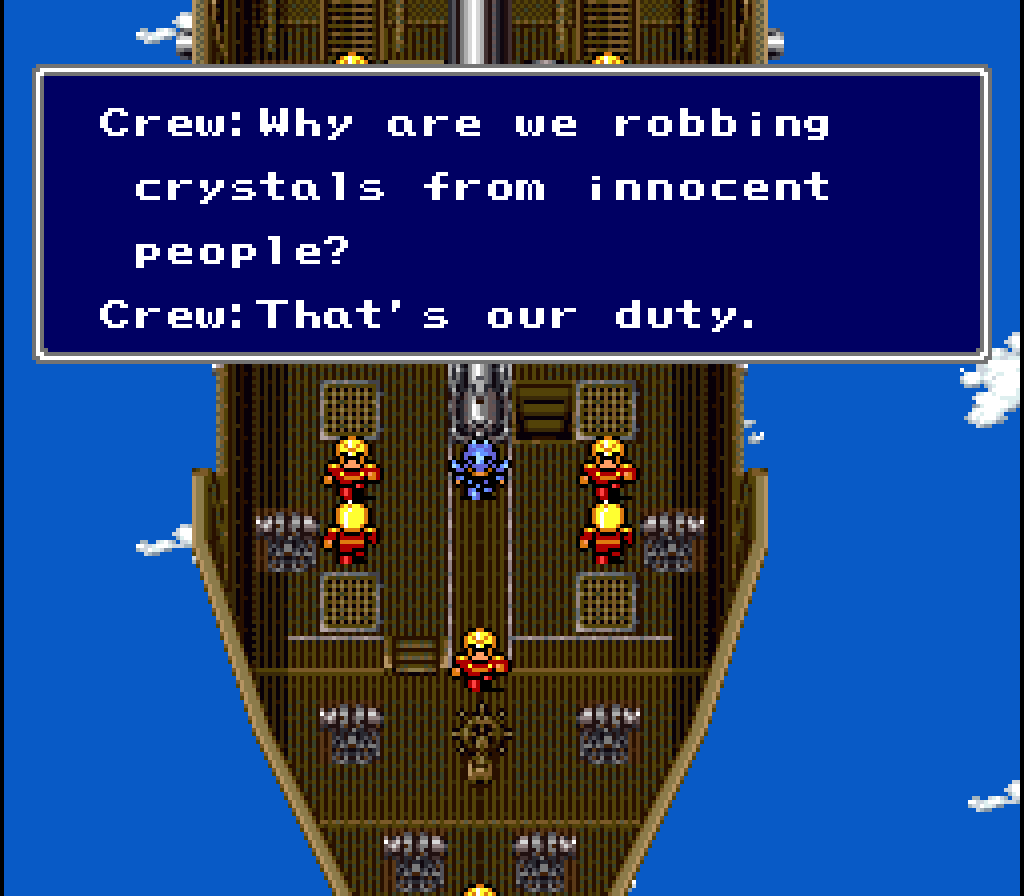
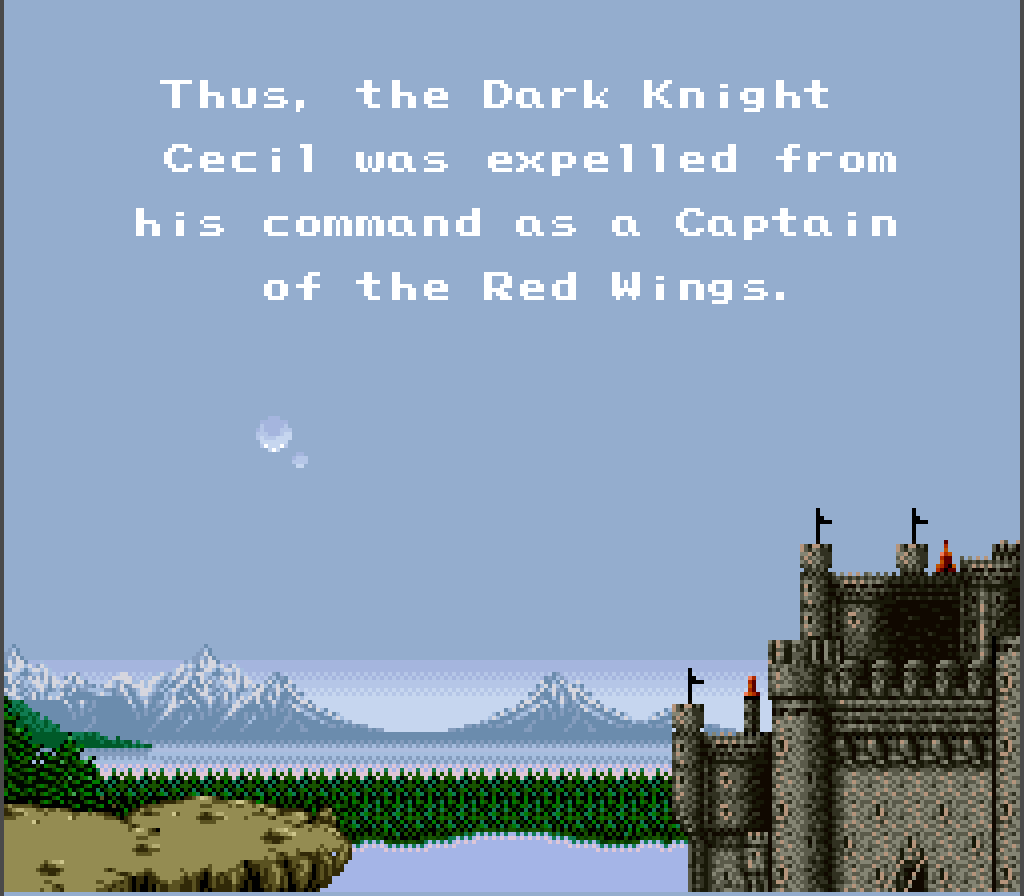
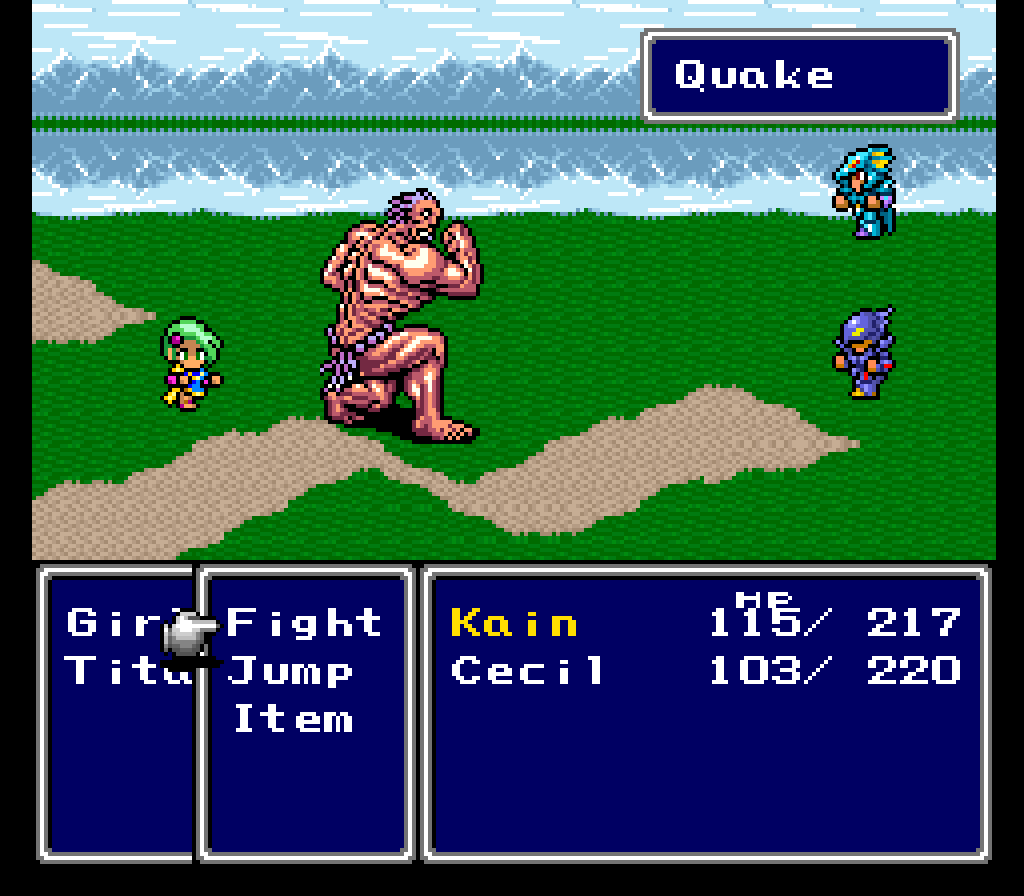
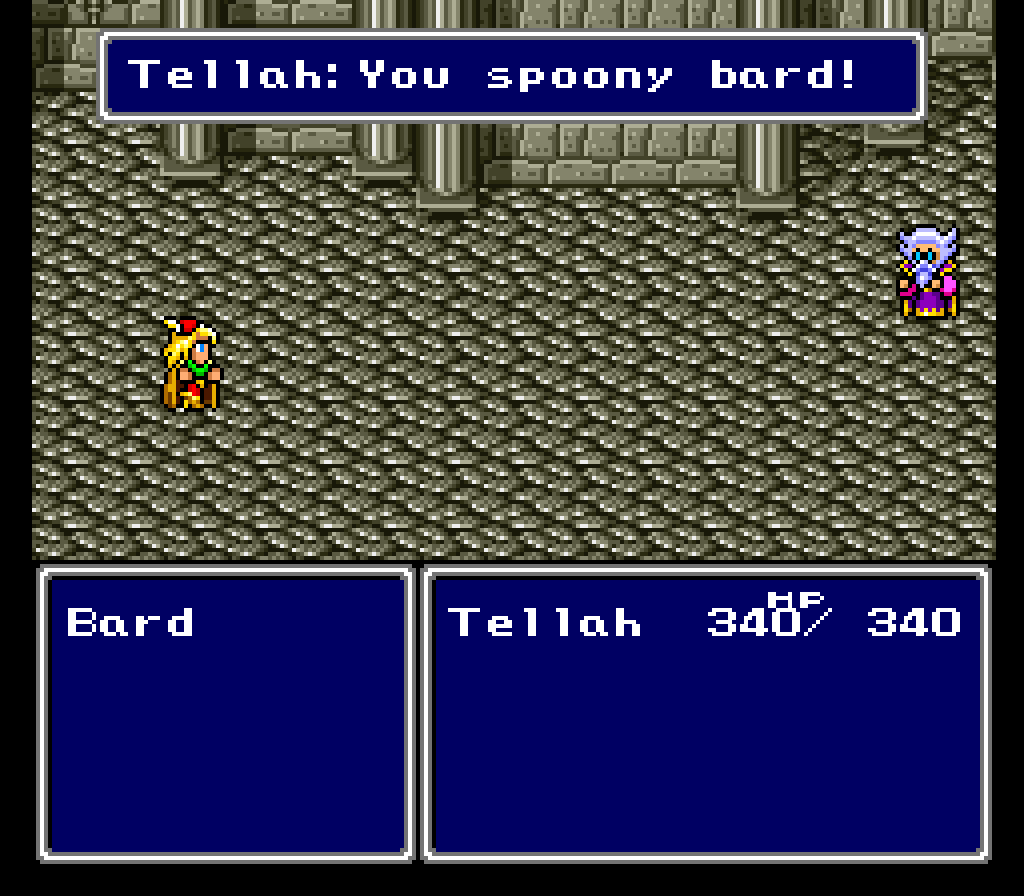
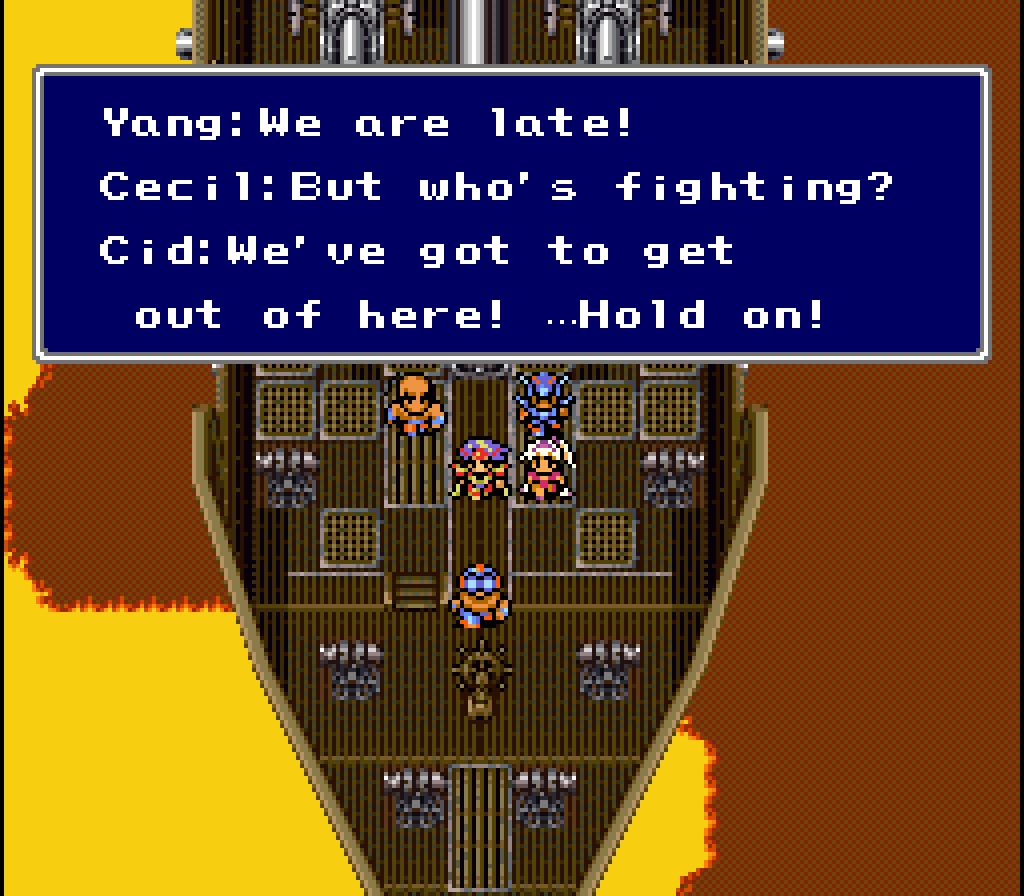
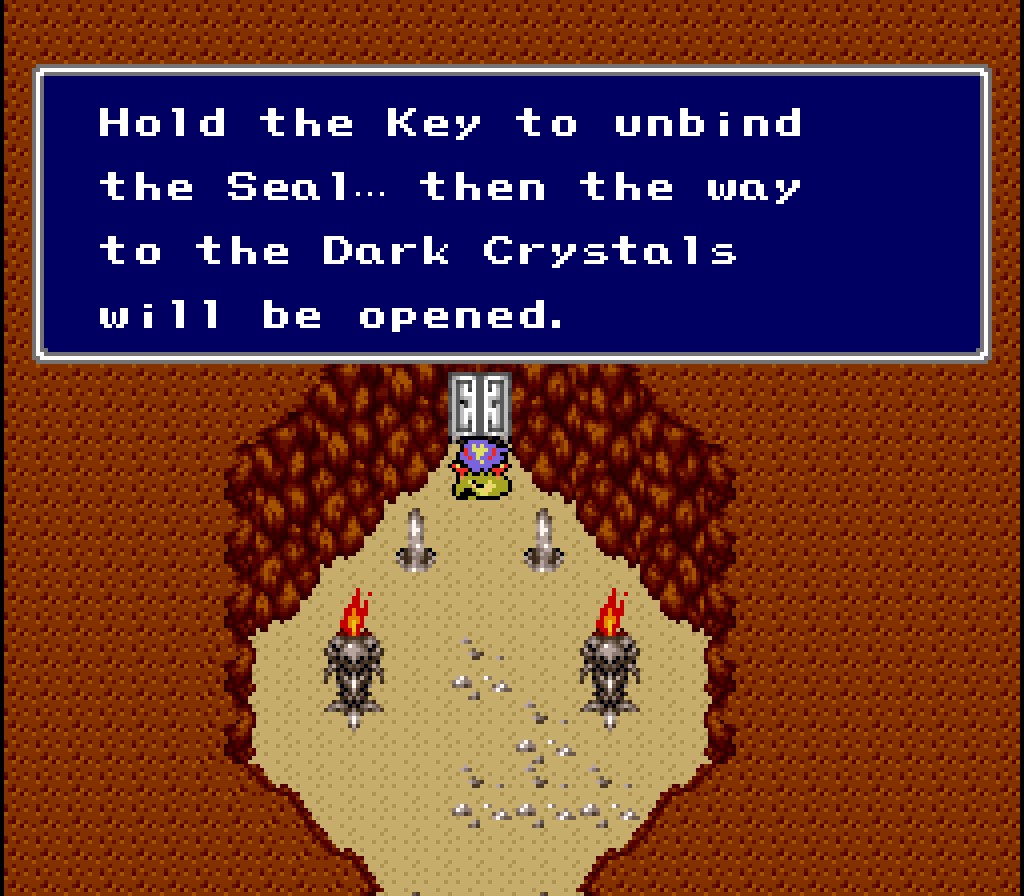
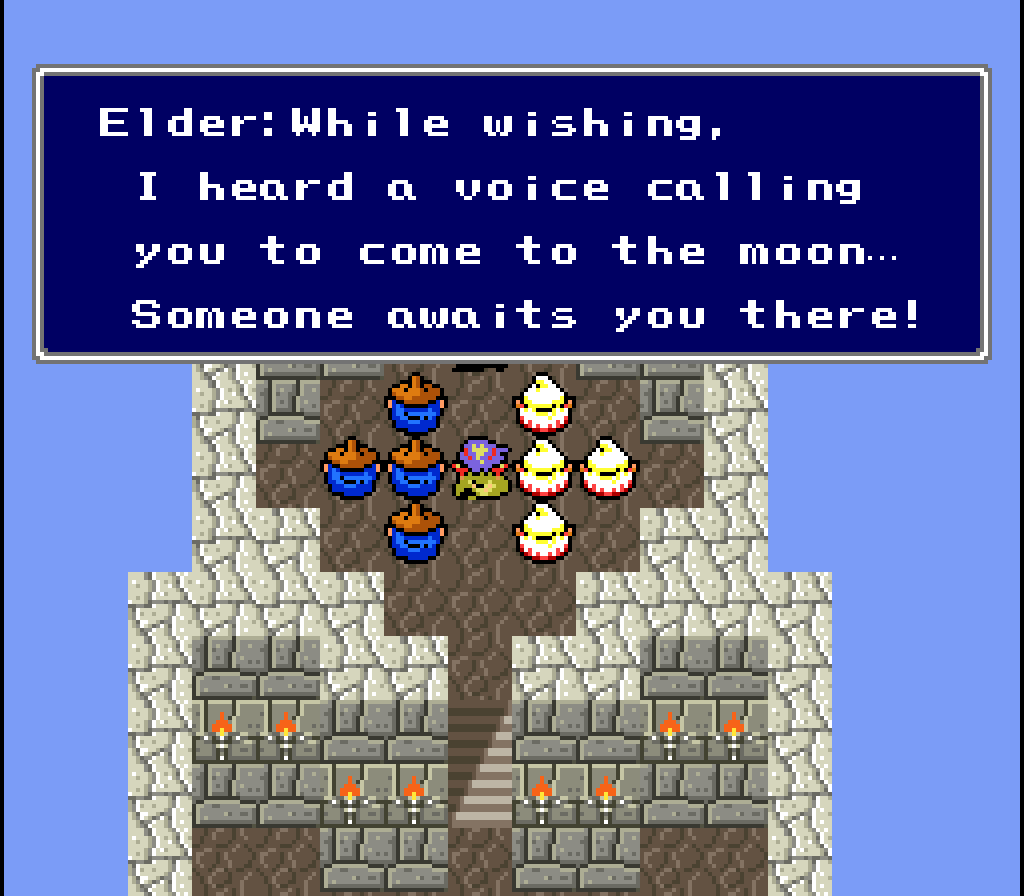
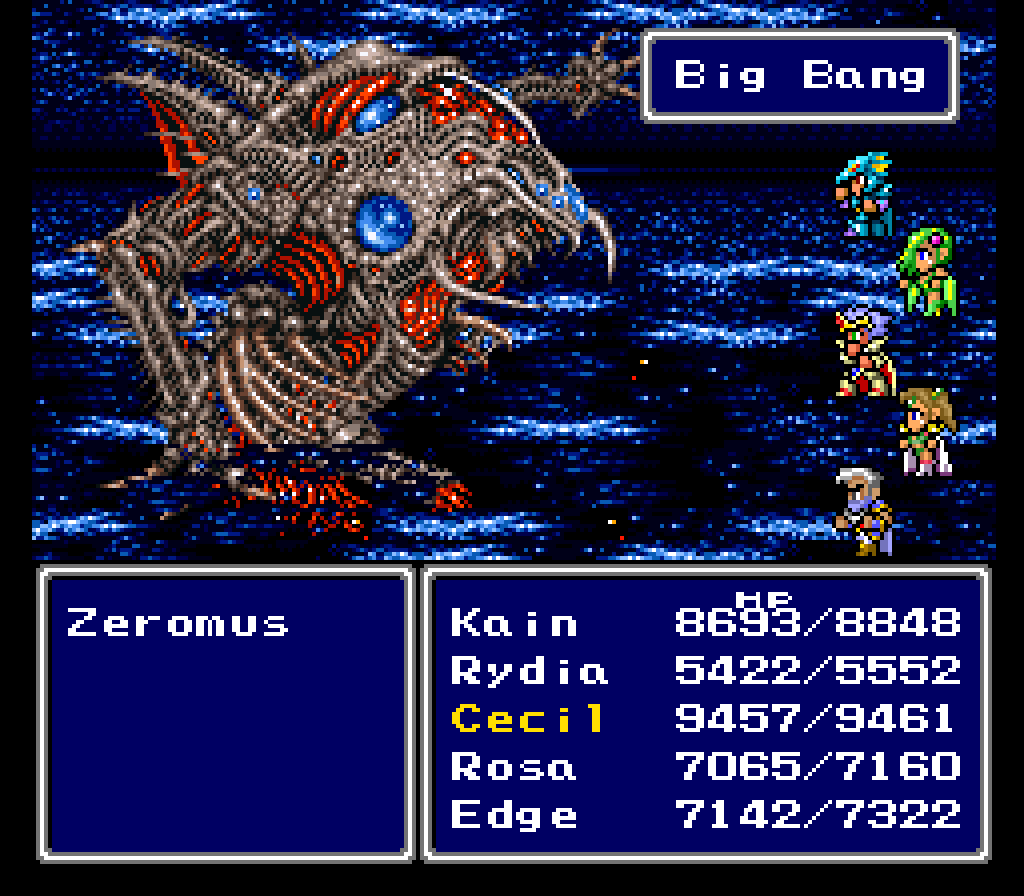
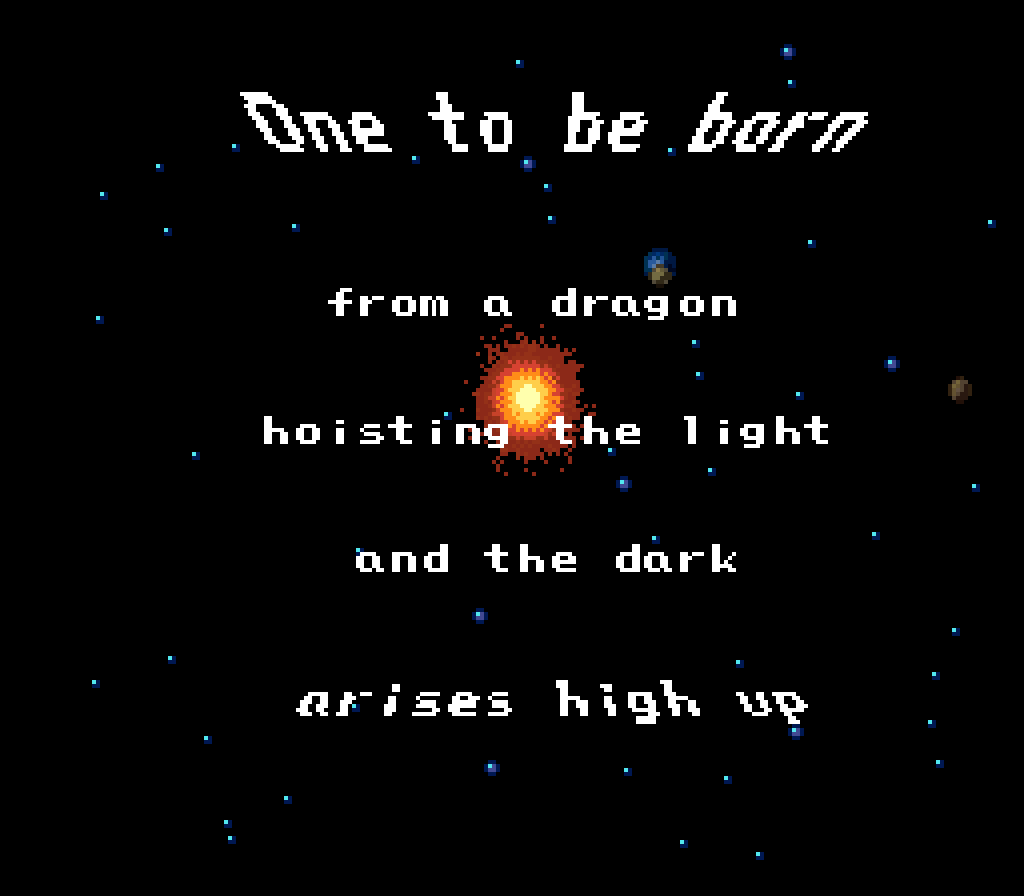
![press start to translate [Final Fantasy IV] press start to translate [Final Fantasy IV]](https://legendsoflocalization.com/wp-content/uploads/2019/08/bbenma.png)
Curiosity strikes: is what’s unusual about the “FloatEyeball” name the タ that’s used? Meaning, and I’m not expert enough to know the proper terms, that the odd part here is that the “a” vowel in the “ai” of “eyeball” is part of the “ta” that ends “float” in this case?
I’m guessing that if “float” gets used in Japanese in that context, it doesn’t usually end in “ta”. My knowledge of Japanese is limited and very rusty, but that seems unlikely to me… it may be a stretch on my part, but is the monster’s name intended as an amalgam of “floater” and “eyeball”?
This happens sometimes in real loanwords — they transcribe the actual pronunciation with the words run together, rather than the spelling with different words. This is just the first thing that comes to mind, but in my home state of Michigan there’s a city called “Ann Arbor”; in Japanese it’s アナーバー, not アンアーバー because the former is what it actually sounds like. (The moraic nasal vs a real ‘n’ sound makes the difference unusually great in this case, but I’ve seen the same thing with other consonants as well.)
It’s possible that they might not have done this if not for the character limit for monster names. Simple visual inspection suggests that the limit is indeed 8 characters.
I got to read this one too. I think VI and IV are my favorite FFs. VII and X are up there too.
幻獣 is translated as “Aeon” in Final Fantasy X.
The translation to 幻獣 is “cryptid”, a real word. They’re unidentified mysterious creature. These are what the lochness monster and Big Foot are called.
Also, the reason they added references to killing to the plundering of Mysidia is to give cause as to why they’re so upset for doing what they’ve done. If it were truly JUST plundering (Japanese only uses 略奪 (plunder/pillage). No verb for killing), then it doesn’t really sound as much of a big a deal, especially, at that time, Baron simply thought of it as just a “jewel” (like that black mage in the Baron dungeon said). Yes, plundering does involve the violent taking of something, but it’s just not as impactful as killing. Yeah, knocking people down and probably beating them while others come and take what’s not theirs is bad, but it proabably didn’t feel as bad as “my heart will soon be as dark as the color of the armor I wear” bad.
…Except that in the silent cutscene, they DID kill. While plunder/pillage is to steal/rob with violence, violence is too vague and can simply mean to deal damage but the victim lives. The Red Wings seemed to literally killed the mages in the Crystal Room. So I argue that killing should be put in the translations to make the impact much greater, especially since Cecil risked it all to question the king about why they had to do all of that just for a “jewel”. Maybe he wouldn’t have done the same if it were really just plundering.
Extremely important correction: There’s an error in the Baigan Blocks section. That’s not Baigan blocking the door, just a regular old member of the royal guard. Remember, Baigan has his own pallette and is a foxy blonde. What an absolute blunder, Tomato.
Oh my gosh, you are right. I will fix it. Then I will return to FFIV Elementary School to get my guards straight someday.
Thank you for all your beautiful work. It’s much appreciated.
I’m rereading over your FF4 notes for like the fourth time I think, and I have to say, every time I do, I just can’t help but think “Bomb Ring was such a dumb name for the item”.
I actually think the change to “Package” in the SNES version is one of the few times a change made in the SNES version is superior. Probably because it’s one of the few changes that’s not actually censorship or just a result of space limitations. Getting the Package and bringing it to Mist genuinely IS shocking playing the game for the first time, realising you’ve unwittingly destroyed this entire town–made even more gut punching when you find the crying child whose mother you inadvertently killed. Then the earth quakes and your friend is gone, after all that abrupt chaos you’re left alone with the child whose mother you just killed. Then you have a trek through the desert to reflect on what Cecil (and you) just did.
The original “Bomb Ring” name just kills the shock aspect and ruins the impact. I’d also argue it just makes Cecil look…stupid? Like not to mean but seriously, what did he think was going to happen when he brought a BOMB to this little town? It’s extra weird for Cecil to do that since he’s just come off Mysidia and is really struggling with what happened there….but then he brings the BOMB Ring to Mist no questions asked? Seriously? As much as I love FF4 I’ve always thought that whole thing was really goofy, I wish the later translations kept the original Package translation.
The 3D remake translators evidently agreed to some extent since they changed the name as well, which I’m always thankful for.
I actually agree that calling it a Package adds to the surprise too. As a translator, I can’t help but wonder what the original writer was thinking, but I also feel like there’s another aspect to the Bomb Ring name that I’m just not seeing. It’s like I’m not fully connecting some dots somehow, but maybe it’d have been obvious to the devs or fans of the games before FFIV.